A look at President Trump’s administration and the rest of Washington:
- Trump wants to boost defense spending by $54 billion, a 10% jump
- Justice Department shifts course in controversial Texas voting rights case
- Trump says “nobody knew healthcare could be this complicated.”
- Trump says Hollywood‘s obsession with him led to Oscar snafu
- Trump’s nominee for Navy secretary withdraws over financial conflicts
- Democrats pick Tom Perez to lead them from the political wilderness
- Share via
As the healthcare vote looms, Trump sees opposition from conservatives, both on Capitol Hill and in the media
It’s a really important vote in President Trump’s fledgling first term.
Will House Republicans pass a bill to repeal and replace the Affordable Care Act — a promise from Trump on the campaign trail — or reject it? (House Speaker Paul D. Ryan rushed to the White House on Friday morning for a last-minute meeting with Trump as both attempted to corral enough votes.)
Trump spent much of the week trying to win support from members of the Freedom Caucus, among the most conservative lawmakers, some of whom are holdouts because they believe the bill does not go far enough.
“After seven horrible years of ObamaCare (skyrocketing premiums & deductibles, bad healthcare), this is finally your chance for a great plan!” Trump tweeted Friday.
But even some in conservative media aren’t all that thrilled about the bill.
Here are some of Friday’s headlines:
Polls: Ryancare even more unpopular than Obamacare and Hillarycare (Breitbart)
So, it’s been clear in recent weeks that the right-wing website Breitbart does not like the new healthcare proposal.
The news site has dubbed the current bill Obamacare-lite or Ryancare — an homage of sorts to Ryan, who helped craft the legislation — and argued it does not go far enough in its overhaul.
Most conservatives want to repeal the Affordable Care Act, nicknamed Obamacare, they just differ on what the replacement should look like. For example, some on the far right want to see so-called “essential health benefits,” such as maternity and newborn care, stripped from the bill.)
This piece highlights several of the dismal polls the legislation has received.
Among them: A recent Fox News survey that showed 54% oppose the bill, compared with 34% who support it. The article also references an analysis of polling and data by FiveThirtyEight.com, which shows the GOP legislation is more unpopular than Obamacare and President Bill Clinton’s healthcare reform bill were when they were first introduced.
A modest immigration proposal (Weekly Standard)
Trump’s recent immigration orders have left many immigrants on edge.
Through social media and pop-up legal clinics, immigrant rights groups have doled out around-the-clock assistance, as families fear being separated.
In this piece, Irwin Stelzer notes that “at some point, our border will be secure, resistance to deporting felons will collapse, and we will have accepted the fact that Dreamers will be allowed to stay in this country, probably on a path to citizenship.”
He lays out his views of immigration reform, citing, among other things, setting an annual immigration limit and adopting “a system that has the effect of enriching our citizens by filling that annual quota with immigrants who are likely to increase the well-being of the existing citizenry.”
Jeff Sessions is Rip Van Winkle on drug policy (American Conservative)
It’s clear from polls that most Republicans oppose marijuana legalization, while Democrats support it.
However, libertarian-leaning Republicans often tend to support legalization.
This piece highlights Atty. Gen. Jeff Sessions’ recent comments in opposition to states legalizing pot.
“The attorney general regurgitates simplistic clichés right out of the 1970s and 1980s about marijuana use. ‘I don’t think America is going to be a better place when people of all ages, and particularly young people, are smoking pot,’ Sessions told reporters on February 26,” the author, Ted Galen Carpenter, writes.
He adds, “Such comments confirm that critics may be right when they label him a ‘drug war dinosaur.’ He seems either oblivious or scornful about the trend in public opinion regarding marijuana.”
- Share via
FCC Chairman Pai wants to halt Internet privacy rules before they begin taking effect this week
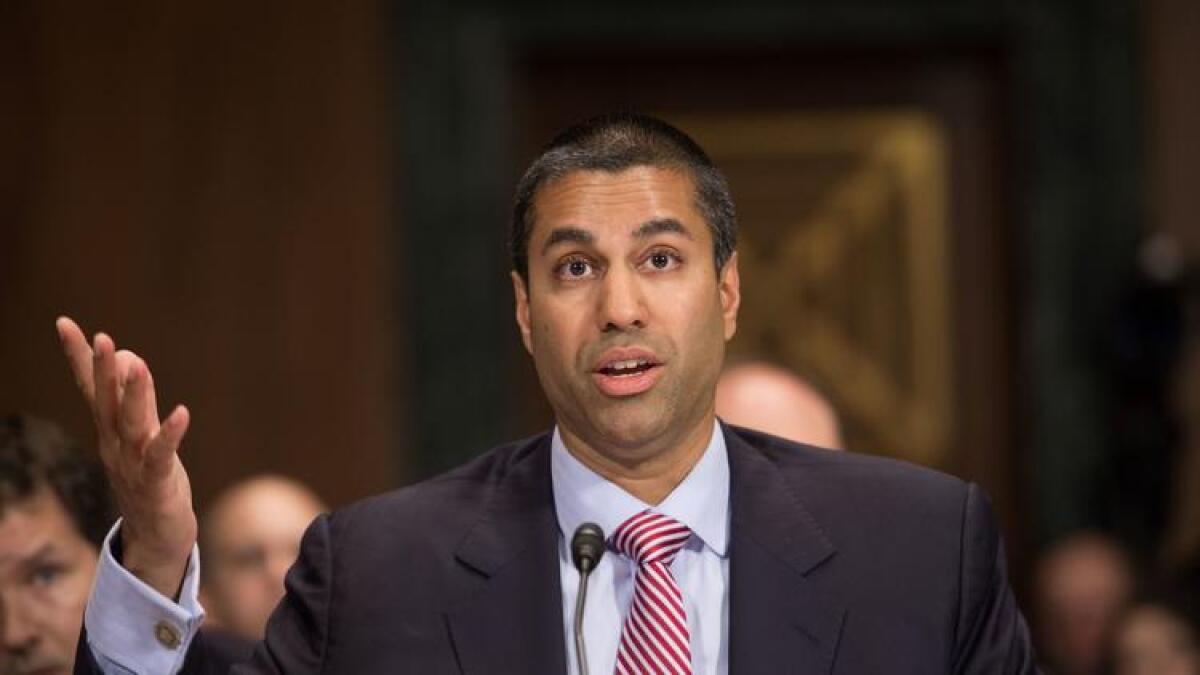
The nation’s new top telecommunications regulator wants to halt tough Internet privacy rules before they begin taking effect this week, arguing they would unfairly impose tougher requirements on broadband providers than on websites and social networks.
Privacy advocates and a key Senate Democrat vowed Monday to fight the move as well as a separate effort in Congress to overturn the regulations, which were approved in October on a party-line vote by the Federal Communications Commission when it was controlled by Democrats under President Obama.
Following President Trump’s inauguration, control of the commission passed to Republicans and Ajit Pai took over as chairman.
“All actors in the online space should be subject to the same rules, and the federal government shouldn’t favor one set of companies over another,” a spokesman for Pai said Friday.
- Share via
Trump says Hollywood’s obsession with him led to best picture Oscar gaffe

President Trump is often loath to accept responsibility when things go wrong, but in the case of Sunday’s Oscars broadcast, he made an exception.
As he explained it Monday, it was Hollywood’s obsession with attacking him that contributed to the botched best picture announcement, calling the embarrassing episode “sad,” of course.
Accounting firm PricewaterhouseCoopers has apologized for the mix-up that led Warren Beatty and Faye Dunaway to announce “La La Land” as the winner of the top Academy Award prize, instead of “Moonlight.”
But in Trump’s eyes, the blame falls more broadly on an entertainment industry so preoccupied with politics that they “didn’t get the act together,” he told Breitbart News.
“It took away from the glamour of the Oscars,” Trump told a reporter from the website, which was once led by his chief White House strategist, Stephen K. Bannon.
“It didn’t feel like a very glamorous evening. I’ve been to the Oscars. There was something very special missing, and then to end that way was sad,” he added.
The ceremony did contain a number of slights at Trump during its telecast, some more subtle than others. Host Jimmy Kimmel openly at one point begged the president to weigh in by tweeting at him.
Trump spent part of Sunday night hosting a black-tie dinner at the White House honoring the nation’s governors, who were visiting Washington for their annual winter meeting. But it appears from excerpts of the Breitbart interview that he may have spent at least part of the evening watching.
- Share via
Justice Department shifts course in closely watched Texas voter ID case
The Trump administration has scaled back its assault on a strict Texas voter identification law that federal courts have ruled discriminated against minorities, portending a shift in how the Justice Department plans to pursue allegations of voter suppression.
The government revealed its decision in court papers filed in federal court Monday, dealing a blow to civil rights advocates who have relied on federal support to help them knock down the controversial Texas statute.
“It’s a very concerning signal to American voters about the Department of Justice’s commitment to enforcing the Voting Rights Act,” said Danielle Lang, deputy director of the voting rights unit of the Campaign Legal Center, which is suing Texas in the case.
The administration’s partial retreat in the dispute highlights how Atty. Gen. Jeff Sessions, a conservative Republican who has championed voter identification measures, is expected to handle such cases. The Obama administration had joined civil rights groups in aggressively challenging the Texas law and other such measures around the country.
At issue in the case was how the Justice Department would proceed in a federal lawsuit that alleged the Texas legislature discriminated against minority voters when it enacted the strict voter identification law in 2011.
Known as SB 14, the measure requires voters to present a specific form of government-issued photo identification - such as a driver’s license, military ID card, U.S. passport or citizenship certificate - to be permitted to cast a ballot.
The Obama administration and civil rights groups argued the state pushed the law, in part, to suppress the power of the state’s minority voters, who frequently don’t drive or have a passport.
State officials and lawmakers countered that the law was aimed at preventing voter fraud, though there is scant evidence that the problem exists.
The law was challenged in court by civil rights groups and the Justice Department under provisions of the 1965 Voting Rights Act, which was intended to help overcome legal barriers erected at the local and state level to keep African-Americans from the polls.
Last July, a federal appeals court ruled that the Texas law had a discriminatory impact on minority voters. It told U.S. District Judge Nelva Gonzales Ramos to craft a temporary remedy in time for the November elections.
Ramos subsequently ordered Texas to permit voters to present other forms of documentation to verify their identities. The judge’s order is expected to remain in force until she imposes a permanent remedy or Texas addresses the judges’ concerns.
According to the court papers filed Monday, the Justice Department will continue to work with civil rights groups to address those issues but will seek to withdraw from another important aspect of the suit.
In the same decision that found the Texas law had a discriminatory impact, the appeals court reversed Ramos’ finding that Texas legislators had intended to harm minority voters.
It ordered Ramos to reconsider the evidence of that finding.
If the judge determines discriminatory intent in crafting the voter ID requirements, she could throw out the entire law. Civil rights groups will continue to press that claim.
In its court filing, the Justice Department asked Ramos to permit it to withdraw its claim that Texas acted with intent, arguing that it is best to give the Texas legislature time to address the matter.
With the loss of their key ally in court, civil rights groups will argue on their own in an effort to prove that Texas acted with a discriminatory purpose in passing the law. A hearing is scheduled for Tuesday.
Voting advocates complained that the Trump administration was backing away from a key safeguard of voting rights.
The Justice Department decision “defies rationality and stands diametrically opposed to positions they have taken at every stage of this litigation,” Kristen Clarke, president of the Lawyers’ Committee for Civil Rights Under Law, said in a statement. “This reversal of position was taken despite years of work and effort that the government has invested in fighting the Texas Voter ID law, one of the most discriminatory voting restriction of its kind.”
- Share via
House Intelligence Chair Devin Nunes warns against ‘witch hunt’ over Trump-Russia ties
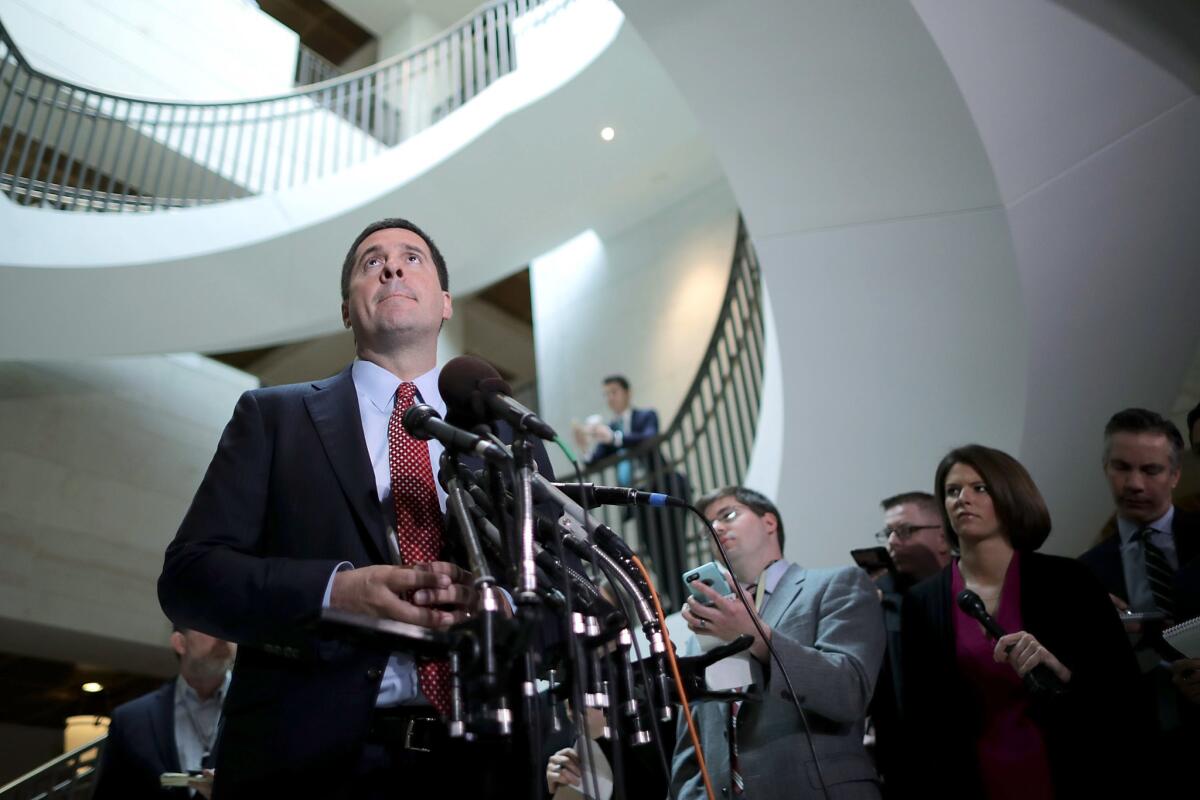
House Intelligence Committee Chairman Rep. Devin Nunes said on Monday he has seen no evidence from the intelligence community that there was contact between Russia and the Trump campaign.
“I want to be very careful, we can’t just go on a witch hunt against Americans because they appear in a news story,” said Nunes (R-Tulare). “We still don’t have any evidence of them talking to Russia.”
He said the committee has been briefed on the “highlights” of what the intelligence community has found, but is still collecting evidence.
The committee’s ranking Democrat, Adam B. Schiff (D-Burbank), quickly responded, saying the committee’s investigation is in its “infancy” and it’s too soon to reach conclusions about the evidence.
“We haven’t obtained any of the evidence yet, so it’s premature for us to be saying we’ve reached any conclusion about the issue of collusion,” Schiff said. “The most that we’ve had are private conversations, the chair and I with intelligence officials. That’s not a substitute for an investigation.”
The House and Senate Select Intelligence Committees are conducting separate investigations into Russia’s reported attempts to influence voters in 2016 in an effort to curtail Hillary Clinton’s chances and boost Donald Trump’s. A leaked U.S. intelligence report on the attempts did not look at whether the effort succeeded.
The House committee has expanded a previous ongoing investigation of Russia cyberhacking to include a look at efforts to interfere in the 2016 election, Nunes told reporters Monday. Though it is still in its early stages — the leaders of the committee are still discussing the investigation’s scope — Nunes said he expects the findings to be made public.
Schiff and Nunes spoke separately to reporters Monday. Schiff said the two agreed privately that they would jointly address reporters about the investigation going forward.
Nunes, who served as a member of Trump’s transition team, said he continues to be concerned about leaks of classified and sensitive information from the White House and intelligence communities. The leaks — one of which resulted in a report about the FBI investigating Trump campaign officials — will be part of the committee’s investigation.
“A government can’t function with massive leaks at the highest level,” Nunes said.
- Share via
Appeals court denies Justice Department request to put appeal of travel ban on hold
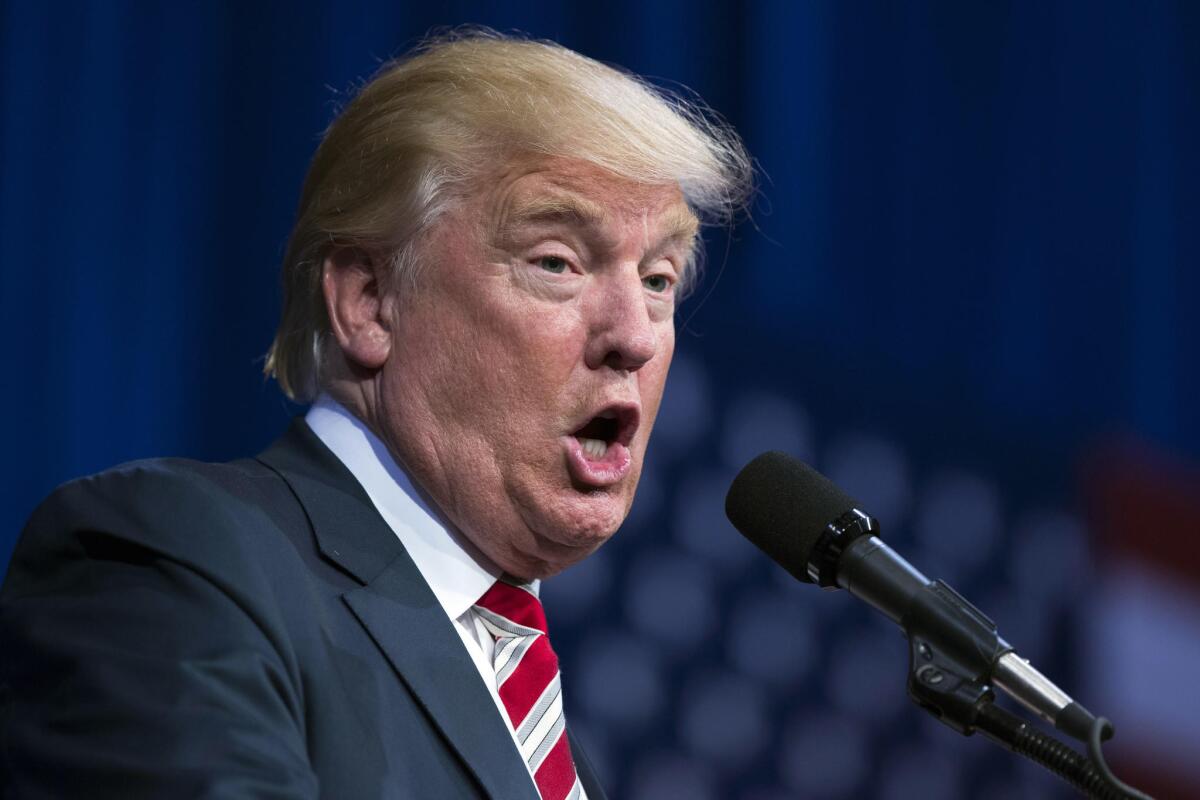
The 9th U.S. Circuit Court of Appeals has denied the
Justice Department’s request to pause proceedings in an appeal of President Trump’s travel ban.
The court in a filing Monday said its schedule for the government’s appeal of a lower court’s halt on the travel ban will proceed, with the first brief due to the appeals court on March 10.
In early February, the Justice Department appealed a Seattle-based federal district judge’s order blocking enforcement of Trump’s executive action. which established a series of immigration and refugee restrictions aimed at preventing potential terrorists from entering the country.
Last week, government lawyers asked the appeals court to stop proceedings in the case because the president planned to issue a new executive order and rescind the original one.
A three-judge panel of the court previously denied a request from the government to reverse a nationwide stay on the travel ban. The same panel on Monday ruled that the appeal will proceed.
Trump has said he will sign a new executive order “tailored” to deal with court decisions that have largely gone against him. On Monday, White House Press Secretary Sean Spicer said he expected the order to be issued mid-week.
Spicer has said Trump wants to fight for the current order while also issuing a new one, but the Justice Department has said in multiple court filings that the the current order will be undone after a new one is issued.
The states of Washington and Minnesota, which brought the case in Seattle now under review, have pushed for courts to move forward on a review of the constitutional issues.
- Share via
‘No random ICE stops on streets of America,’ Homeland Security chief tells governor
President Trump received some unsolicited advice at dinner with the nation’s governors when Virginia Gov. Terry McAuliffe told him he needs to do a better job explaining his policies regarding deportations.
McAuliffe, a Democrat and chairman of the National Governor’s Assn., told the president that there has been a “chilling effect going on” as businesses stay away from his state and as immigrants fear being rounded up.
“If they’re not going to be deported, we need to hear that from the president,” McAuliffe said, recounting his conversation from the governors’ Sunday night dinner with Trump.
“What I told the president is these actions are hurting us.”
McAuliffe, a longtime ally of Hillary Clinton, said Trump agreed in large part.
McAuliffe also met privately with Homeland Security Secretary John F. Kelly, and said the secretary assured him during an hourlong talk that Trump’s enforcement actions were only targeting criminals -- despite widespread reports of otherwise law-abiding immigrants being detained for being in the U.S. illegally.
“He assured me there will be no random ICE stops on the streets of the United States of America,” McAuliffe said, referring to the raids being conducted by Immigration and Customs Enforcement officers.
If that’s the case, McAuliffe said, Trump’s policy does not sound much different than the operations under former President Obama, whose administration deported more immigrants than its predecessors.
Obama, however, explicitly put a priority on deportations of criminals, a distinction the Trump administration has done away with as part of the president’s executive action.
“My advice to him was he needs to let the American public know what they’re doing,” McAuliffe said.
- Share via
Trump: ‘I haven’t called Russia in 10 years’
President Trump rejected calls for an independent investigation of his ties to Russia, telling a group of business leaders Monday that he hasn’t called Russia in a decade.
At the start of a White House meeting with healthcare executives, a reporter asked Trump whether a special prosecutor should be assigned to investigate allegations of Russian meddling during the election.
In response, Trump mouthed the word “no” to the executives. As reporters were led out of the room, Trump said: “I haven’t called Russia in 10 years.”
Democratic lawmakers have ramped up their calls for additional investigations into allegations that Trump allies had been in contact with Russian officials during the election and inappropriately discussed U.S. sanctions against the Moscow regime during the transition.
White House officials have denied reports that Trump associates were frequently in touch with senior Russian intelligence officials during the election.
U.S. intelligence agencies concluded last year that Russian leader Vladimir Putin had authorized an operation to damage Hillary Clinton’s campaign and tilt the 2016 election in Trump’s favor.
- Share via
Trump: ‘Nobody knew that healthcare could be so complicated’
President Trump promised the nation’s governors Monday that his yet-to-be-revealed replacement plan for the Affordable Care Act would give states greater flexibility and thanked some Republicans in the room who advised him on healthcare.
“It’s an unbelievably complex subject,” he said. “Nobody knew that healthcare could be so complicated.”
The remark likely surprised state leaders; spending on Medicaid alone was the second-biggest driver of increased state general fund spending, according to the 2016 Fiscal Survey of States conducted by the National Assn. of State Budget Officers.
And it was just eight years ago that Washington dove head-first into a raging debate over healthcare reform under President Obama, which simmered long after his signature health law was enacted.
But the finer points of healthcare policy are likely new to Trump, who is immersed in discussions with Republican leaders and his senior staff on that and other subjects ahead of his high-profile address Tuesday to a joint session of Congress.
Trump offered no hint as to the details. Republicans have vowed to repeal and replace Obamacare, but their effort has stalled as they debate how to do so and await word from the White House on what Trump wants to do.
The president seemed keenly aware of the political ramifications of whatever steps he takes.
“As soon as we touch it, if we do the most minute thing, just a tiny little change, what’s going to happen? They’re going to say it’s the Republicans’ problem,” Trump said after telling the governors the easiest thing for him to do would be nothing, and, in his view, watch Obamacare collapse.
“But we have to do what’s right because Obamacare is a failed disaster.”
- Share via
Trump wants to add $54 billion to defense budget while slashing domestic spending and foreign aid
President Trump is proposing a massive increase in defense spending of $54 billion while cutting domestic spending and foreign aid by the same amount, the White House said Monday.
Trump’s spending blueprint previewed a major address that he will give Tuesday night to a joint session of Congress, laying out his vision for what he called a “public safety and national security budget” with a nearly 10% increase in defense spending.
“We never win a war. We never win. And we don’t fight to win. We don’t fight to win,” Trump said Monday in remarks to the nation’s governors. “So we either got to win or don’t fight it at all.”
Trump noted that the U.S. has spent nearly $6 trillion on fighting wars since the Sept. 11 attacks but said that cutting military spending was not the answer.
Instead, the increase he is proposing would be offset by cuts to unspecified domestic programs and to foreign aid, which would in turn be made up for in part by demanding that other countries pay more for security alliances that have historically been underwritten by the U.S.
“This budget expects the rest of the world to step up in some of the programs that this country has been so generous in funding in the past,” an official from the Office of Management and Budget said, demanding anonymity to discuss the president’s spending plans.
Foreign aid makes up about 1% of the budget.
“This budget speaks for itself,” the official said. “I don’t think this budget has anything to do other than putting Americans first.”
Trump’s call for deep cuts to spending at home is likely to set up major battles on Capitol Hill, where Democrats and even House Republicans will likely be reluctant to pass a spending bill that includes such major reductions in programs for their constituents.
- Share via
Trump says businesses can’t borrow because of Dodd-Frank. The numbers tell another story
President Trump was preparing the first step in a key campaign promise — dismantling the 2010 Dodd–Frank Wall Street Reform and Consumer Protection Act — when he repeated a frequent criticism of the law.
“We expect to be cutting a lot out of Dodd-Frank because, frankly, I have so many people, friends of mine that had nice businesses, they can’t borrow money,” Trump told leading corporate chief executives, including Jamie Dimon of JPMorgan Chase & Co. and Larry Fink of money management giant BlackRock Inc., meeting at the White House earlier this month
“They just can’t get any money because the banks just won’t let them borrow it because of the rules and regulations in Dodd-Frank,” Trump said.
Shortly afterward, he ordered a wholesale review of the landmark act, which was passed in the wake of the 2008 financial crisis.
But a main reason for dismantling Dodd-Frank often cited by Trump and critics of the law — that its slew of tougher financial regulations have significantly restricted bank lending — isn’t borne out by the data.
- Share via
Another Trump nominee withdraws nomination to top national security post due to business interests
Philip M. Bilden, President Trump’s pick for Navy secretary, withdrew from consideration late Sunday, becoming the second White House nominee to bail on a top Pentagon position due to problems untangling his financial investments.
“After an extensive review process, I have determined that I will not be able to satisfy the Office of Government Ethics requirements without undue disruption and materially adverse divestment of my family’s private financial interests,” Bilden said in a statement.
He did not detail the issues but he said he “fully” supported “the president’s agenda … to modernize and rebuild our Navy and Marine Corps.”
Bilden’s withdrawal comes after billionaire investor Vincent Viola dropped out from becoming Army secretary after he decided his extensive financial holdings would hamper his ability to win Senate confirmation.
The White House shot down reports that surfaced two weeks ago that Bilden was considering stepping down.
“Just spoke with him and he is 100% commited [sic] to being the next SECNAV pending Senate confirm,” White House spokesman Sean Spicer tweeted on Feb. 18.
Bilden, a venture capitalist and Army veteran, was a surprise selection from Trump but had the backing of Defense Secretary James N. Mattis.
“This was a personal decision driven by privacy concerns and significant challenges he faced in separating himself from his business interests,” Mattis said in a statement. “While I am disappointed, I understand and his respect his decision, and know that he will continue to support our nation in other ways.”
Bilden served ten years in the U.S. Army Reserve as a military intelligence officer from 1986 to 1996. He then co-founded private equity firm HarbourVest Partners LLC and spent 25 years there, mainly in the company’s Hong Kong headquarters.
He also serves on the board of directors of the United States Naval Academy Foundation and the board of trustees of the Naval War College Foundation.
Mattis said he intends on recommending a replacement nominee to Trump “in the coming days.”
The withdrawal marks another setback for Trump’s national security team, which has struggled to find its footing since the fledgling administration began.
Earlier this month, National Security Advisor Michael Flynn was forced to resign after it became public that he held secret talks with a Russian ambassador and then misled Vice President Mike Pence about it.
Army Lt. Gen. H.R. McMaster took the job last week after Trump’s first choice to replace Flynn, retired Navy Vice Adm. Robert Harward, passed on the opportunity.
- Share via
New DNC chairman Tom Perez ridicules Trump tweet over ‘rigged’ vote
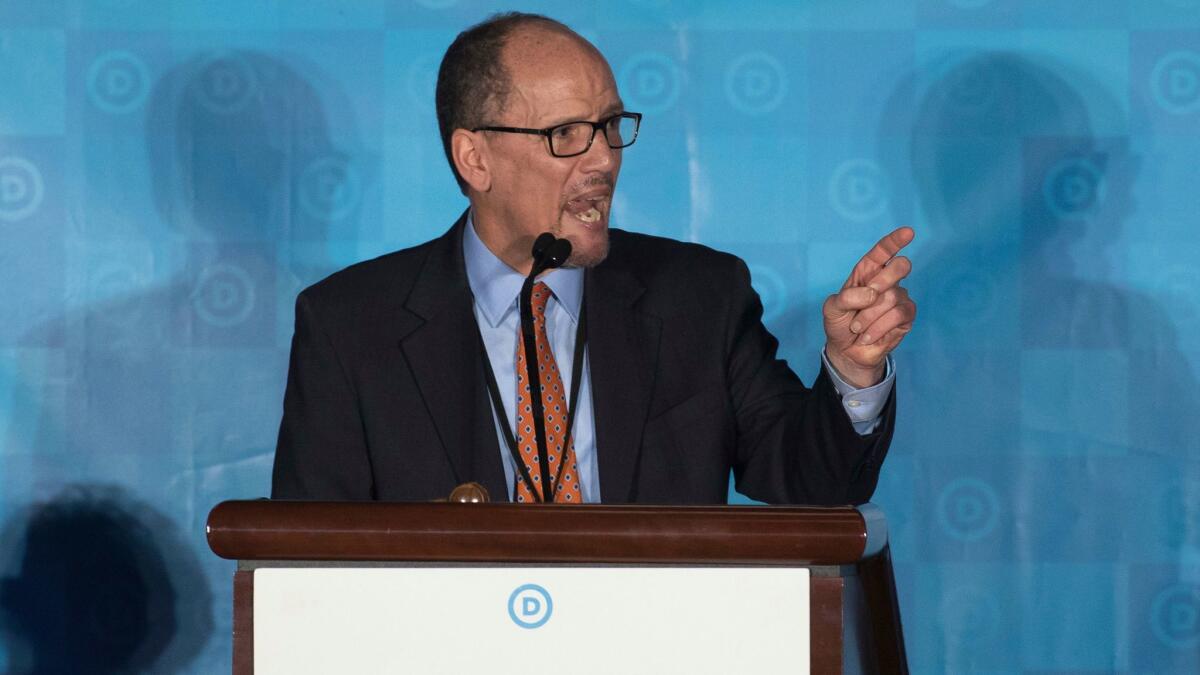
President Trump claimed Sunday that the race for Democratic National Committee chairman had been “rigged” -- drawing a quick riposte from Tom Perez, who narrowly won the party’s leadership race.
Trump insinuated that Perez’s DNC victory on the second ballot at a party conference in Atlanta on Saturday was because Hillary Clinton had backed Perez, a former Labor secretary in the Obama administration who was seen as representing the party’s establishment forces.
Clinton did not make a formal endorsement, but Perez’s rival, Rep. Keith Ellison of Minnesota, was backed by Sen. Bernie Sanders (I-Vt.) and the party’s more liberal wing.
“Bernie’s guy, like Bernie himself, never had a chance,” Trump tweeted early Sunday morning. “Clinton demanded Perez!”
Perez, appearing on CNN’s “State of the Union” on Sunday, told host Jake Tapper that he and Ellison “got a good kick out of that,” adding: “Donald Trump, up in the morning tweeting about us.”
Sanders, appearing on the same show, said Trump “doesn’t have a point” about the DNC vote.
Moments after Perez beat Ellison by 35 votes out of 435 cast, he named Ellison as the deputy chairman of the party, leading to widespread applause.
Perez is the first Latino to lead the Democratic Party, and he faces the challenge of trying to rebuild a party that suffered devastating losses in the 2016 election. Republicans now control not only the White House and Congress, but 33 governorships and dozens of state legislatures.
In his CNN interview, Perez sarcastically suggested that Trump should address questions about Russian interference in the 2016 presidential campaign rather than concerning himself with the DNC leadership battle.
“Frankly, what we need to be looking at is whether this election was rigged by Donald Trump and his buddy Vladimir Putin,” he said.
- Share via
White House again bats away call for special prosecutor on Russia
A White House spokeswoman said Sunday that it was too soon to say whether a special prosecutor should look into Russian interference in the 2016 presidential campaign, while President Trump again inveighed against coverage of Russia-related queries as “FAKE NEWS.”
Calls have grown louder from Democrats in Congress for U.S. Atty. Gen. Jeff Sessions to recuse himself from the issue because of his role as a prominent Trump supporter during the campaign, and to appoint an independent special prosecutor to carry out a Russia probe.
A few Republicans have joined in that chorus – some reluctantly. Rep. Darrell Issa of Vista, appearing on HBO’s “Real Time with Bill Maher,” voiced support Friday for naming of a special prosecutor to probe the Russian connection, though he also said congressional intelligence committees should continue their work.
He also said he considered Sessions a friend, but pointed to his role as a political appointee who had worked on the Trump campaign.
Issa, who narrowly won reelection, was a vociferous critic of the Obama administration during his former tenure as head of the House Oversight Committee. In that post, he spearheaded an array of investigations on topics from Benghazi to bank bailouts.
Some Republicans pushed back against the notion of Sessions needing to recuse himself. Sen. Tom Cotton, R-Ark., said on NBC’s “Meet the Press” that he had seen no “credible” information about contacts between the Trump campaign and Russians – and no allegations that rose to the level of criminal activity.
“If we get down that road, that’s a decision that Attorney General Sessions can make at the time,” said Cotton, who is a member of the Senate Intelligence Committee.
U.S. intelligence agencies have concluded that Russian intelligence agencies hacked Democratic Party computers and used other tactics last year to interfere with the election. The FBI is separately investigating whether anyone on Trump’s campaign had improper contacts with Russian authorities during the campaign.
On Sunday, White House Deputy Press Secretary Sarah Huckabee Sanders said congressional investigations on Russia and the campaign should be allowed to go forward before a special prosecutor appointment was considered.
“I don’t think we’re there yet,” Sanders said on ABC’s “This Week.” “Let’s work through this process.”
Echoing the previously stated White House stance, Sanders said the Trump campaign had not colluded in any Russian meddling.
“We had no involvement in this,” she said.
The president is known to keep a close eye on surrogates’ performances on the talk shows, and Sanders repeated a prime administration talking point: that questions about possible Trump campaign contacts with Russia amounted to Democratic excuses for losing the election.
“If Democrats want to continue to relive their loss every single day, by doing an investigation or review after review, that’s fine by us,” she said. “We know why we won this race. It’s because we had the better candidate with the better message.”
Trump himself underscored that notion with an afternoon tweet denouncing media coverage of the ongoing Russia investigations as “FAKE NEWS put out by the Dems, and played up by the media, in order to mask the big election defeat and the illegal leaks!”
- Share via
Whose news is fake? Here’s the latest in Trump’s war with the press
Every president since 1981 has attended the annual White House Correspondents’ Assn. dinner.
That year, President Reagan missed out. The reason? He needed to recover after a would-be assassin fired a bullet into his chest a few weeks earlier.
On Saturday, President Trump announced he will not be attending the annual dinner in April, long considered the premier social event of the Washington press corps and typically an evening of good-natured bantering between presidents and the Fourth Estate.
Trump’s announcement added to the ratcheting tensions between his administration and the media. Almost daily, in speeches or on Twitter, he calls particular news outlets fake, disgusting or dishonest — and news organizations have responded by digging in, standing united and devoting more resources to covering a president who has branded the press the enemy.
- Share via
Crucial group of Americans like Trump’s stands, not him, poll finds
With the public deeply split in its views of President Trump, one potentially key group stands out -- those who dislike the man, but approve of the direction in which he’s moving.
That’s a central finding of a new nationwide survey by NBC News and the Wall St. Journal.
The new poll confirms what other major surveys have shown: Trump starts his administration with less support than any president in the seven decades of presidential polling. Asked if they approve or disapprove of the job Trump is doing, 44% approve, 48% disapprove. No previous president has begun his tenure with a net negative job approval.
Trump has held onto the support of his ardent backers. At the other end of the spectrum, he gets almost no approval from Democrats. In the middle, the poll found, are many Americans -- just over a third of those polled -- who either voted for Trump with reservations, voted for a third party candidate or did not vote at all in 2016.
Just over half of that group gives Trump positive marks, the poll found. Their support is enough, currently, to keep Trump’s standing from collapsing, and holding them is likely key to his future.
Just under one third of Americans say they like Trump and approve of his policies, the poll found. Another one in six approve of most of his policies even though they dislike him. Well over half, 59%, said they did not like him personally.
On a separate question, only 43% of those surveyed have a positive view of Trump -- up from the low points of the campaign, but still far below the standing of most new presidents.
By contrast, 86% agreed with one of the central lines of Trump’s inaugural speech, that government insiders had “reaped the rewards of government, while the people have borne the cost.”
On other issues, the public is more closely divided. The public splits evenly, for example, on Trump’s proposed temporary ban on travel from seven mostly Muslim countries.
Just over half of those surveyed, 52%, said that the problems Trump has encountered in his first month were “unique to this administration and suggest real problems”; 43% said they were “growing pains” similar to those other administrations have had.
And by 51%-41%, the public thinks the press has been too hard on the new administration.
The NBC/WSJ poll, run by a bipartisan team of two polling firms, was taken by phone, using cell phones and landlines, Feb. 18-22 among 1,000 American adults. It has a margin of error for the full sample of 3.1 percentage points in either direction.
- Share via
Trump appears to think Perez at head of Democratic National Committee is good news for Republicans
The Democratic Party put its faith in its old guard Saturday to guide it out of the political wilderness, choosing as its new leader an Obama-era Cabinet secretary over the charismatic congressman backed by the progressive wing of the party.
Tom Perez, a former secretary of Labor with strong ties to unions, persuaded the spirited assembly of party delegates in Atlanta that he can best help harness a grass-roots outpouring of anti-Trump protest and anger into a Democratic resurgence at the ballot box.
- Share via
Trump to Washington reporters: Not going to your dinner
The annual White House Correspondents’ Assn. dinner will be missing a key guest this year: President Trump.
On Saturday, Trump tweeted he will not attend the April 29 dinner, considered the premier social event of the Washington press corps -- and typically an evening of good-natured bantering between presidents and reporters with a mix of celebrities watching.
His announcement comes amid growing tensions between his administration and the media. Trump has decried stories he doesn’t like as “fake news,” and described unnamed news groups as an “enemy of the people.”
A day earlier, the White House barred reporters from several major news organizations, including the Los Angeles Times, the New York Times, CNN and Politico, from attending an off-camera press briefing.
In a sign of the growing rift, several media organizations that traditionally sponsor lavish parties around the black-tie dinner had announced they would not do so this year.
At the annual dinner, the president usually delivers self-deprecating jokes and often is roasted by a high-profile comedian. The president also greets students who win journalism scholarships and awards, a major part of the evening.
Trump has been a frequent guest of media organizations at the dinner in the past, but he always sat at a table in the crowded ballroom, not up at the front dias.
President Obama singled Trump out during the dinner several years ago, mocking Trump for raising doubts about whether Obama was born in the United States.
“This year, as we do every year, we will celebrate the First Amendment and the role an independent press plays in a healthy republic,” the White House Correspondents’ Assn. said in a statement earlier this month about the upcoming dinner.
- Share via
Former Labor Secretary Tom Perez named Democratic Party leader
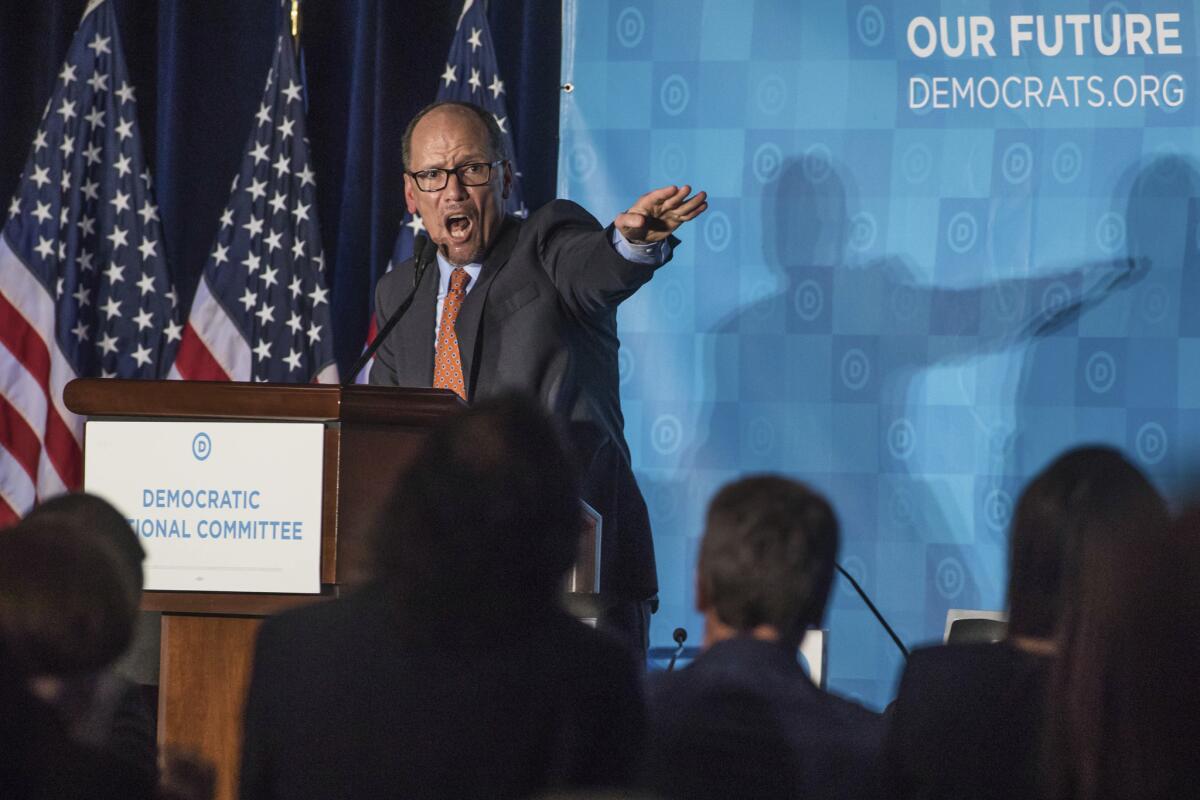
The Democratic Party put its faith in its old guard Saturday to guide it out of the political wilderness, choosing as its new leader an Obama-era Cabinet secretary over the charismatic congressman backed by the progressive wing of the party.
Tom Perez, a former secretary of Labor with strong ties to labor unions, persuaded the spirited assembly of party delegates in Atlanta that he can best help harness a grass-roots outpouring of anti-Trump protest and anger into a Democratic resurgence at the ballot box.
“We are suffering from a crisis of confidence, a crisis of relevance,” Perez told delegates before they chose him in a down-to-the-wire contest with Rep. Keith Ellison of Minnesota, whom the Bernie Sanders wing of the party had rallied round.
“We need a chair who can not only take the fight to Donald Trump. … We also need a chair who can lead a turnaround and change the culture of the Democratic Party,” Perez said.
The ascendance of an establishment liberal is certain to renew tension between veteran party stalwarts and the unruly progressive movement aligned with Sanders and Sen. Elizabeth Warren of Massachusetts, both of whom backed Ellison.
Some Ellison supporters erupted in protest as the final vote was announced.
Perez quickly sought to unite the party by naming Ellison his deputy chair, a move unanimously approved by the 435 assembled delegates, who had supported Perez 235-200.
- Share via
Trump chastises media for not reporting minor dip in national debt
President Trump took to Twitter on Saturday morning to blast the news media for not highlighting a minor dip in the national debt.
“The media has not reported that the National Debt in my first month went down by $12 billion vs a $200 billion increase in Obama first mo.,” he tweeted at 8:19 a.m.
Trump’s tweet came shortly after Herman Cain, who ran unsuccessfully for the Republican presidential nomination in 2012, made a similar comment on Fox News.
While the numbers are accurate, Trump’s tweet suggests he deserves credit for something that is largely beyond his control, especially since he hasn’t yet given Congress any proposals to change tax laws or the financial industry.
“Considering that Trump hasn’t enacted any fiscal legislation, it’s a bit of a stretch for him to take credit for any changes in debt levels,” Dan Mitchell, a libertarian economist at the Cato Institute, told the fact-checking website Politifact.
President Obama’s first month in office in 2009 was largely taken up with spending bills aimed at easing the massive recession that he had inherited.
Trump inherited an economy with low inflation, low unemployment and a booming stock market.
The national debt, which stands at just under $20 trillion, is expected to rise by more than $500 billion in the fiscal year ending in September.
- Share via
Mexico rejects U.S. plan to deport Central Americans to Mexico
Mexico has informed the Trump administration that it cannot accept non-Mexican nationals whom U.S. authorities arrest along the border and seek to remove from U.S. territory, the nation’s internal security chief said Friday.
Earlier this week, the Trump administration rolled out a broad immigration crackdown that included a proposal to send non-Mexican detainees apprehended along the U.S.-Mexico border back to Mexico while their immigration cases were pending in the United States.
The vast majority of non-Mexican nationals detained along the U.S.-Mexico border are Central Americans. They often travel overland through Mexico to reach the United States.
In a fact sheet released Tuesday, the Department of Homeland Security said that releasing detained, third-country nationals “to the foreign contiguous territory from which they arrived” would save on detention and adjudication resources. The idea would be to keep them out “pending their hearings” on deportation, the fact sheet said.
However, Mexican authorities have reacted coolly from the outset to the notion. Now, they appear to have formally nixed the idea.
On Friday, Mexico’s interior secretary, Miguel Angel Osorio Chong, told a radio interviewer than Mexican authorities had informed a pair of visiting U.S. Cabinet officers — Secretary of State Rex Tillerson and Homeland Security Secretary John F. Kelly — that Mexico could not oblige the U.S. request.
“We told them that our legal framework doesn’t allow this,” Osorio Chong told Radio Formula, referring to the visit this week of the two Trump Cabinet officials. “ We told them it is impossible. There is no way, legally, nor is there capacity.”
In recent years, non-Mexicans, mostly Central Americans, have become a larger proportion of illegal immigrants apprehended along the Southwest border as the relative number of Mexican nationals has declined.
In fiscal year 2016, according to U.S. Border Patrol statistics, agents recorded apprehensions of almost 191,000 undocumented Mexican citizens along the Southwest frontier. In the same fiscal year, the Border Patrol said it registered 218,000 detentions of non-Mexican nationals, most of them Central Americans.
Cecilia Sanchez of The Times’ Mexico City bureau contributed to this report.
An earlier version of this blog post misspelled Miguel Angel Osorio Chong’s name as Osorio Chung.
- Share via
Trump blasts FBI over Russia leaks after a brief Twitter hiatus
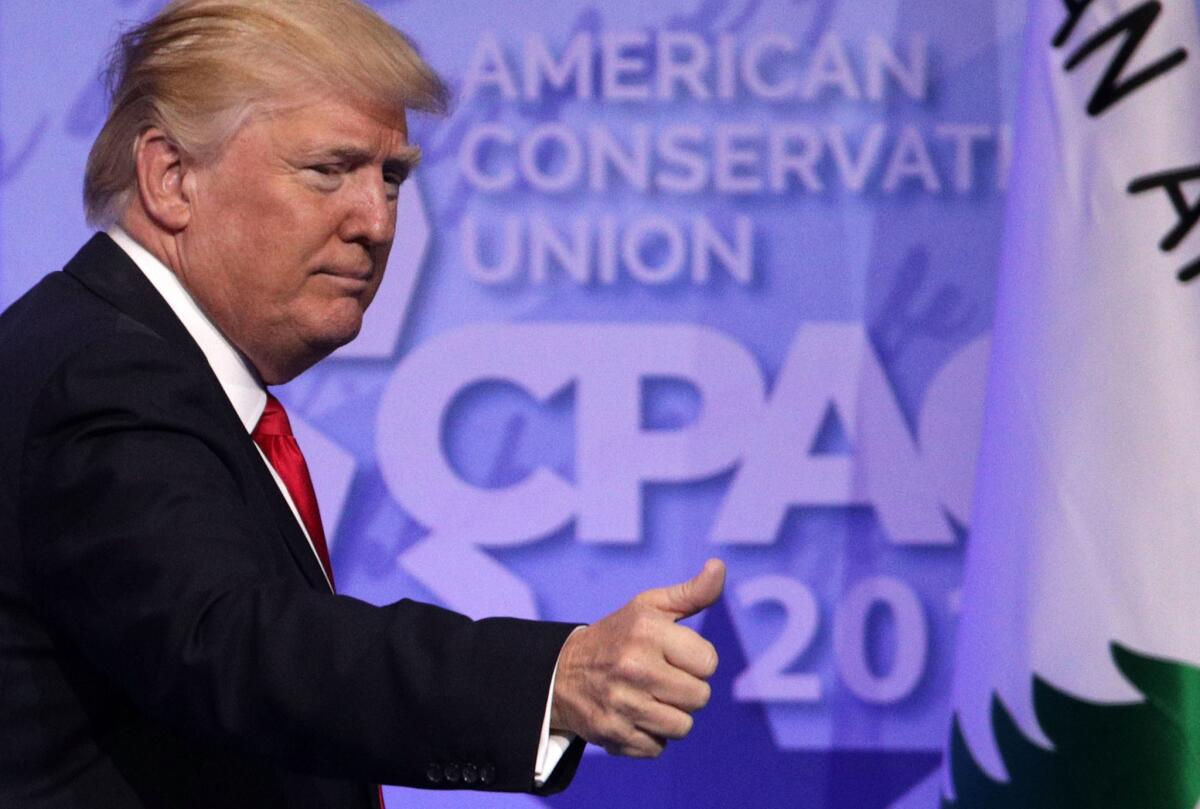
After several days of relative silence on Twitter, President Trump’s feed came alive Friday with a direct attack on the FBI.
Yes, he’s done this before. But recent news reports that suggest his administration pressed the FBI to quell claims that members of his campaign had contact with Russians throughout the 2016 election appear to have inspired a response.
“The FBI is totally unable to stop the national security ‘leakers’ that have permeated our government for a long time,” he tweeted.
And conservative news was all over it.
Here are some of today’s headlines:
Trump blasts FBI ‘leakers’ (Fox News)
Trump has assailed everyone from Democrats to intelligence officials for the leaks — which he often refers to as “fake news” — about his ties to Russia.
Reports from several news outlets this week, citing anonymous sources, claim Trump’s chief of staff, Reince Priebus, asked FBI Deputy Director Andrew McCabe to publicly dispute media reports that Trump’s campaign advisors frequently were in touch with Russian intelligence agents during the election.
While some reports made it appear Priebus had contacted McCabe, this piece disputes that. “Fox News has learned that McCabe indeed had initiated the conversation, asking to speak with Priebus for a few minutes at the end of an intelligence meeting last week,” their article reports.
Ed Schultz at CPAC: Trump promised America’s heartland a deal (Daily Caller)
He was once among the top liberal voices in the country.
Now, Ed Schultz, the former MSNBC anchor, is speaking glowingly about President Trump.
Between covering high-profile speeches at the Conservative Political Action Conference from Trump and his aides, the Daily Caller popped into a panel at which Schultz provided commentary.
Shultz, who now works with the Russian government-funded RT television network, blasted the Trans-Pacific Partnership trade deal, asserting that Trump’s claim that it would cost U.S. jobs was a game changer in the 2016 election.
“Trump went into Pennsylvania, Ohio, Michigan and Wisconsin and he took down the progressive firewall, because he talked to the American people about a deal,” Schultz said. “It was a Wall Street deal, it was not a Main Street deal,” he said, referring to the TPP.
Trump is about blowing up Washington as it exists (Rush Limbaugh)
Remember when Trump talked about “draining the swamp?”
Since he entered the White House, some conservatives have wondered if Trump means business. Many members of his cabinet — including Priebus and Atty. Gen. Jeff Sessions — are the ultimate Washington insiders.
Still, Rush Limbaugh, one of the firebrand conservatives out there, is certain the president will blow up traditional Washington.
What’s Trump’s No. 1 obstacle?
“I have concluded that the media is the No. 1 obstacle because of the success they have,” he said on his radio show this week. “The people in Washington, media is every bit as big a part of the establishment as anybody else is.”
He added: “The media is creating this narrative, if you will, and this picture — this series of pictures, this overall image — that Trump is stalled, that everybody’s opposing him, that his agenda is backlogged.”
- Share via
After Trump calls media an enemy of the people, White House bars many news outlets from briefing
Friday’s White House press briefing, normally an on-camera affair open to all reporters with press credentials, was turned into an exclusive event for certain outlets hand-picked by the administration.
The action came after President Trump on Friday described the media and what he terms “fake news” as “the enemy of the people.”On the list were Trump-friendly outlets such as Breitbart News, the Washington Times and OANN, a conservative television network that employs former Trump campaign manager Corey Lewandowski as a commentator.
Off the list were some of Trump’s favorite targets, including the New York Times and CNN. The Los Angeles Times was also excluded.
The off-camera briefing with Sean Spicer, the press secretary, was not solely for conservative outlets. Several mainstream reporters were also allowed in, including the three major broadcast networks and wire services, such as Bloomberg News. Also allowed in were pool representatives who transmit news events to a far larger group of reporters.
The Associated Press and Time magazine were also invited but declined to participate in solidarity with other news organizations that were denied entry.
The White House Correspondents’ Assn. protested, as did editors at several of the organizations that were excluded.
In a statement, Times editor Davan Maharaj said that it was “unfortunate that the Los Angeles Times has been excluded from a White House press briefing today.”
“The public has a right to know, and that means being informed by a variety of news sources, not just those filtered by the White House press office in hopes of getting friendly coverage,” Maharaj said.
“Regardless of access, The Times will continue to report on the Trump administration without fear or favor,” he added.
12:30 p.m.: This post was updated with a statement from Times editor Davan Maharaj.
- Share via
‘It’s a Russian flag!’ Trickster strikes CPAC before Trump’s speech
As the crowd waited to hear President Trump speak at the Conservative Political Action Conference, little red-white-and-blue flags appeared without warning, handed down the aisles by a man with a green bag, according to a witness.
The flags said “Trump.” They also happened to be the flag of the Russian Federation.
“He was dressed like any one of us,” said Tyler Dever, 20, a student at the University of South Florida in Tampa, who was wearing a suit. “He passed them to me and was like, ‘Pass them down, pass them down.’ ”
Dever, caught up in the moment, passed them down, before someone sitting next to him said, “Oh, it’s a Russian flag!” CPAC staff quickly recollected the flags.
“If it was just a red-white-and-blue flag, I would have picked it out,” Dever said. He said it was his first time attending an event like CPAC and was surprised to see a provocateur in the audience, especially beyond the cordon set up by the Secret Service.
“Someone tried to victimize me,” Dever said. “You have Secret Service out here, and I’d expect it to be fully screened. ... Thank God someone noticed.”
- Share via
Trump still loves the USC/L.A. Times poll: What it got right and what it got wrong
Throughout the fall campaign, then-candidate Donald Trump and his allies loved the USC/L.A. Times “Daybreak” poll -- the only major survey that consistently showed him winning.
“A couple polls got it right. I must say Los Angeles Times did a great job, shocking because, you know, they did a great job,” Trump declared in his speech this morning at CPAC, the annual gathering of conservative activists.
But did the poll get it right?
In the simplest terms, no, and after considerble analysis, we know why.
- Share via
A celebration, and wake, for a campaign legend and a Republican Party that is no more
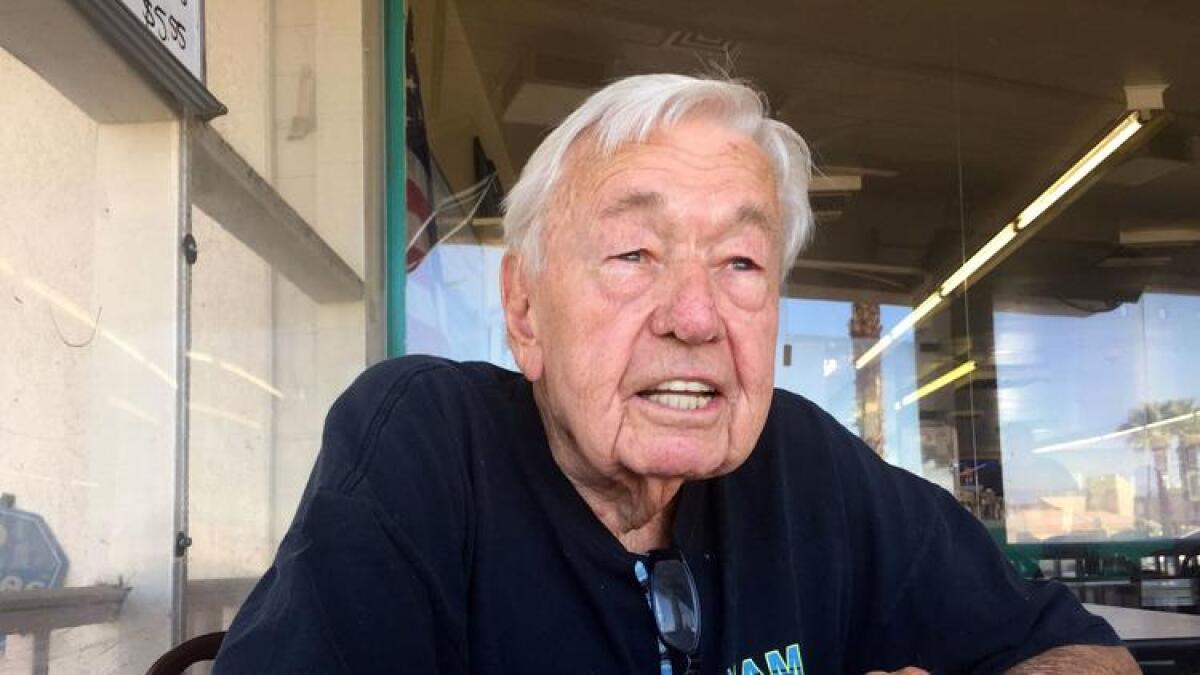
It was a cool and rainy day when elders of the Republican tribe recently gathered to honor one of their own.
The honoree, Stuart K. Spencer, was unmistakable in his white duck pants and a lime-green sport coat so bright it almost hurt to see. A reformed chain-smoker, he snapped merrily away on a wad of chewing gum.
The event marked Spencer’s 90th birthday, but the mood beneath the surface conviviality was unsettled and gray, like the clouds fringing the mountains outside.
If the occasion was intended as a personal celebration, it also had the feel of a wake for a time in politics long passed.
Along with former Vice President Dick Cheney and former California Gov. Pete Wilson, veterans of the Reagan years turned out in force. It was Spencer, more than anyone, who took a political long shot and washed-up B-movie actor and helped transform him into the Reagan of legend.
- Share via
CPAC’s reaction to President Trump’s speech: Two thumbs up
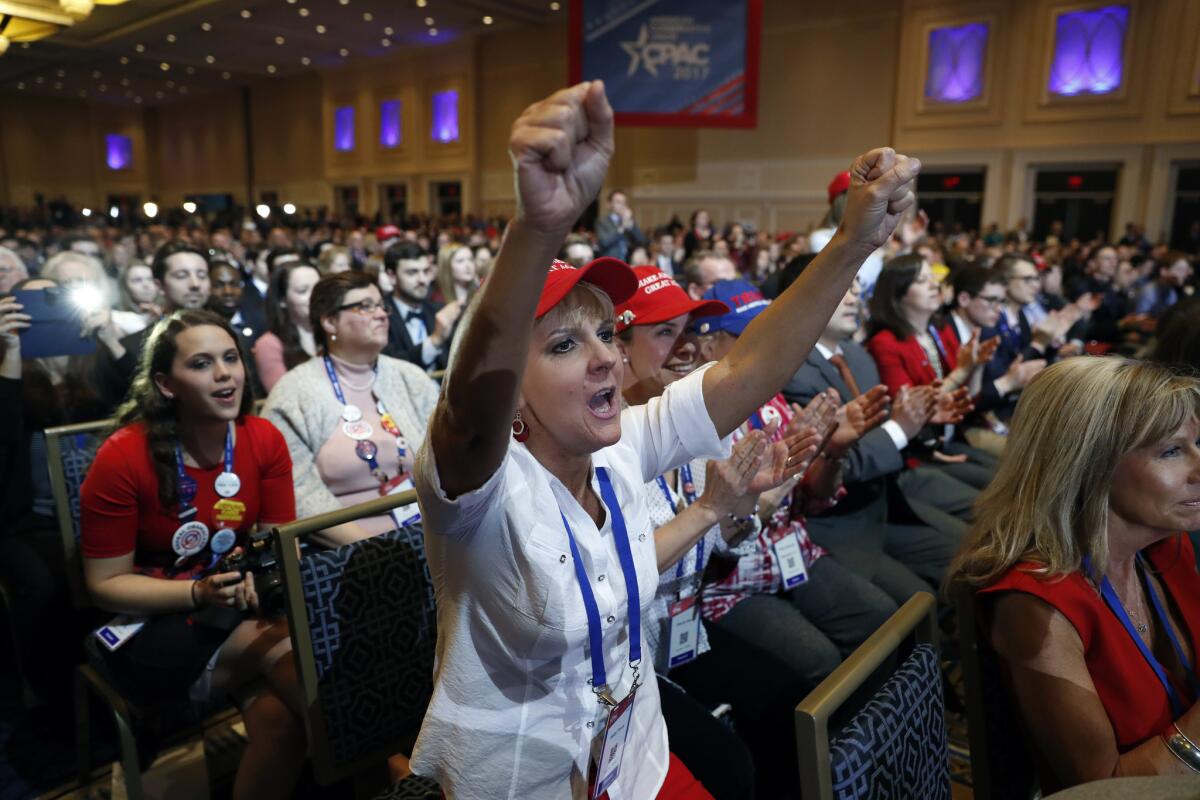
President Trump loves CPAC, and CPAC loves Trump.
As hundreds of Conservative Political Action Conference attendees spilled out into the hallways Friday after Trump’s speech to the group, they had glowing reviews of the man who has been tormenting Democrats and the media and transforming the Republican Party.
“It was fantastic, unbelievable, absolute truth,” said Shia L. Lome, 84, a retired Air Force colonel from Deerfield Beach, Fla., appraising Trump’s remarks. “If he carries through [his promises], this will be the greatest country ever.”
Lome added that there is “no question about it, Trump is his own type of Republican. Whether it’s conservative or whatever you want to call it,” Lome said he is happy “as long as [Trump] causes the Democrats heartaches.”
Kayne Robinson, 73, a former chairman of the Iowa Republican Party, said Trump was simply taking the party in the direction that “people want it to go.”
“I think the party is every bit as united behind him as it was behind either of the Bushes,” Robinson said. “Trump led a revolution in the party, very much like Reagan. ... I think Trump is doing just fine.”
Frank March, a 50-year-old Army retiree from Fairfax County, Va., emerged from the ballroom at the Gaylord National Resort & Convention Center wearing a red Make America Great Again cap, which carried Trump’s jagged signature on the bill.
March’s daughter had gotten the hat signed when she previously met Trump, and he proudly showed off photos of that event. “I recognize the signature!” a woman exclaimed as she saw the hat.
March praised Trump’s “follow-through” and his “commitment to workers” as “incredible.”
“He’s bringing in new people to the party,” March said. “The hope is, by his follow-through, doing what he said he was going to do,” then the non-Republicans who voted for Trump “will stick.”
Helping workers will be one of the ways Trump can make that happen, he said.
“In politics, you’re supposed to help people,” March said. “Workers are the people. They’re people who earn money to take care of their families. Republicans should support those people because they’re the ones who make America run.”
- Share via
Donald Trump shows up at conservatives’ most prominent gathering and defines a new GOP

President Trump shows up at conservatives’ most prominent gathering and defines a new GOP.
President Trump made one of his strongest pitches Friday to unite the Republican Party and the conservative movement behind a nationalist, anti-globalist ideology that until recently would have been unthinkable for many Republicans.
“There is no such thing as a global anthem, a global currency or a global flag,” Trump said to great applause from thousands of conservatives. “I’m not representing the globe. I’m representing your country.”
He echoed ideas he has espoused in the past -- denouncing trade deals as the antithesis of “economic freedom,” warning that the great cities of Europe have been ruined by mass immigration, denouncing intervention in the Middle East by both parties.
But while many of the words were familiar, the venue and the passion made Friday’s speech remarkable.
The comments came at the annual Conservative Political Action Conference, just outside of Washington, D.C., the most prominent gathering of right-leaning groups and activists in the country. Such a speech would have been shocking from a conservative, much less the president, at almost any other time in the conference’s history.
Trump has been popular at CPAC in the past. He credits a speech there with launching his political career. But he snubbed last year’s event amid a heated primary in which many conservatives rejected his tone and the direction he was trying to move the GOP.
“I would have come last year, but I was worried that I would be at that time too controversial,” Trump said in his speech, which lasted nearly an hour.
Trump, the first president since Ronald Reagan to address the group during his first year in office, made clear that he is moving those once controversial ideas to the movement’s center.
In addition to his usual critiques of the media and frequent references to his electoral success, Trump spoke directly of his ambition for reshaping the Republican Party to attract blue-collar voters, “the forgotten men and women” who helped propel his electoral victory.
“I’m here today to tell you what this movement means for the future of the Republican Party and for the future of America,” Trump said. “The core conviction of our movement is that we are a nation that [must] put and will put its own citizens first.”
Later, he added that “the GOP will be from now on also the party of the American worker.”
While Trump tried to unite conservatives, the speech made little effort to bridge the country’s larger political divide. For example, Trump dismissed people who have shown up at town halls around the country to protest reversal of Obamacare.
“They’re not you,” he said. “They’re the side that lost.”
- Share via
Justice Department rescinds order phasing out use of private prisons
Atty. Gen. Jeff Sessions has jettisoned an Obama administration order to phase out the use of private prisons to hold federal inmates.
The new order reverses one issued by former Deputy Atty. Gen. Sally Yates in August that sought to eliminate the department’s use of private for-profit prisons, which hold just over 10% of the current prison population.
The Obama administration order “changed long-standing policy and practice, and impaired the bureau’s ability to meet the future needs of the federal correctional system,” Sessions wrote Thursday to announce the reversal.
Civil rights and prisoner rights groups decried the Sessions’ decision, saying private prisons are not as cost-effective or as safe as government-run facilities, citing numerous abuses in the past.
The Bureau of Prisons houses about 21,000 of its 190,000 inmates in a dozen private prisons, including one near Bakersfield.
“Atty. Gen. Sessions has shown that he is not taking the mass incarceration crisis seriously,” said Wade Henderson, who heads the Leadership Conference on Civil and Human Rights.
“Continuing to rely on private prisons for federal inmates is neither humane nor budget conscious,” Henderson added. “We need a justice system that can work better for all people.”
Yates’ order did not affect facilities used to detain people in the country illegally.
The use of private prisons is expected to surge under President Trump’s promised crackdown on illegal immigration.
Trump has signed an executive order calling for expansion of immigrant detention facilities and authorized the use of private contractors “to construct, operate, or control facilities.”
Stocks in private prison companies have jumped on Wall Street since Trump won the presidential election, and they continued their rise on news of Sessions’ order.
- Share via
CPAC and conservative media prepare for Trump
The future path of the Republican Party is being debated in the halls of the Conservative Political Action Conference in Maryland this week.
Will it be the party of Donald Trump, an outsider of the GOP establishment, or House Speaker Paul D. Ryan, the definition of establishment? Or, perhaps, of Richard Spencer, a white nationalist leader of the so-called alt-right movement? (Spencer was kicked out of CPAC on Thursday.)
Trump is set to address the conference on Friday, and the conservative media are ready for the much-anticipated address.
“Tomorrow it will be TPAC when he’s here,” Kellyanne Conway, a senior advisor to Trump told reporters Thursday.
Here are some of today’s headlines:
Go Big, Go Bold: Walker, at CPAC, pushes GOP to carry out agenda as party controls Congress, White House (Fox News)
Wisconsin Gov. Scott Walker, once a Trump foe, is urging conservatives to use the November election as a mandate.
“Do what you said you were going to do,” Walker said to attendees.
In the Fox News piece, which leads its website, it notes that leaders at the conference are hoping to use it to strategize about what they can accomplish and to better articulate their values at a time when the very definition of conservatism has seemed to waver.
Sweden Democrats: Trump was right (Fox News)
Remember last weekend when everyone — including many Swedish politicians — were really confused about Trump’s comments at a recent rally?
“You look at what’s happening last night in Sweden,” Trump, at a rally in Florida on Saturday, said about the Scandinavian country that has accepted large numbers of refugees. “Sweden. They took in large numbers. They’re having problems like they never thought possible.”
Actually, not much happened in Sweden on Friday night. Trump said later that he had been referring to a broadcast on Fox News on that night. Still, recent riots in the country were covered extensively by conservative media.
This post notes a recent op-ed penned by Jimmie Akesson and Mattias Karlsson, both leaders of the Sweden Democrats, in the Wall Street Journal on Wednesday supporting Trump’s characterization of a Muslim immigrant-led crime crisis in Sweden.
In it they write, “Trump did not exaggerate Sweden’s current problems. … If anything, he understated them.”
Trump Is Letting DREAMers Stay, And Rush Is Fine With That (Daily Caller)
He’s an immigration hard liner, and, apparently, he’s OK with Trump allowing DREAMERs to remain in the country.
This piece highlights comments by Rush Limbaugh this week.
“A lot of people think that Trump’s caving because if you allow the DREAMers to stay, we’re talking 750,000 DREAMers, kids, who each have two parents who could come in. Look, this is a-no-win,” Limbaugh said this week. “Nobody’s gonna win anything by deporting a bunch of kids that we let in.”
- Share via
Trump advisor Steve Bannon rails at ‘corporatist, globalist media’
The two men with the most heavily dissected relationship in President Trump’s White House held a rare public appearance together Thursday and agreed on one common enemy: the media.
Reince Priebus, the chief of staff who is often described as “embattled,” said he has grown “conditioned” to the media counting Trump out: during the presidential campaign, the transition and the first month of the presidency.
“The biggest misconception is everything that you’re reading,” Priebus said.
Steve Bannon, Trump’s chief strategist, framed his complaint as an ideological war. He consistently called the media “the opposition party” throughout a 20-minute joint interview on stage at the Conservative Political Action Conference just outside of Washington.
“It’s not only not going to get better, it gets worse every day,” Bannon said. “They’re corporatist, globalist media that are adamantly opposed to an economic nationalist agenda like Donald Trump has.”
“If you think they’re going to give you your country back without a fight,” he added. “You are sadly mistaken.”
Bannon, former executive chairman of the far-right Breitbart News, seldom speaks in public. His nationalist rendering of Republican ideology is often seen in contrast to Priebus, the former chairman of the GOP, who is viewed as the more mainstream conservative advocate within the White House.
The two men said the tension between them portrayed in the media is inaccurate. But as they praised each other, the men made clear that Bannon sees his role as dominant in shaping Trump’s policy.
Bannon praised Priebus for doggedly keeping the trains running -- “one of the toughest jobs I’ve ever seen in my life.” Bannon talked about being in “the first inning” of shaping “a new political order” and beginning the “deconstruction of the administrative state.”
Priebus used more prosaic language and spoke of Bannon as the one who pushes Trump to maintain his bold vision.
“He is very dogged in making sure that every day the promises that President Trump made are the promises we’re working on,” Priebus said of Bannon.
- Share via
In Mexico, Homeland Security chief says there will be no mass deportations of people in U.S. illegally
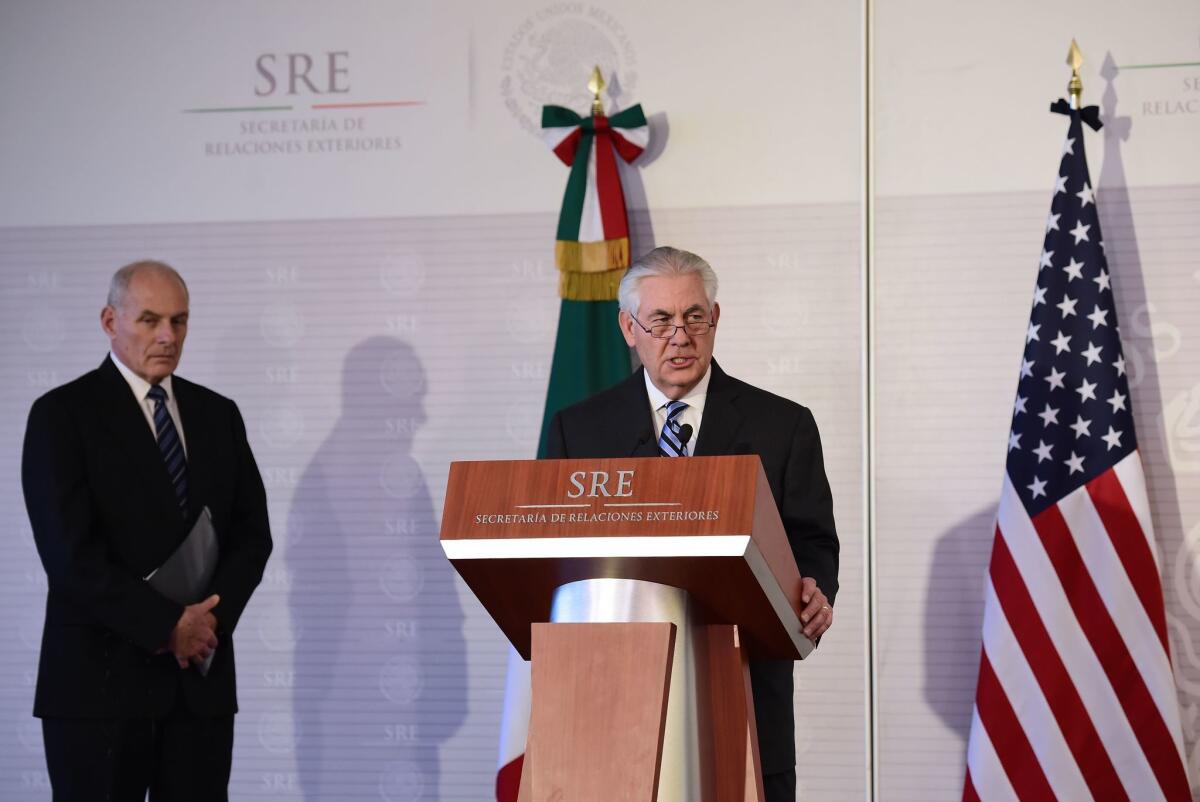
Homeland Security Secretary John F. Kelly, on a visit to Mexico, said Thursday that there will be no mass deportations of people living in the U.S. illegally.
Kelly also said U.S. military forces would not be used in deportation efforts and that any deportation cases would go through the U.S. legal system.
“No. Repeat, no use of military force in immigration operations,” Kelly said at a news conference at the Foreign Relations Ministry in Mexico City. “None. We’ll approach this operation systematically, in an organized way, in a results-oriented way, in an operation and and in a human dignity way.”
Kelly and Secretary of State Rex Tillerson are in Mexico City to discuss a wide variety of issues, including immigration and security, with Mexican government officials.
Kelly’s remarks came the same day President Trump called recent raids in the U.S. an unprecedented enforcement effort.
“You see what’s happening at the border. All of a sudden for the first time, we’re getting gang members out,” he said. “We’re getting really bad dudes out of this country, and at a rate that nobody’s ever seen before.”
- Share via
Mexico bracing for long battle with Trump administration, foreign minister tells lawmakers
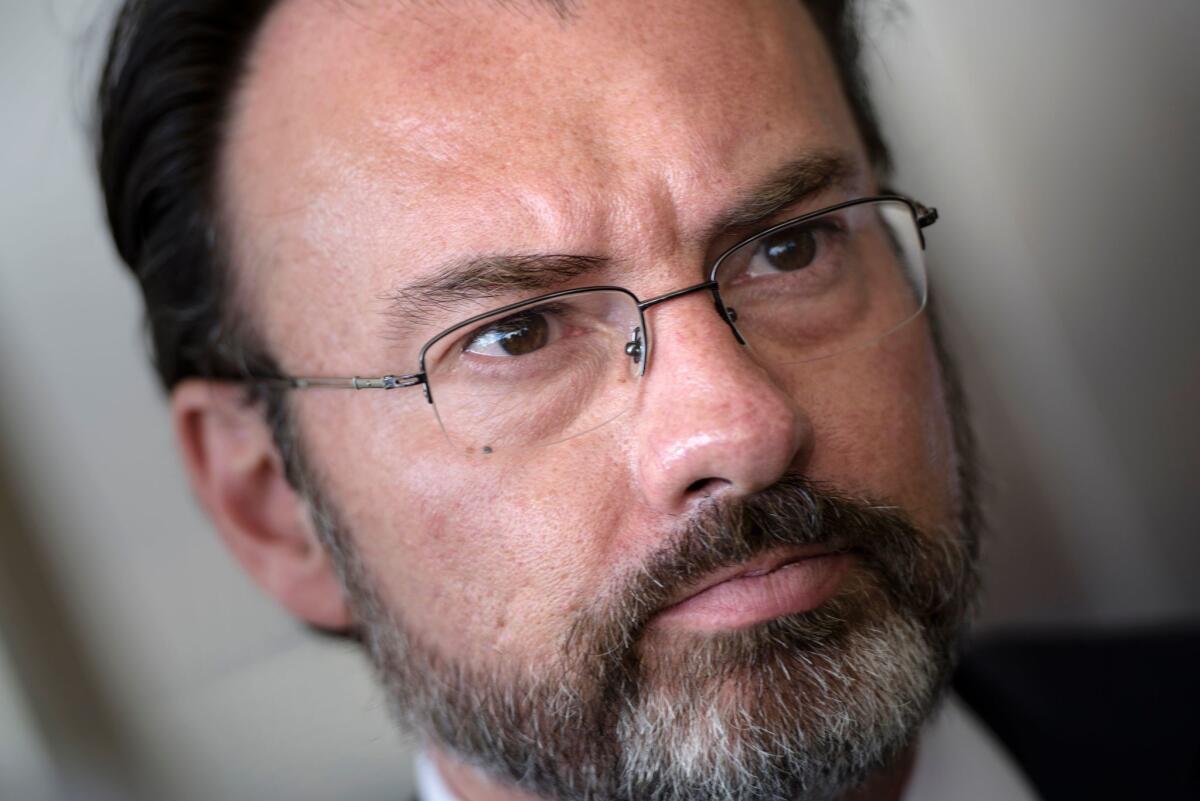
Mexico is preparing for a long “battle” with the administration of President Trump, its foreign minister reportedly told lawmakers in private comments, adding that the country was prepared to retaliate with new tariffs if necessary.
“We are here preparing for a battle that is going to be long,” Foreign Minister Luis Videgaray told federal deputies Wednesday, according to the newspaper La Jornada, which said it had obtained a copy of the comments. “This is not going to be resolved in three days.”
In the reported remarks, Videgaray said Mexico was prepared to retaliate with new tariffs on U.S.-made goods should the Trump administration follow up on its threats to slap an export tax of 20% or more of goods imported from Mexico to the United States.
There was no official response from the Mexican Foreign Ministry on Videgaray’s reported remarks.
Videgaray was among the Mexican officials, including President Enrique Peña Nieto, who met this week with a pair of visiting White House Cabinet members, Secretary of State Rex Tillerson and Homeland Security Secretary John F. Kelly. The private remarks were apparently made on Wednesday, when the two Trump envoys were scheduled to arrive in Mexico City.
- Share via
Homeland Security tried to downplay immigration raids as routine. Now Trump says they’re unprecedented
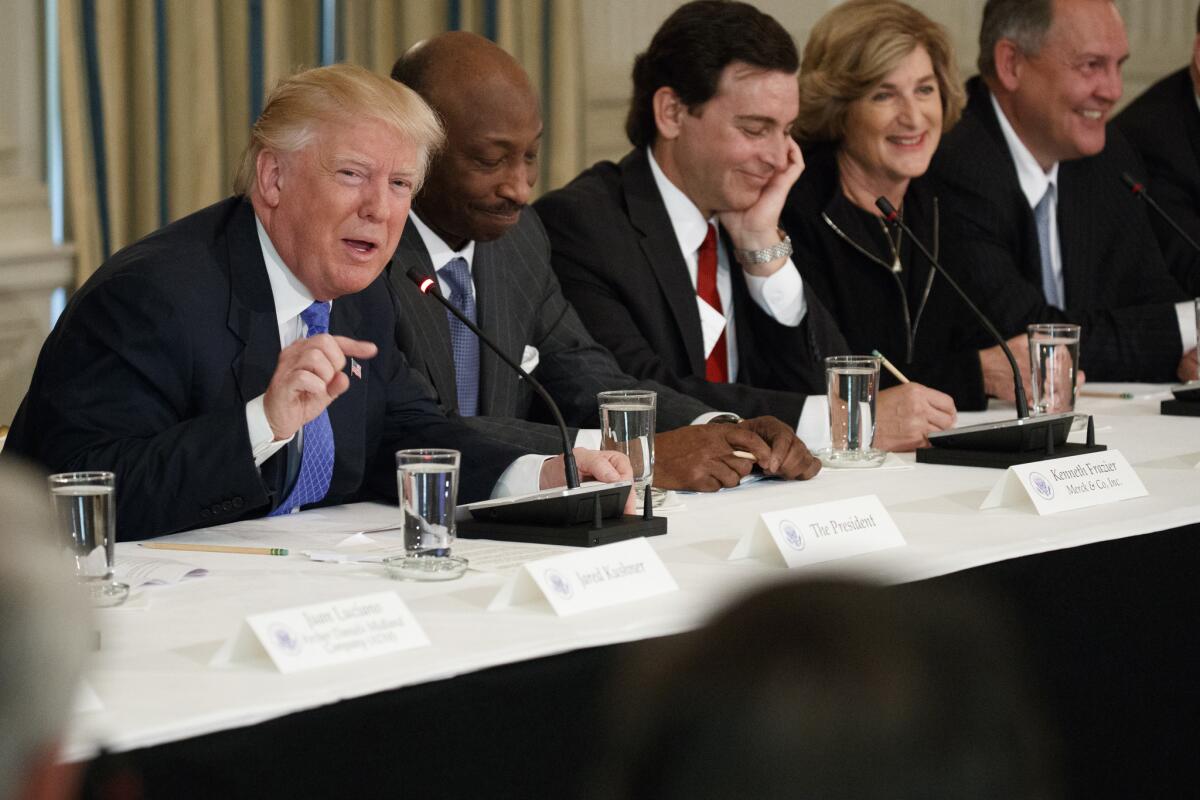
After nationwide immigration raids this month in which more than 680 people were arrested, the Department of Homeland Security issued a nothing-to-see-here statement downplaying the sweeps as strictly ordinary.
“ICE conducts these kind of targeted enforcement operations regularly and has for many years,” the agency said last week, referring to Immigration and Customs Enforcement.
But President Trump had a different take Thursday, labeling the raids an unprecedented enforcement effort.
“You see what’s happening at the border. All of a sudden for the first time, we’re getting gang members out,” he said before a roundtable on manufacturing. “We’re getting really bad dudes out of this country, and at a rate that nobody’s ever seen before.”
Under President Obama, deportations peaked at 400,000 people in 2012, touching off widespread criticism from immigration advocates, which prompted Homeland Security to scale back deportations.
Last year, deportations fell to 240,000 as the Obama administration focused on targets similar to what Trump described in the raids conducted under his authority: criminals, repeat immigration violators and recent arrivals.
Trump also called the sweeps this month a “military operation,” even though no military resources were involved and the White House has pushed back aggressively on reports that the administration was considering seeking National Guard forces to assist in deportations.
Homeland Security said the raids were conducted by ICE agents, U.S. marshals and state and local law enforcement agencies.
“What has been allowed to come into our country, when you see gang violence that you’ve read about like never before, and all of the things — much of that is people that are here illegally,” Trump said. “They’re rough and they’re tough, but they’re not tough like our people. So we’re getting them out.”
Of the 680 arrests last week, 161 occurred in Los Angeles and surrounding counties. Three-quarters of those detained in the Los Angeles-area sweeps were from Mexico.
Trump noted that Secretary of State Rex Tillerson and Homeland Security Secretary John F. Kelly traveled to Mexico this week on a “tough trip.”
“We have to be treated fairly by Mexico,” Trump said.
- Share via
White nationalist leader Richard Spencer booted from Conservative Political Action Conference
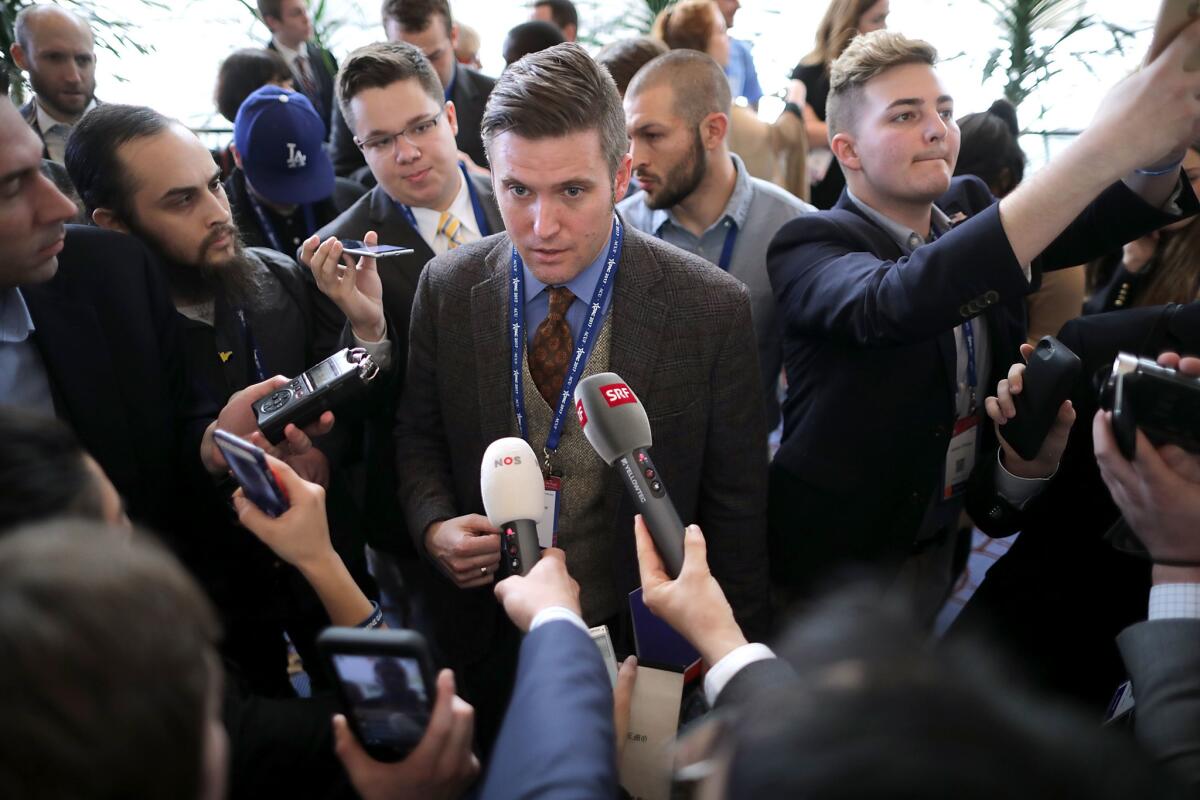
One of America’s most prominent white nationalists, Richard Spencer, was kicked out of the Conservative Political Action Conference on Thursday after conference organizers gave him credentials to attend and then wavered on whether to let him stay.
Spencer, who coined the term “alternative right” to describe his far-right views on separating the races, came to CPAC to attend a speech that was critical of the “alt-right.”
CPAC organizer Matt Schlapp took pains to distance CPAC from the fringe Spencer represents.
“The ‘alt-right’ does not have a legitimate voice in the conservative movement,” said Schlapp, adding that “nobody from that movement is speaking at CPAC.”
- Share via
Obamacare 101: Are health insurance marketplaces in a death spiral?
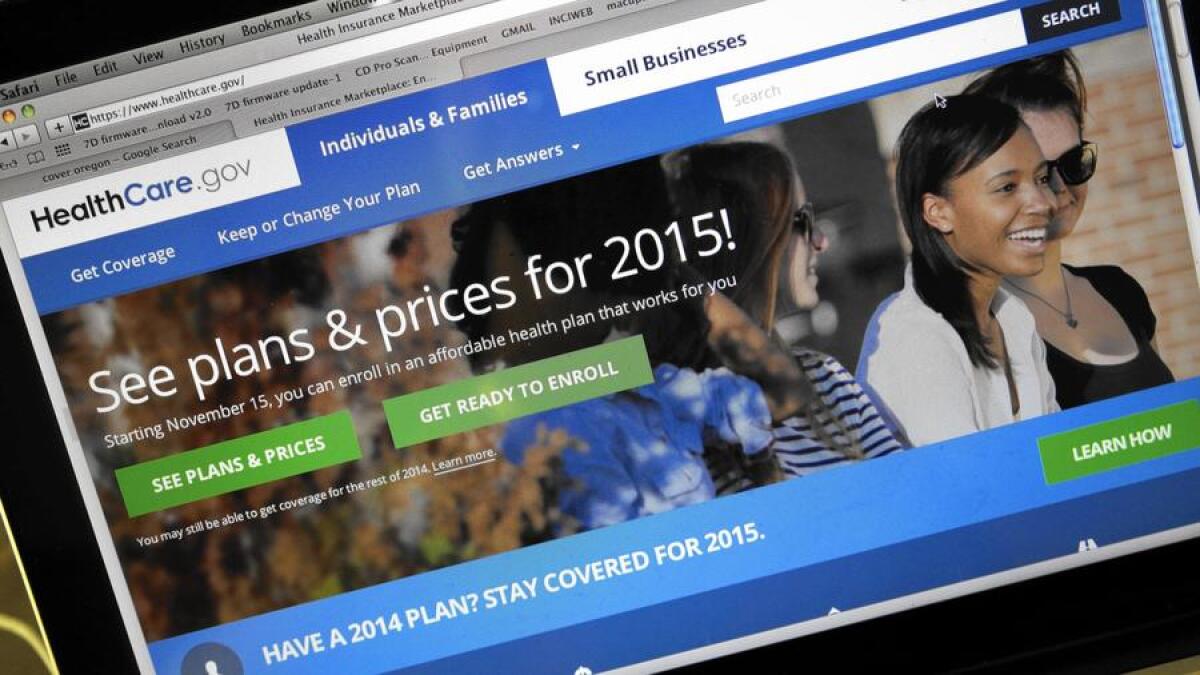
It’s been a rocky few months for the health insurance marketplaces created by the Affordable Care Act.
Even if you’re not one of the roughly 11 million Americans who rely on these online markets to get your health insurance, you’ve probably seen the headlines about rising premiums and insurance companies pulling out of the system.
Last week, national insurance giant Humana announced it would stop selling plans on the marketplace. Aetna’s chief executive claimed the marketplaces are in a “death spiral.” Republicans say the marketplaces are Exhibit A that Obamacare is collapsing.
So what’s the real story? Are these things really kaput or can they be fixed? Here’s a rundown of where things stand.
- Share via
Trump administration wants tax reform done by August, Mnuchin says
The Trump administration wants to overhaul the tax code by August, Treasury Secretary Steven Mnuchin said Thursday, laying out an aggressive timetable in his first significant public comments since taking office last week.
“Our economic agenda, the No. 1 issue is growth, and the first most important thing that will impact growth is a tax plan,” Mnuchin said in an interview with CNBC.
“So we are committed to pass tax reform,” he said. “We want to get this done by the August recess.”
- Share via
Loud and angry, protesters turn congressional town halls into must-see political TV
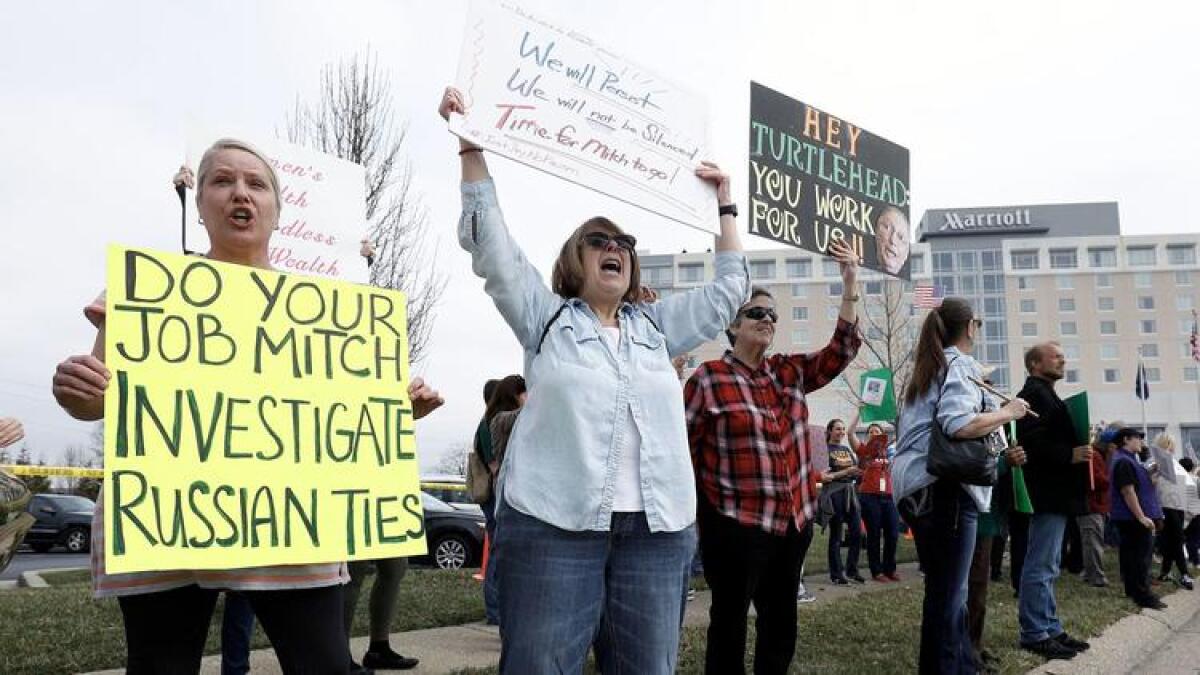
They came by the hundreds, in big cities and rural hamlets, to heckle, plead, badger and, in some instances, to protest the protests themselves.
Congress is in recess this week, and a citizenry suddenly spurred to action used the opportunity to let their returning lawmakers know just how they feel about the tempestuous last month in Washington.
“Winners make policy and losers go home,” a taunting Mitch McConnell, the Republican Senate leader, told an invitation-only gathering in his home state of Kentucky, as about 1,000 protesters gathered outside.
Not exactly.
The town hall meeting, a throwback to a time of more intimate connection, has become a political organizing tool in the social media age — a piece of performance theater and a worldwide stage.
Obamacare, immigration, environmental regulation, Social Security, Russian meddling in the 2016 election and Trump, Trump, Trump — all poured forth this week in the form of questions, loudly and heatedly.
- Share via
Trump administration rescinds guidelines on protections for transgender students
The Trump administration rescinded an Obama-era directive Wednesday aimed at protecting transgender students’ rights, questioning its legal grounding.
Under the guidelines, schools had been required to treat transgender students according to their stated gender identity, and either allow access to restrooms and locker rooms for the gender they identify with or provide private facilities if requested. The Obama administration had said that students’ gender identities were protected under Title IX requirements, which prohibit federally funded schools from discriminating on the basis of sex.
But officials in the Education and Justice departments said that their predecessors failed to make their case, citing “significant litigation” spurred by the policy.
- Share via
Americans in Mexico protest Trump’s ‘inflammatory rhetoric’ during Tillerson visit
A group of Americans living in Mexico is planning a protest Thursday to send a message to visiting U.S. Secretary of State Rex Tillerson.
Their gripe?
President Trump’s “inflammatory rhetoric.”
That’s according to a draft of a letter that several groups organizing the protest hope to deliver to Tillerson, who is in town along with Homeland Security Secretary John F. Kelly for talks with top Mexican officials.
The letter, which will be cosigned by the Mexican chapter of Democrats Abroad, as well as other groups, complains about Trump’s “hostile” attitude toward Mexico, which it says is engendering “nationalistic sentiments” in Mexico.
Among Trump’s hostile acts, the letter says, is Trump’s vow to build a border wall and force Mexico to pay for it.
“The idea of building a wall ... frames Mexico and Mexicans as foreign invaders,” the letter says.
It also criticizes Trump for pledging to renegotiate NAFTA, saying, “The U.S. and Mexico are deeply connected economies and it is in the interest of the United States to strengthen the regional production network to boost manufacturing employment in the U.S. and ensure the long-run competitiveness of manufacturing in the region.”
There are more than a million U.S. citizens living in Mexico, and many have been vocal since Trump’s election. Last month, thousands turned out for a women’s march outside the American Embassy that saw crowds chanting anti-Trump slogans.
- Share via
Mexico will never accept ‘unilateral’ American immigration rules, foreign secretary says
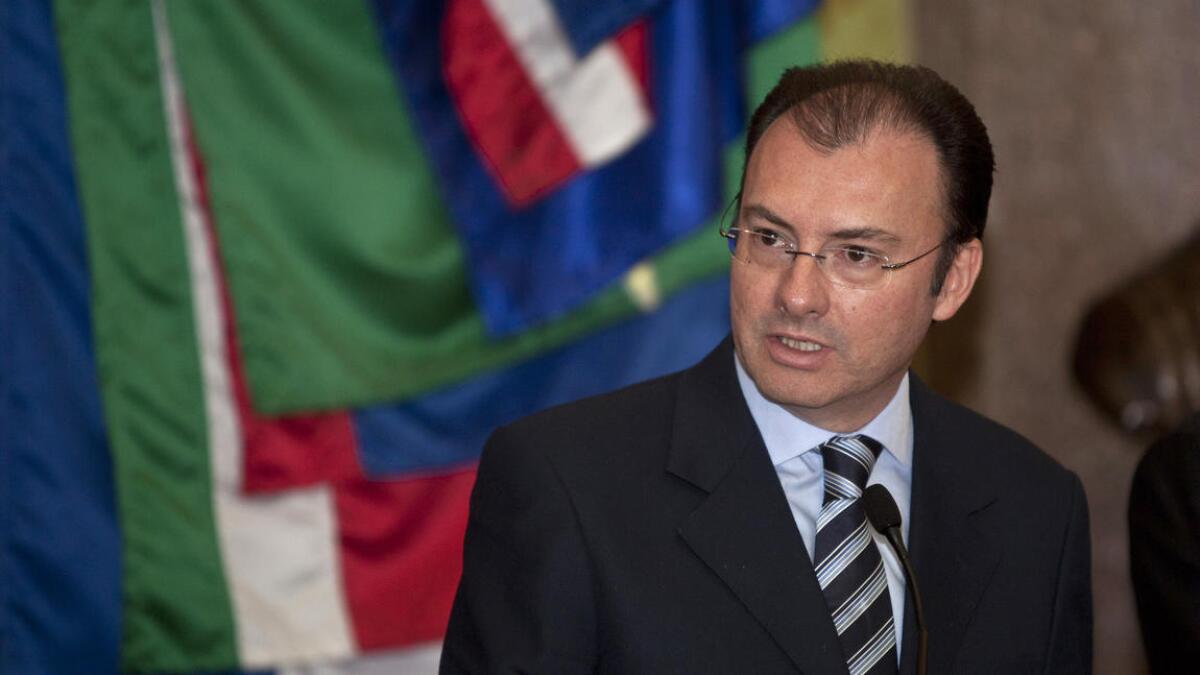
Mexico will reject any “unilateral” effort from the United States to impose immigration or other policies on the Mexican government, the country’s foreign secretary said Wednesday.
“I want to make clear, in the most emphatic way, that the government of Mexico and the Mexican people do not have to accept measures that, in a unilateral way, one government wants to impose on another,” Foreign Secretary Luis Videgaray said in public comments. “That we are not going to accept.”
He spoke a day after the Trump administration unveiled tough new measures to enforce immigration laws and deport people who are in the country illegally — proposals that were widely portrayed in the Mexican media as a prelude to massive deportations.
On Wednesday, two top Trump administration cabinet members — Secretary of State Rex Tillerson and Homeland Security Secretary John F. Kelly — were arriving in Mexico for talks with that nation’s officials, including Videgaray. Immigration, trade and law enforcement issues were expected to be discussed at a tense moment in U.S.-Mexican relations.
In his reported comments, the Mexican secretary did not single out any specific U.S. proposal as objectionable. Mexican officials have acknowledged there is little they can do to counter U.S. immigration policies.
Among other things, the Trump administration has proposed sending non-Mexican citizens detained along the U.S.-Mexico border back to Mexico. Mexican officials would presumably have to sign off on such a plan.
Mexico already detains and deports thousands of Central Americans annually who cross Mexican territory with the hope of entering the United States illegally via the U.S.-Mexico border. U.S. authorities have worked with their Mexican counterparts to halt the Central American influx.
The Mexican foreign secretary made it clear that immigration would be at the top of the list of items to be discussed during meetings with the U.S. Cabinet secretaries.
Defending the rights of Mexican immigrants is “the first point in the agenda,” said Videgaray. He also said Mexico could take the issue of the rights of Mexican immigrants to the United Nations and other international agencies.
- Share via
U.S. Secretary of State Rex Tillerson arrives in Mexico
- Share via
Both in power and in turmoil, conservatives head to Conservative Political Action Conference to see what’s next

The eyes of men in crisp blazers darted toward passing faces and identification badges, looking for a familiar face, a famous name. As Fox News host Sean Hannity prepared to broadcast a live show from a ballroom, a brief chant burst out from the audience: “U-S-A! U-S-A!”
It’s that time of year again: Hundreds of Republicans began arriving Wednesday at the Gaylord National Resort & Convention Center in Oxon Hill, Md., just south of Washington, for the annual Conservative Political Action Conference. CPAC, as it’s best known, is a place for conservative political figures and activists to gather, schmooze, hammer out new ideas and audition for starring roles in the Republican Party.
And this year, CPAC attendees have a lot to talk about. Their party is in control of Congress, the White House and dozens of state governments across America, and yet not at all at peace with itself.
President Trump is expected to address the conference later in the week after winning on a platform of populist nationalism that some conservatives have accused of not being conservative at all.
Breitbart News, the brash rising star of right-wing media, is one of the conference’s top promoters, but one of its staffers, Milo Yiannopoulos, lost his speaking slot at CPAC and resigned from the news organization after video circulated showing him appearing to promote pedophilia. Some conservatives had backed Yiannopoulos and cried censorship when the provocateur offended liberals at college speaking events, but now they had become offended themselves.
Still, as CPAC began on Wednesday, the mood was upbeat. This was a victorious movement, after all.
Many new guests were greeted by the sight of Josh Platillero, 23, wearing a cartoonishly large stovepipe hat and a suit the colors of the American flag.
“I love networking,” said Platillero, who recently lived in Knoxville, Tenn., before moving to the D.C. area to work with a conservative nonprofit, the Leadership Institute. It’s his second year attending CPAC, and he was excited about the lineup of speakers, which include some of the White House staff.
“I think our new president is not perfect, but I think he’s doing good things,” he said.
Ariel Kohane, 45, who came from the Upper West Side in Manhattan, stood in the lobby holding signs that read, “Jews for Trump,” in both English and Hebrew.
“I love the fact that I can get together with many of my fellow conservative friends and colleagues and we can all be very proud of ourselves with all our accomplishments and the fact that we get to strategize and plan ways to further expand conservatism across America and across the whole world,” Kohane said.
- Share via
Pence condemns Jewish center bomb threats and visits desecrated cemetery in Missouri
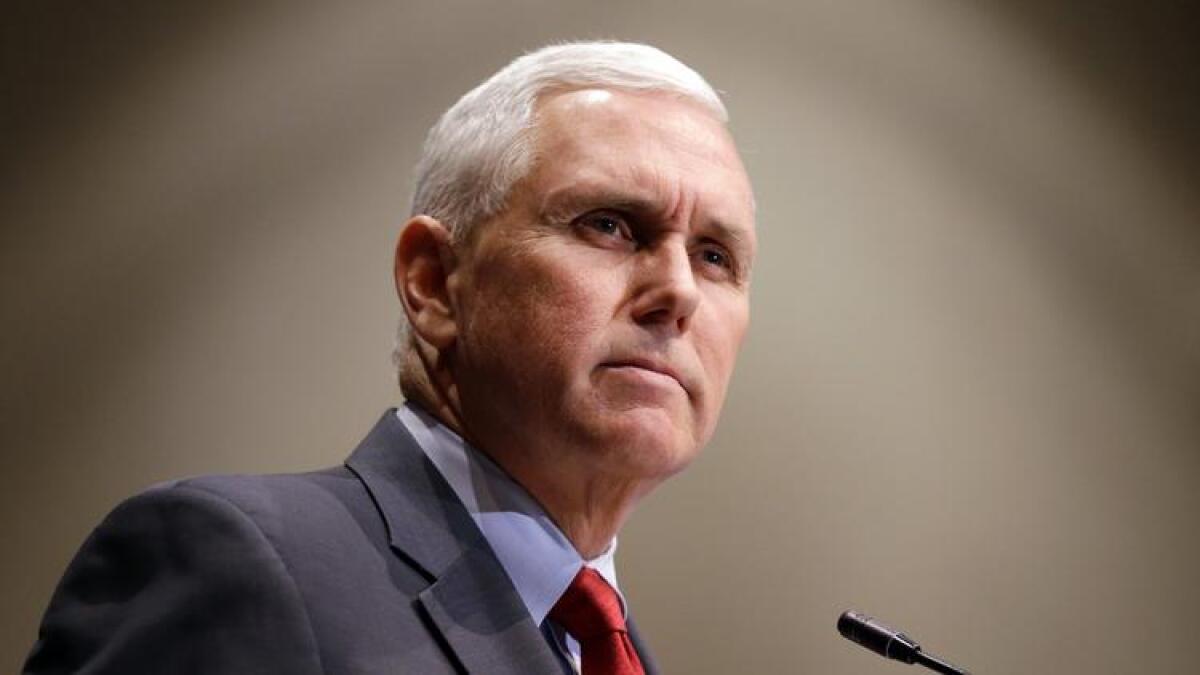
Visiting Fenton, Mo., on Wednesday, Vice President Mike Pence condemned a string of bomb threats against Jewish community centers around the nation and the desecration of a St. Louis-area Jewish cemetery over the weekend.
“Speaking just yesterday, President Trump called this a horrible and painful act. And so it was. That along with other recent threats to the Jewish community centers around the country,” said Pence, who was visiting the headquarters of the Fabick Cat machinery company. “He declared it all a sad reminder of the work that still must be done to root out hate and prejudice and evil. We condemn this vile act of vandalism and those who perpetuate it in the strongest possible terms.”
The vice president said it was “inspiring” how the “people of Missouri have rallied around the Jewish community with compassion and support.”
Among those showing solidarity with the Jewish community is a group of Muslims who launched an online fundraising campaign to help repair the cemetery. Donors had pledged more than $90,000 by Wednesday afternoon.
Pence later visited the Chesed Shel Emeth Cemetery in University City, Mo., where nearly 200 tombstones had been toppled over the weekend.
- Share via
Trump’s move on transgender bathroom access sparks interest
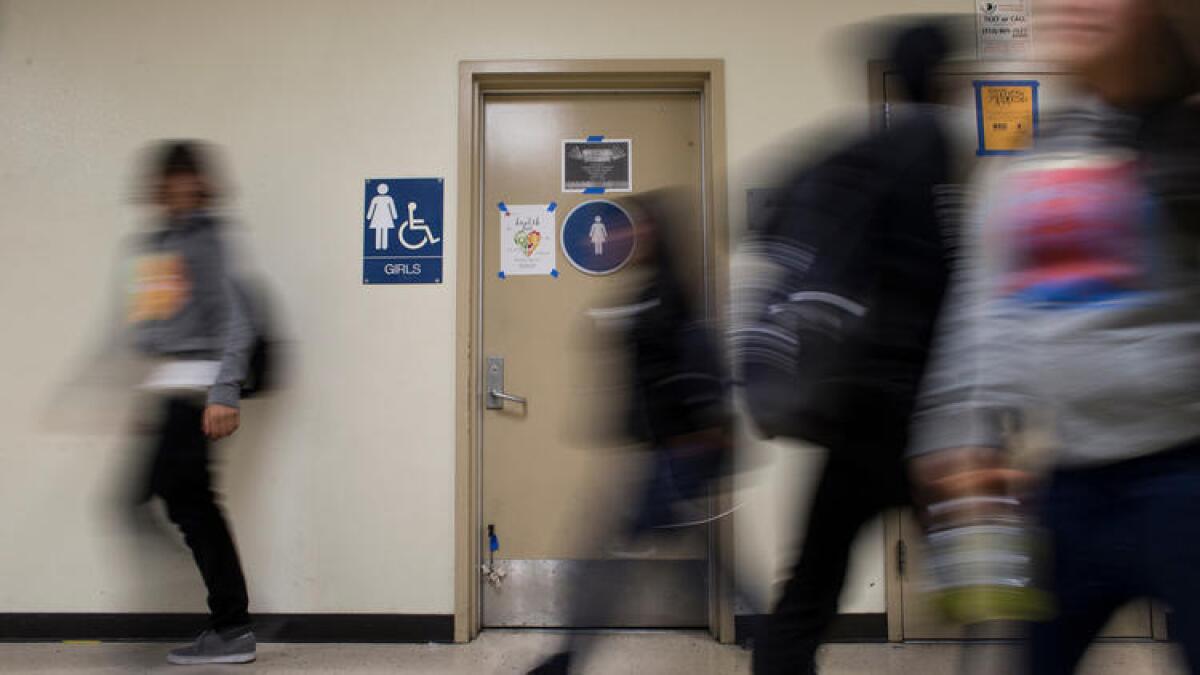
For President Trump, commenting on social issues — such as same-sex marriage and abortion — has never seemed much of a priority.
Indeed, throughout the campaign, Trump hardly discussed the topics.
When asked about transgender bathroom access at a town hall in April 2016, Trump said people should be able to use whichever bathroom they choose. He then moved on from the question, offering little else.
Now it appears his administration is set to wade into the controversy.
It’s a topic the conservative media loves to explore.
Here are some of today’s headlines:
Return to normalcy: Trump readies reversal of transgender bathroom lunacy in public schools (Daily Caller)
What will the Trump administration do about transgender bathroom access?
The Caller highlights White House Press Secretary Sean Spicer’s pronouncement on the issue: “This is a states rights issue and not one for the federal government,” Spicer told reporters.
The ‘lunacy’ referred to is the federal guidance President Obama issued prior to leaving office directing schools that receive federal funding to allow transgender students to use restrooms and other facilities that match their gender identities.
Several states filed suit to overturn the directive, and a federal judge issued a temporary injunction barring its enforcement, which remains in place.
Several states, following the lead of North Carolina, are seeking to implement legislation that bans transgender people from using the bathrooms of the gender with which they identify.
66 percent of Trump voters change the channel when awards shows get too political (Daily Caller)
When Meryl Streep criticized President Trump last month in her Golden Globes speech, he replied quickly.
“Meryl Streep, one of the most over-rated actresses in Hollywood, doesn’t know me but attacked last night at the Golden Globes,” Trump tweeted.
Well, Trump can probably expect more barbs as actors (in overwhelmingly liberal Hollywood) take the stage at the Oscars on Sunday.
Lots of Trump voters can be expected to change the channel, according to this piece, which highlights a new poll on the subject.
The Hollywood Reporter says that 66% of Trump voters said they have stopped watching an awards show because a celebrity started talking about politics while accepting an award. By contrast, only 19% of Hillary Clinton’s supporters have done so.
Trump talks tolerance, decries anti-Semitism, but media remain skeptical (Fox News)
Well, Trump finally did say something to condemn the anti-Semitic vandalism and threats that have taken place since his presidential victory.
“Anti-Semitism is horrible,” Trump said in an interview with MSNBC on Tuesday.
In the Fox News piece, Howard Kurtz argues the media should give the president more credit for speaking out.
“I always think it’s unfair to blame a political leader for violence or vandalism carried out by people who support him,” he writes. “I felt the same way about critics who blamed Barack Obama for urban riots or shootings of police officers.”
- Share via
Among Republicans, Trump is more popular than congressional leaders
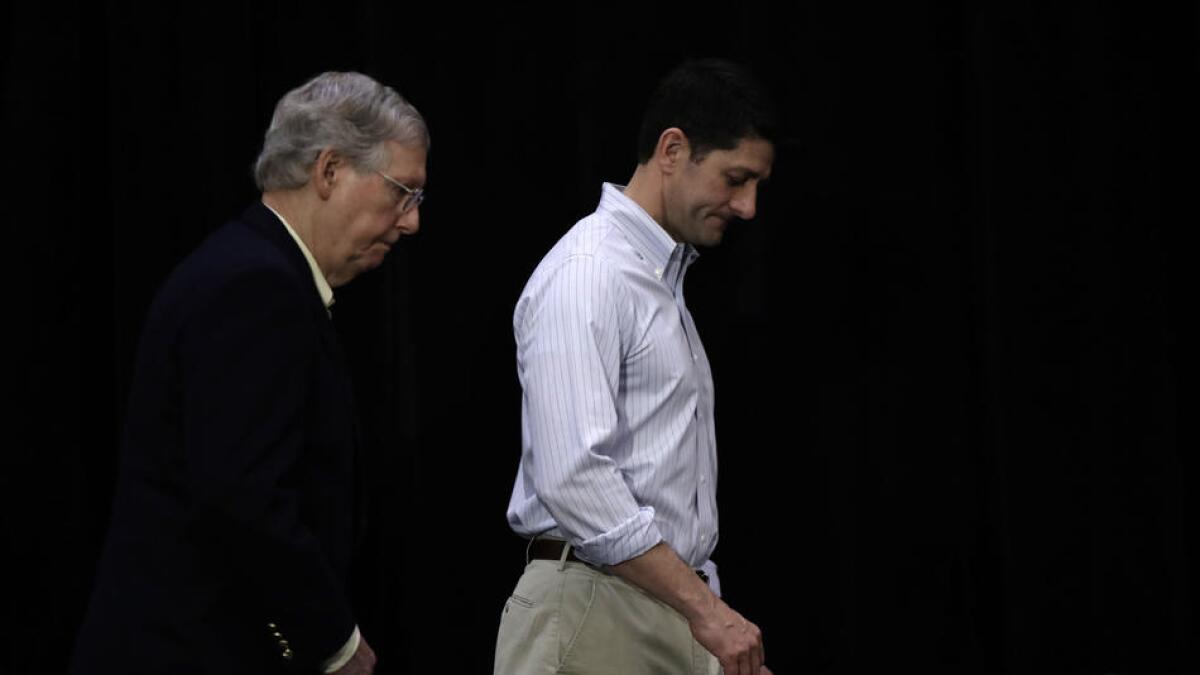
Amid strain between the Trump administration and the Republican-controlled Congress, the White House holds the high ground, a new survey indicates.
Among Republicans, President Trump has greater popularity than the party’s congressional leaders. Asked specifically who they would trust if the two sides disagreed, most Republicans chose Trump over their party’s leadership.
The findings, from a new survey by the nonpartisan Pew Research Center underscore Trump’s continued sway with the Republican congressional majority. Although the president has historically low job approval ratings among the public at large, he remains highly popular among Republican partisans and in Republican districts.
As for Democrats, they’re strongly in an oppositional mood. Asked if they were more worried that Democrats in Congress would go too far in opposing Trump or not go far enough, more than 70% of Democrats said they feared their party would not go far enough. Only 20% said they worried the party would go too far.
Republicans in Congress have eyed Trump warily on several fronts. His positions on trade and entitlement reform break with years of the party’s positions. His reluctance to criticize Russian President Vladimir Putin has generated tension. And the administration’s lack of clarity on healthcare and tax policy have Republican leaders guessing which way to turn on major issues.
But Republican partisans have fewer reservations than their elected representatives. Eighty-six percent to 13%, those who identify as Republicans or as independents who lean Republican have a favorable view of Trump, the Pew survey found.
By comparison, 57% have a favorable view of Sen. Mitch McConnell of Kentucky, the majority leader, with 22% unfavorable and 21% having no opinion. House Speaker Paul Ryan of Wisconsin is slightly better known, with 65% of Republicans holding a favorable view, 23% an unfavorable view and 13% having no opinion.
Asked who they would trust if the two sides disagreed, 52% of Republicans said they would side with Trump and 34% with the Republicans in Congress. Republicans younger than 40 were the only major exception; 52% to 36%, they said they would side with Congress.
At the same time, Republican partisans now have a warmer opinion of their party leadership than they had during most of President Obama’s tenure.
During the Obama years, GOP partisans tended to be frustrated that their side could not reverse the president’s initiatives, even with a majority in the House, starting in 2010, and then in the Senate for Obama’s last two years. Their view of the GOP leadership has rebounded strongly since the election.
Democrats’ view of their congressional leadership has been more stable. And both sides widely dislike the other party’s leaders.
- Share via
Supreme Court rejects use of ‘racial stereotypes’ in death penalty cases
The Supreme Court rejected the use of “racial stereotypes” in death penalty cases Wednesday, reopening the case of a black man in Texas who was sentenced to die after his jury was told African Americans are more likely than whites to commit crimes.
Chief Justice John G. Roberts Jr. said this testimony had no place in a sentencing hearing and “appealed to the racial stereotype that black men are prone to violence.”
“Our laws punish people for what they do, not for who they are,” the chief justice said in the courtroom.
The 6-2 decision faults Texas authorities for refusing to give a new sentencing hearing to Duane Buck, a Houston man who was convicted of shooting and killing his ex-girlfriend and seriously injuring her new boyfriend in 1995.
Buck was found guilty of murder, but when his jury was debating his fate, his court-appointed defense attorney put on the witness stand an expert who cited statistics showing blacks are more likely to commit future crimes than whites.
After hearing this testimony, the jury decided to sentence Buck to death.
Years later, Texas state attorneys set aside the death sentences for six other black defendants whose juries heard similar testimony, but they refused to reopen Buck’s case.
In Buck vs. Davis, the high court said that was a mistake. The jury was deciding “the question of life or death,” and this is no place for the introduction of a “particularly noxious strain of racial prejudice,” Roberts said.
The court sent the case back to judges in Texas to reconsider the death sentence.
Justice Clarence Thomas dissented, along with Justice Samuel A. Alito Jr. Thomas said Buck was properly sentenced to die for a brutal murder, and he insisted the court should not have heard the case for procedural reasons. “Having settled on a desired outcome, the court bulldozes procedural obstacles and misapplies settled law to justify it,” he wrote.
- Share via
At Rep. Tony Cárdenas’ town hall, Democrats worry about what Donald Trump may do
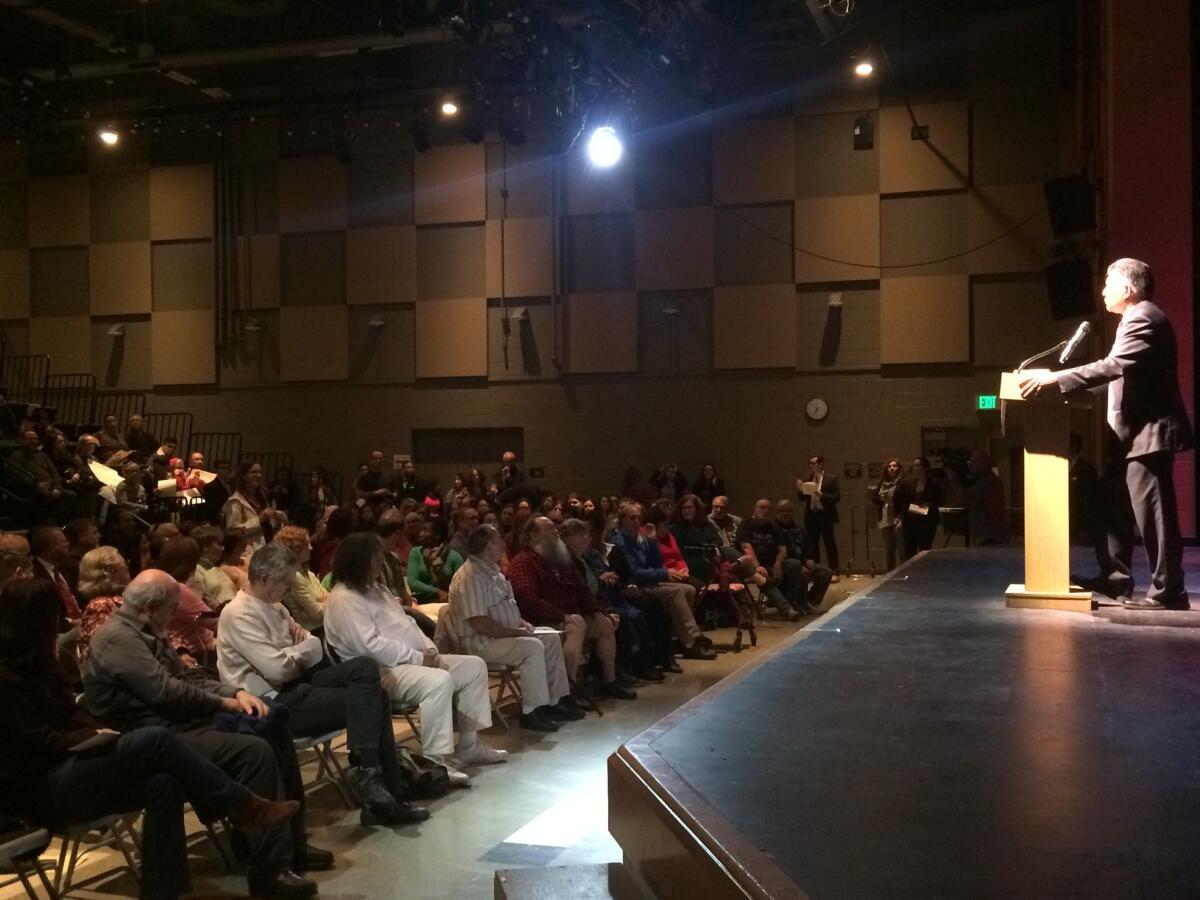
They arrived with soggy jackets, hats and umbrellas.
The topic was supposed to be the Affordable Care Act. But many who attended Democratic Rep. Tony Cárdenas’ town hall meeting Tuesday night in a crammed auditorium at the Cesar E. Chavez Learning Academies came with a question: What can we -- as Democrats -- do to help you?
“Show up and vote,” said Cárdenas, who represents a slice of the staunchly liberal San Fernando Valley. (Hillary Clinton defeated Donald Trump in this district by nearly 60-percentage points in the fall election.)
“Sign people up, get people involved,” he said.
At times the meeting had the feel of a therapy session for Democrats, wondering aloud how to function under a Trump administration.
“Where is the anger among Democrats?” asked one man. “I want to see more anger.”
Cárdenas, standing at a lectern on an elevated stage, offered a stern look and nodded in agreement as rain could be heard splattering on the roof above.
The complaints included Republicans’ efforts to repeal Obamacare and Trump’s new immigration mandates.
“Trust me, I’m pissed. I’m upset,” Cardenas said. “But we have to act constructively. We have to be responsible.”
Last month, Trump signed executive orders directing the Department of Homeland Security to prioritize the removal of people in the U.S. illegally who have criminal convictions.
In addition to speeding up the deportation of convicts, Trump’s orders also call for quick removal of people in the country illegally who are charged with crimes and waiting for adjudication.
And in recent days, a handful of people who have received protection under Deferred Action for Childhood Arrivals (DACA) have been arrested by Immigration and Customs Enforcement agents nationwide.
Cárdenas said that for him, the issue is personal. His parents were immigrants from Mexico, who lived in the San Fernando Valley for decades, raising 11 children, he said. Today his district is nearly 70% Latino.
“I’m going to fight for you,” he said. “I’m going to fight for the people who are my immigrant father.”
When a young man, a DACA recipient, asked him, via Twitter, if he’ll be safe in the weeks ahead, Cárdenas seemed at a loss.
“I pray that [Trump] doesn’t go after you,” he said.
- Share via
Killing with kindness, GOP’s McClintock faces down hostile questioners as town hall goes into overtime
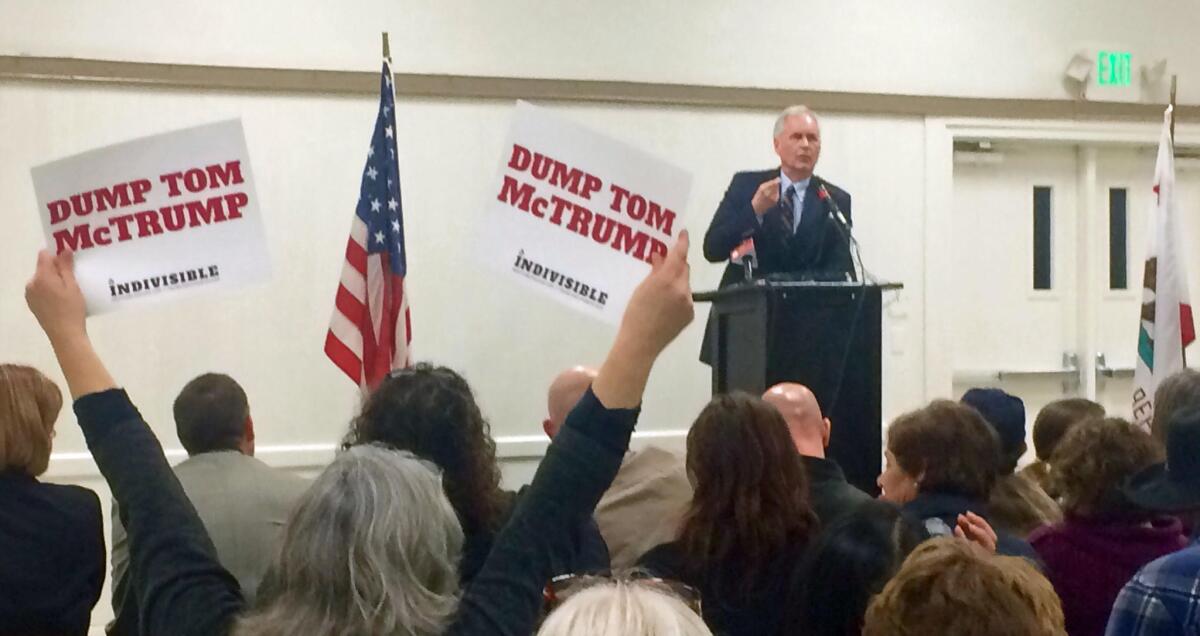
The last time Rep. Tom McClintock held a town hall meeting, earlier this month in the Sacramento suburbs, he left under police escort.
His session Tuesday night in Mariposa, a small tourist way station on the road to Yosemite, drew plenty of barbed questions, criticizing the five-term GOP congressman and attacking President Trump.
But the more than half dozen California Highway Patrol officers arrayed around the auditorium at the fairground hardly seemed necessary.
McClintock ceded no ground on his deeply conservative beliefs and staunchly and repeatedly defended the president -- often to jeers and catcalls.
But even some of the harshest questions McClintock faced were prefaced with thanks for his willingness to show up early and stay late. Many of his GOP colleagues have ducked such confrontations, refusing their constituents’ requests.
“God bless all of you for being here,” he said at one point, after a woman in the audience said the huge turnout -- about 900 people -- was a show of resistance to Trump. (In fact, about a third or so of the crowd appeared strongly supportive of the president.)
It is highly doubtful if any minds were changed during the session, which went more than an hour past schedule.
But in the end, McClintock managed to outlast many of his inquisitors. By the time he took his last question, after more than two hours and 20 minutes, the hall was close to half empty.
- Share via
Florida congressman finds hostile crowd at town hall
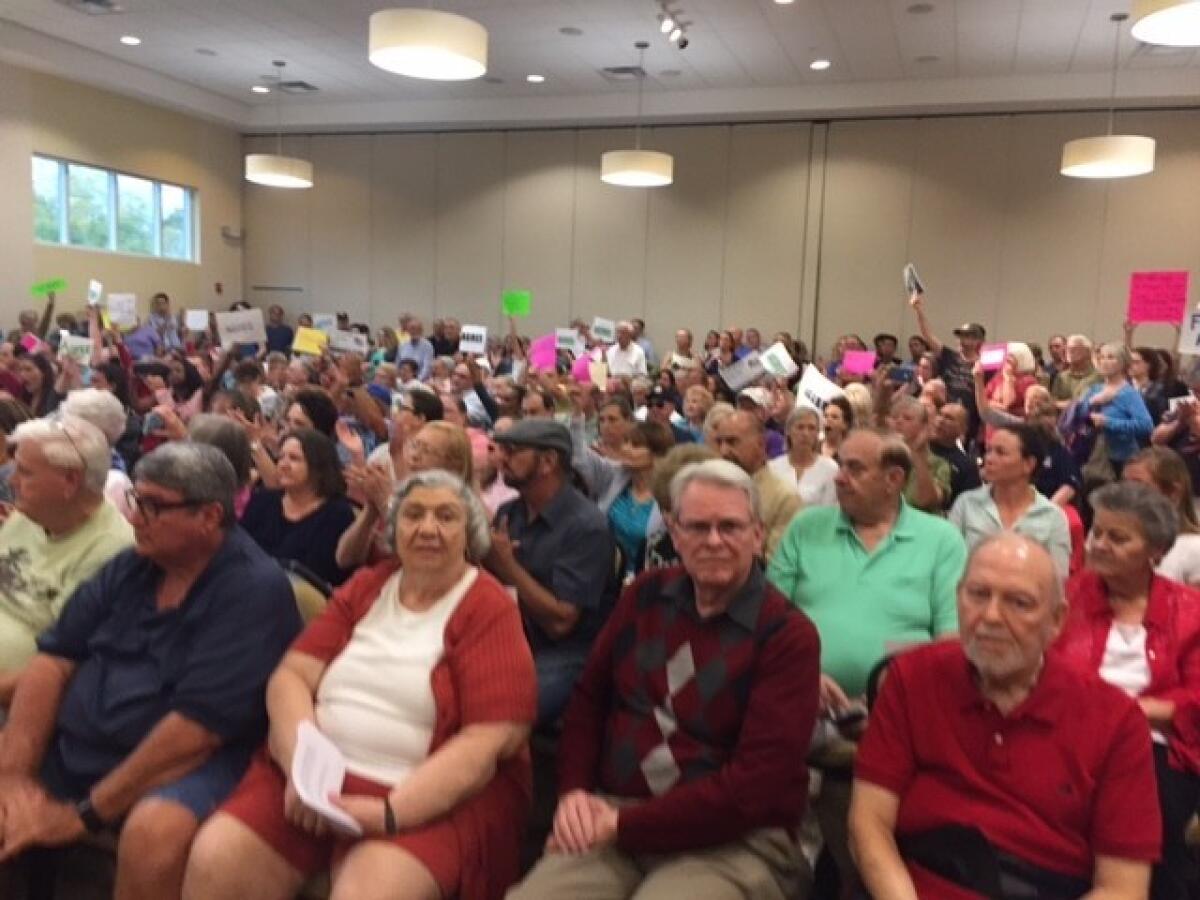
Florida Rep. Dennis A. Ross learned on Tuesday that winning an election with 58% of the vote is no indication of how the crowd will shape up at a town hall.
Appearing before about 250 people and one comfort dog, Ross dodged questions, catcalls and boos.
The Republican answered 21 questions in the 56 minutes he stood before the crowd, pacing back and forth over a large water stain that adorned the carpet at the Clermont City Center.
Most of the constituents posed adversarial questions. Three offered their support (one wished that God bless both Ross and President Trump).
The main topics had a familiar sound to them: keeping the Affordable Care Act, not cutting Social Security benefits, opposing the travel ban and protecting the environment.
Ross stuck to the party script except to say that he didn’t always condone “or defend what the president is saying or tweeting.”
Ross has been a strong supporter of President Trump and attended his rally in Melbourne, Fla., last week. He also served on Trump’s transition team.
Ross was swept into office in 2010 as part of the tea party movement.
The last question -- from a Trump critic -- had three parts: Ross was asked about the expense to taxpayers when the president spends weekends at Mar-a-Lago, the U.S.’ ties to Russia and Trump’s still unseen tax returns.
“This is the first anyone has brought that to my attention,” Ross said of the reported $10 million that it has cost to shuttle Trump between Florida and Washington three times.
The boos were hearty and long, drowning out the rest of Ross’ answer. The congressman was then hustled out the back door to the continual chant of “Do your job.”
- Share via
A town hall in Savannah, Ga., tests its reputation for civility
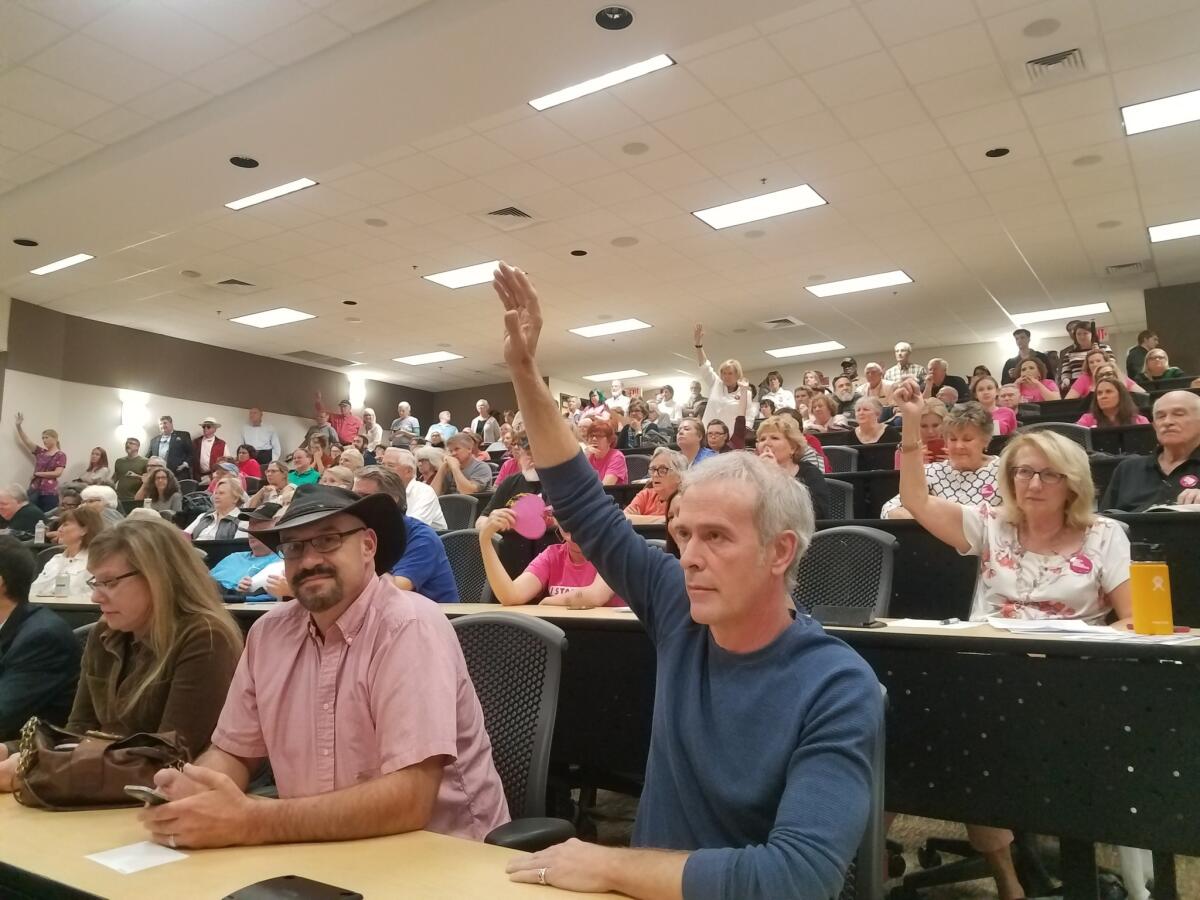
The boos began as soon as Rep. Buddy Carter, a two-term Republican representing a staunchly conservative stretch of coastal Georgia, tried to present his plans to replace the Affordable Care Act.
“You know about the promises and you know about the reality,” Carter told constituents who packed a town hall meeting in Savannah on Tuesday, noting that healthcare premiums had gone up by $4,300 for the average family. “Look, folks, Obamacare is collapsing.”
“You collapsed it!” one man in the audience shot back as the crowd roared.
More than 300 people, many wearing Planned Parenthood T-shirts and waving pink and purple paper hearts, squeezed into an auditorium at Armstrong College for the standing-room-only event. Outside, scores more chanted, “Let us in!”
Throughout, the meeting tested this traditional Southern town’s reputation for gentility, with some members of the crowd jeering and crying, “Shame on you!” while others pleaded for quiet.
“If you’ve got something to say, use your manners and raise your hand,” one Trump supporter burst out.
“Why don’t YOU raise your hand?” a man across the room hollered back.
The crowd’s concerns ran the gamut from rising sea levels and Russia’s influence in U.S. politics to abortion access, President Trump’s attacks on the news media and the teaching of religion in public schools. Some needled Carter for his support of Trump, with one man asking if he stood by a president who had not released his tax returns.
“I am not here to tell you Donald Trump is perfect,” Carter responded. “I am not going to tell you I agree with everything he has done. Those of you who have studied the Bible know that God has used imperfect people to do great things.”
Yet it was Republicans’ plan to repeal the Affordable Care Act that caused the most ire. A local owner of a small jewelry business told Carter that if the act had not been in effect when he had major abdominal surgery a few years ago, he may have had to lay off an employee.
“Look, for every story like this there are 20 stories that are just the opposite,” said Carter, a pharmacist. As Republicans developed a more affordable and accessible healthcare alternative, the new plan would be rolled out incrementally, he said. Health coverage would not be denied because of preexisting conditions, he added.
“These are divisive times,” Carter finally admitted, reminding his audience that “we live in the greatest country in the world.” But even that could not bring agreement. The meeting ended with a chorus of “No!”
- Share via
Supreme Court justices appear split over whether Constitution extends to Mexican teenager shot across the border

The Supreme Court justices debated border shootings and drone strikes Tuesday in a case that could preview the legal battle over President Trump’s proposed ban on foreign travelers from certain Muslim-majority countries.
But the eight justices sounded evenly split over whether the parents of a Mexican teenager can sue the U.S. border agent who shot and killed him as he stood on the Mexican side of the border.
At issue is whether the Mexican family can invoke the Constitution’s protections against excessive force and for due process of law to restrain the conduct of the American agent, or whether U.S. law stops at the border.
- Share via
What’s going on in Sweden?
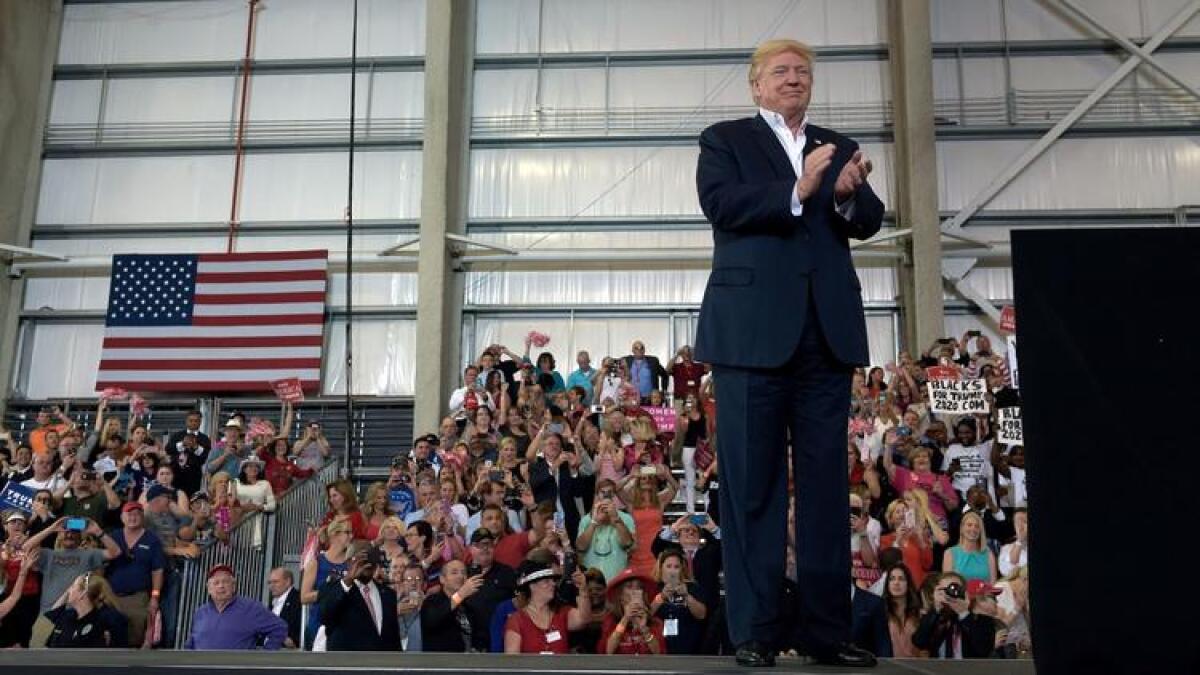
What’s going on in Sweden?
If you ask President Trump, it’s absolute chaos.
“You look at what’s happening last night in Sweden,” Trump, at a rally in Florida on Saturday, said about the Scandinavian country that has accepted large numbers of refugees. “Sweden. They took in large numbers. They’re having problems like they never thought possible.”
Actually, not much happened in Sweden on Friday night. But Monday night, riots broke out in a predominantly immigrant suburb of Stockholm, ensuring that Sweden was in for another cycle through the conservative news spin machine.
Here are some of today’s headlines:
Riots in Sweden. Cars ablaze, rocks thrown after arrest in migrant area (Fox News)
In the hours after a man was arrested for suspected drug charges, violence erupted on Monday evening in Rinkeby, a suburb of Stockholm that has experienced a large influx of refugees. No injuries were reported, yet the headline – prominently displayed on the home page -- does make it appear there was a major disturbance in the area.
The article notes that Trump had been “mocked” for his comments about Sweden days before, and goes on to cite recent crime reports on the country:
“Reports of rapes in Sweden jumped 13% in 2016 compared to the previous year, and reports of sexual assaults were up 20%, according to preliminary data from the Swedish National Council for Crime Prevention.”
There was no linkage made in that report, however, between crime statistics and the presence of refugees in the country.
Breitbart led its website with the headline Sweden: Looting, cars torched,police attacked as riots break out in migrant suburb
“Riots broke out on Monday night in the suburb of Rinkeby, where a majority of residents were born overseas, just hours after the country’s Prime Minister attacked U.S President Donald J. Trump for linking mass migration with rising violence in Sweden,” says the lede of its story, alluding to Swedish Prime Minister Stefan Löfven, who said Monday that facts matter when discussing Trump’s comments about his country.
In other conservative news:
Another Trump campaign rival is making pilgrimage to White House (Daily Caller)
President Trump regularly reminiscences about the 2016 campaign.
Now he’s making an effort to meet with former GOP adversaries.
In the past month, he’s dined with New Jersey Gov. Chris Christie and Sen. Marco Rubio (R-Fla.). This week, Trump is set to meet with Ohio Gov. John Kasich in the Oval Office.
Kasich consistently castigated Trump throughout the Republican primaries and into the general election.
He refused to endorse Trump after he secured the Republican nomination. He boycotted the Republican National Convention in July even though it was in his home state and wrote in Sen. John McCain on his absentee ballot last fall, notes the article.
Trump and the media (American Spectator)
Alas, it seems to be a daily battle.
During the general election, Trump’s prime enemies were Hillary Clinton and the media. Now it’s just the media – some of which he asserts is nothing more than “fake news.” (It is, of course, not new for presidents to battle the press, but Trump does take it to another level.)
“Trump is not wholly right about the “fakeness” of the news he delights in castigating. He is not wholly wrong either,” writes William Murchison.
The piece seeks to find common ground between the media (which often does tilt liberal) and the president.
“The major media’s liberalism — brighter, smokier than in Vietnam-Watergate days — is a problem more intense than when Vice President Spiro T. Agnew, at Richard Nixon’s bidding, lit into the media’s ‘nattering nabobs of negativism,’” he writes.
- Share via
Sweeping new immigration guidelines emphasize more enforcement, deportations
Immigration enforcement officers are free to target any of the 11 million people in the U.S. illegally for removal, the Trump administration said Tuesday, a vast expansion of the federal government’s deportation priorities as the president pursues his promised crackdown on illegal immigration.
The new guidelines, in two memos issued by Homeland Security Secretary John F. Kelly, also call for the hiring of thousands more enforcement agents as the agency moves to implement President Trump’s executive order on immigration issued during his first week in office.
“All of those in violation of immigration law may be subject to immigration arrest, detention and, if found removable by final order, removal from the United States,” the department wrote on its website.
Though the guidelines emphasized that authorities should focus on convicted criminals or those charged with crimes, immigration groups reacted with alarm to what they described a radical shift in policy and enforcement tactics.
“These memos lay out a detailed blueprint for the mass deportation of 11 million undocumented immigrants in America,” said Lynn Tramonte, deputy director of America’s Voice Education Fund, an advocacy group. “These memos amount to an instruction manual for the coast-to-coast, fast-track deportation of everyone in the United States without papers, no matter how long they’ve been here, how strong their family ties, and how much they contribute.”
Under the Obama administration, officials took a far less aggressive stance on immigration, despite deporting a record number of migrants, by focusing on those who were either convicted of multiple offenses or had repeatedly entered the country illegally.
The memos did not specify how the Trump administration plans to deal with 750,000 so-called Dreamers, migrants brought to the country illegally as children and granted work permits, a key Obama administration program.
Trump has publicly wavered on whether to deport the Dreamers, and the White House has identified ways to remove them from the U.S. without Trump’s fingerprints.
The instructions also expand so-called expedited deportations, under which someone who is in the U.S. illegally is detained and thrown out without appearing before an immigration judge. Such deportations, which were limited by the Obama administration to people caught within 100 miles of the border and within two weeks of entering, now include people caught anywhere in the country within two years of arriving illegally.
In addition, the guidelines call for hiring 10,000 more immigration enforcement officers and 5,000 Border Patrol agents and for the immediate planning and building of a wall along the southern border, all of which Trump ordered earlier.
Those steps would require additional funds from Congress, and it is unclear whether Republican lawmakers will sign off on them.
Kelly’s memos also called for the expansion of a program in which local police help capture those violating immigration laws.
Homeland Security will also establish an office to assist those who are victims of crimes committed by those in the country illegally, according to the memos.
Trump administration officials said they were fulfilling the pledge of the president who promised more aggressive enforcement of immigration laws and are also reacting in response to a spike of illegal border crossings.
“A surge of illegal immigration at the southern border has overwhelmed federal agencies and resources and has created a significant national security vulnerability to the United States,” Kelly wrote in one of the memos, adding that immigration courts are experiencing “a historic backlog of removal cases.”
In October and November, the Obama administration apprehended more than 90,000 immigrants along the southern border, an increase of about 42% over the same period in 2015, according to Kelly.
- Share via
Scott Pruitt tries to calm a rattled EPA workforce
Even as the newly installed Environmental Protection Agency chief sought to calm employees anxious about his longtime opposition to the agency, Scott Pruitt managed to rattle them a little more.
Concerns about the direction he will take the EPA grew with publication over the weekend of his first interview as agency chief.
During it, he suggested to the Wall Street Journal that the EPA, which has taken the lead in federal efforts to regulate greenhouse gases, may not even be equipped to be playing much of a role at all.
He left open the possibility that the agency will look for leadership on global warming from the GOP Congress, where there has been a persistent opposition to meaningful climate action and mainstream climate science.
During his first agency-wide address Tuesday, Pruitt focused on his favorite themes of federalism, the need for predictability among regulated industries and the dangers of agency overreach. But he also sought to reassure the staff by remarking repeatedly about how much he values its work.
He expressed admiration for the many employees he met during his first meetings at the headquarters who have been with the agency for decades.
“You can’t lead unless you can listen,” Pruitt said. “I seek to listen, learn and lead with you.” But he also bemoaned the “toxic” nature of modern politics.
Conservatives have accused the EPA of taking actions outside the rule of law in pursuit of a liberal environmental agenda. That’s not how many employees of the 15,000-person agency view their work over the last several years. Their relationship with the new boss is certain to be tense. Just before Pruitt was confirmed Friday, 773 former employees signed a letter urging the Senate to reject him.
On Monday, Greenwire reported that Pruitt, a frequent target of protesters, is requesting round-the-clock security protection from the Secret Service. The protests may only intensify as Pruitt sets about dismantling the last administration’s work on the environment.
“John Muir is rolling over in his grave at the notion of someone as toxic to the environment as Scott Pruitt taking over the EPA,” Sierra Club Executive Director Michael Brune said after Tuesday’s speech.
- Share via
Trump, after failing to denounce anti-Semitism, calls threats to Jews ‘horrible’ and ‘painful’
President Trump, under pressure for his reluctance to address a recent spike in anti-Semitic threats, condemned them in forceful terms Tuesday during a visit to the National Museum of African American History and Culture in Washington.
Trump spoke effusively about his tour of the new African American museum on the National Mall, calling it a “meaningful reminder of why we have to fight bigotry, intolerance and hatred in all of its very ugly forms.”
He linked that lesson to bomb threats lodged against dozens of Jewish community centers around the country in recent weeks.
“The anti-Semitic threats targeting our Jewish community and community centers are horrible and are painful and a very sad reminder of the work that still must be done to root out hate and prejudice and evil,” he continued.
The comments came shortly after a tweet by his former rival, Hillary Clinton, calling on Trump to speak out.
Trump grew defensive when asked about the subject during a news conference last week, calling a question about how the government would respond “insulting” and telling an Orthodox Jewish reporter who asked it to sit down.
Trump reacted as though the allegation of anti-Semitism was directed at him, even though the reporter who asked it emphasized that it was not.
“I hate the charge,” Trump said. “I find it repulsive.”
- Share via
Trump names H.R. McMaster, an Army strategist, as his new national security advisor
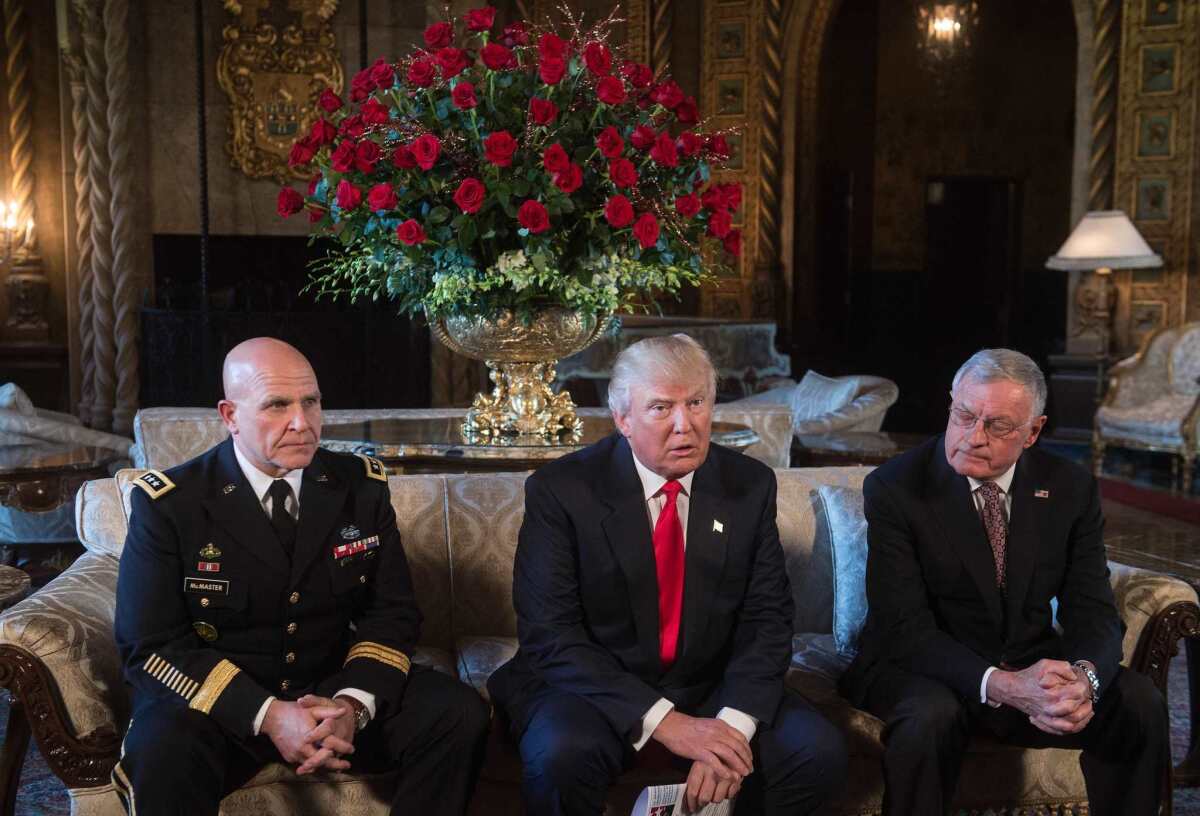
President Trump named Army Lt. Gen. H.R. McMaster as his new national security advisor Monday, replacing Michael Flynn, who was forced to resign last week.
McMaster, a career Army officer and strategist, is known as one of the military’s most prominent intellectuals.
“He is highly respected by everyone in the military, and we’re very honored to have him,” Trump said of McMaster in making the announcement while seated in the living room at Mar-a-Lago, his estate here, between a uniformed McMaster and Keith Kellogg, who had been interim national security advisor.
Kellogg will return to his previous role as chief of staff to the jobholder, now McMaster.
McMaster will take over a National Security Council that is short on staff and the subject of reports of internal turmoil. The president’s chief strategist, Stephen K. Bannon, was given a seat on the council, a highly unusual move for a political appointee.
Bannon was an architect of the temporary ban on entry into the U.S. for refugees and travelers from seven majority-Muslim countries whose ad hoc rollout sowed chaos at airports around the country before it was stopped by the courts. Trump is expected to order a revised travel ban as soon as this week.
Flynn’s ouster came after reports emerged that he had lied to Vice President Mike Pence about his discussions in December with the Russian ambassador to the U.S. about impending sanctions by the Obama administration over its conclusion that Russia had meddled in the election.
McMaster has served since July 2014 as director of the Army Capabilities Integration Center at Ft. Eustis in Virginia.
He is perhaps best known as the author of a 1997 book, “Dereliction of Duty,” that explores the military’s responsibility for U.S. failure during the Vietnam War.
“What a privilege it is to be able to continue serving our nation,” McMaster said alongside Trump. “I’m grateful to you for that opportunity, and I look forward to joining the national security team and doing everything that I can to advance and protect the interests of the American people.”
Trump also said that John R. Bolton, the former ambassador to the United Nations under President George W. Bush, who also interviewed for the job, will serve the administration in an unspecified capacity.
1:01 p.m.: The story was updated with comment from McMaster.
- Share via
Pence ‘disappointed’ by Flynn but supports Trump’s handling of ouster
Vice President Mike Pence said Monday he was “disappointed” to learn he had been misled by Michael Flynn, the ousted national security advisor, but that he believed President Trump handled the situation correctly.
Pence’s comment, made during a visit to Brussels, was his first public reaction to Flynn’s forced resignation a week ago.
Before Trump took office, Pence, based on Flynn’s assurances, went on national television to assert that Flynn had not discussed U.S. sanctions with the Russian ambassador to Washington, Sergei Kislyak, in December. It emerged that Flynn had in fact done so.
“I was disappointed to learn that the facts that had been conveyed to me by Gen. Flynn were inaccurate,” the vice president said at a joint news conference with the NATO secretary-general, Jens Stoltenberg.
He added: “I fully support the president’s decision to ask for his resignation” but praised Flynn’s service to the country.
Pence was not told about the discrepancy in Flynn’s account until weeks after the White House was informed by the Justice Department that intercepts of Flynn’s conversations with the ambassador did not back up his claims.
The vice president did not directly address a reporter’s question as to whether he felt “left out of the loop” because of that time lag, and whether he had been assured by Trump’s team that something like that wouldn’t happen again.
“I’m very grateful for the close working relationship I have with the president,” Pence said. Trump’s decision, he said, “was handled properly, and in a timely way.”
The vice president was in Brussels as part of a concerted effort in recent days to calm European officials alarmed over Trump’s professed affinity for Russian President Vladimir Putin and the extent of Trump’s backing for European institutions such as the EU, which is based in Brussels.
Pence, following a meeting with European Council President Donald Tusk, expressed the “strong commitment of the United States to continued cooperation and partnership with the European Union.”
Tusk thanked him for that sentiment, but noted that “much has happened over the past month in your country,” referring to the period since Trump took office.
“Too many new and sometimes surprising opinions have been voiced over this time about our relations, and our common security, for us to pretend that everything is as it used to be,” he said.
- Share via
Treason! Why the provocative accusations against Trump and his aides are unlikely to go anywhere
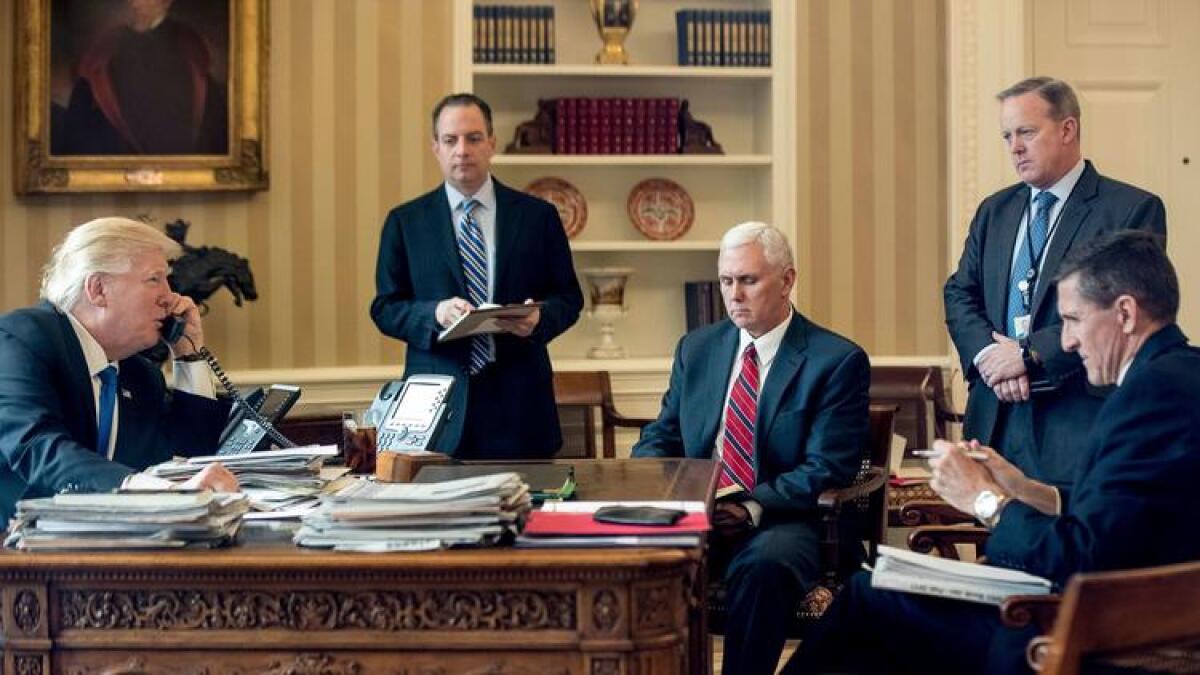
The word is hurled like a thunderbolt: Treason!
There are few more serious charges than taking up the cause of America’s enemies and colluding to undermine the country from within.
Yet that very accusation has been leveled against President Trump by some of his most fevered critics. They cite, among the particulars, the president’s evident high regard for his Russian counterpart, Vladimir Putin, and Russia’s meddling in the 2016 election, which helped Trump and badly undermined Democrat Hillary Clinton.
It’s not just left-wing celebrities like film director Michael Moore who are wielding the T-word. Rep. Seth Moulton, a Massachusetts Democrat and Iraq war veteran, used it during a CNN interview.
“If members of the administration are essentially conspiring with Russia … that’s the definition of treason,” Moulton said. “This is a very, very serious affair.”
- Share via
Defense Secretary Mattis arrives in Iraq and makes clear the U.S. is not there to take oil
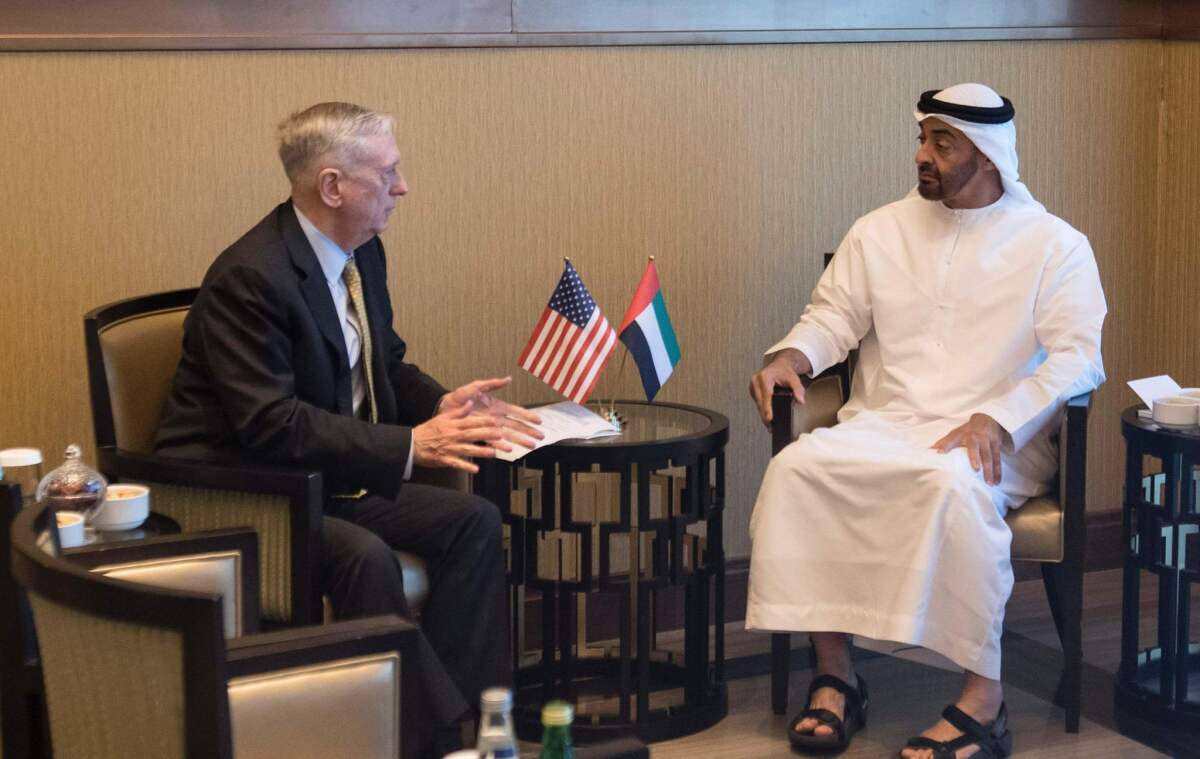
Defense Secretary James N. Mattis made an unannounced visit to Iraq’s capital on Monday to reassure allies of the U.S. military’s commitment to support the sprawling operation to recapture the city of Mosul from entrenched Islamic State militants.
Ahead of the trip, however, Mattis made clear he did not advocate President Trump’s oft-stated wish to take Iraq’s oil.
Such an undertaking would be illegal and require decades of occupation by hundreds of thousands of troops, and likely cost more money than could be earned from the oil.
“All of us … in America have generally paid for our gas and oil all along and I’m sure we will continue to do so in the future,” Mattis said. “We’re not in Iraq to seize anybody’s oil.”
Trump, as a candidate and as president, has repeatedly said that the U.S. should have “taken Iraq’s oil,” including at CIA headquarters on just one day after his inauguration last month.
“The old expression, ‘to the victor belong the spoils’ — you remember,” he said. “I always used to say, ‘Keep the oil.’ I wasn’t a fan of [the war in] Iraq. I didn’t want to go into Iraq. But I will tell you, when we were in, we got out wrong....
“If we kept the oil, you probably wouldn’t have ISIS because that’s where they made their money in the first place. So we should have kept the oil. But OK. Maybe you’ll have another chance. But the fact is, should have kept the oil,” he said, using an acronym for Islamic State, the militant group that seized oil fields in Iraq and Syria and sold their output on the black market.
Iraq’s economy is nearly entirely reliant on oil and it remains the lifeblood for Iraqi Prime Minister Haider Abadi’s fragile government as it tries to provide basic services to citizens and maintain the nation’s aging infrastructure.
Legal experts have said the U.S. seizure of Iraqi oil would have violated decades of international law, including the Geneva Conventions.
When Mattis stepped off the C-17 cargo plane Monday morning, it marked his first return to the war-torn country where he spent years in combat as a Marine Corps officer before retiring as a four-star general in 2014.
He’s set to have face-to-face talks with Abadi and other senior Iraqi government officials, whom he called “our partner in this fight” against Islamic State. Iraqi ground forces began the assault Sunday to retake Mosul, Iraq’s second-largest city.
The operation, backed by U.S. air power and special forces, is expected to take months.
“We’re going to make certain that we have good shared situational awareness of what we face as we work together, fight alongside each other to destroy ISIS,” Mattis told reporters Sunday before the trip.
Iraq is also one of seven countries named in Trump’s temporary ban on travelers that was put on hold by the courts. Trump’s ban caused anger in Iraq, where members of parliament considered retaliating by refusing to grant visas for U.S. nationals.
While the Trump administration intends to issue another version of the ban, Mattis said he was promised that it would shield the thousands of Iraqi interpreters, advisors and others who have assisted the American military in Iraq.
“Right now, I am assured that we will take steps to allow those who have fought alongside us, for example, to be allowed in to the United States,” Mattis said. “They will be vetted obviously by their performance on the battlefield beside us.”
- Share via
Senate committee asks White House and others to retain records related to Russia investigation
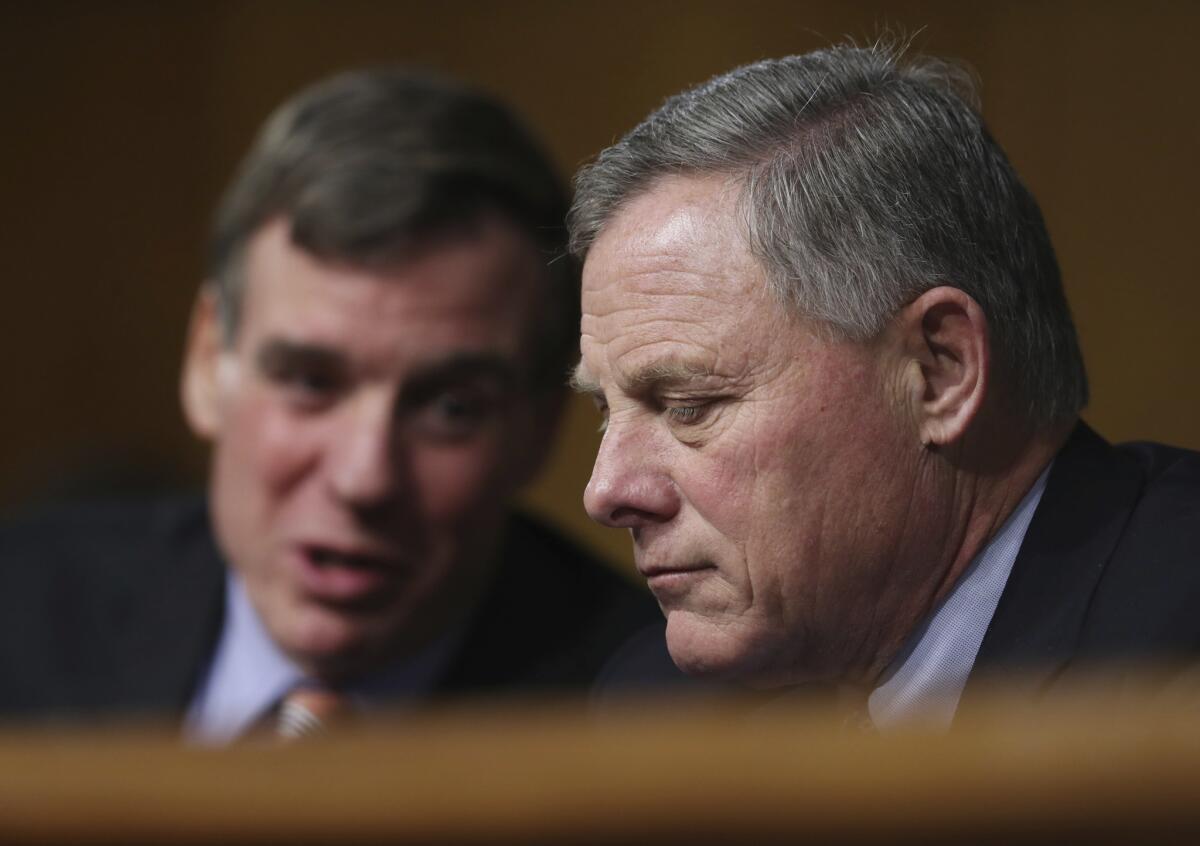
The Senate Intelligence Committee has sent formal requests to more than a dozen organizations, agencies and individuals, asking them to preserve all materials related to the committee’s investigation into Russian interference in the 2016 election and related issues, according to a congressional aide.
The committee chairman, Sen. Richard Burr (R-N.C.), and vice chairman, Sen. Mark Warner (D-Va.), sent letters Friday, the same day committee members received a classified briefing from FBI Director James B. Comey. Committee members declined to comment on what was discussed after the more than hourlong briefing.
The aide was not authorized to discuss the issue publicly and spoke only on condition of anonymity.
On Thursday, Senate Democrats wrote the White House and law enforcement agencies seeking assurances that they were preserving all materials related to contacts individuals associated with President Trump had with Russians.
Those letters asked for confirmation that the White House, FBI and Justice Department had instructed their employees to preserve all materials related to any contacts Trump’s administration, campaign, transition team — or anyone acting on their behalf — have had with Russian government officials or its associates.
White House Chief of Staff Reince Priebus said that as long as committee members “do their job, and we cooperate with them, they’ll issue a report, and the report will say there’s nothing there.”
- Share via
White House denies any collusion between the Trump campaign and Russia
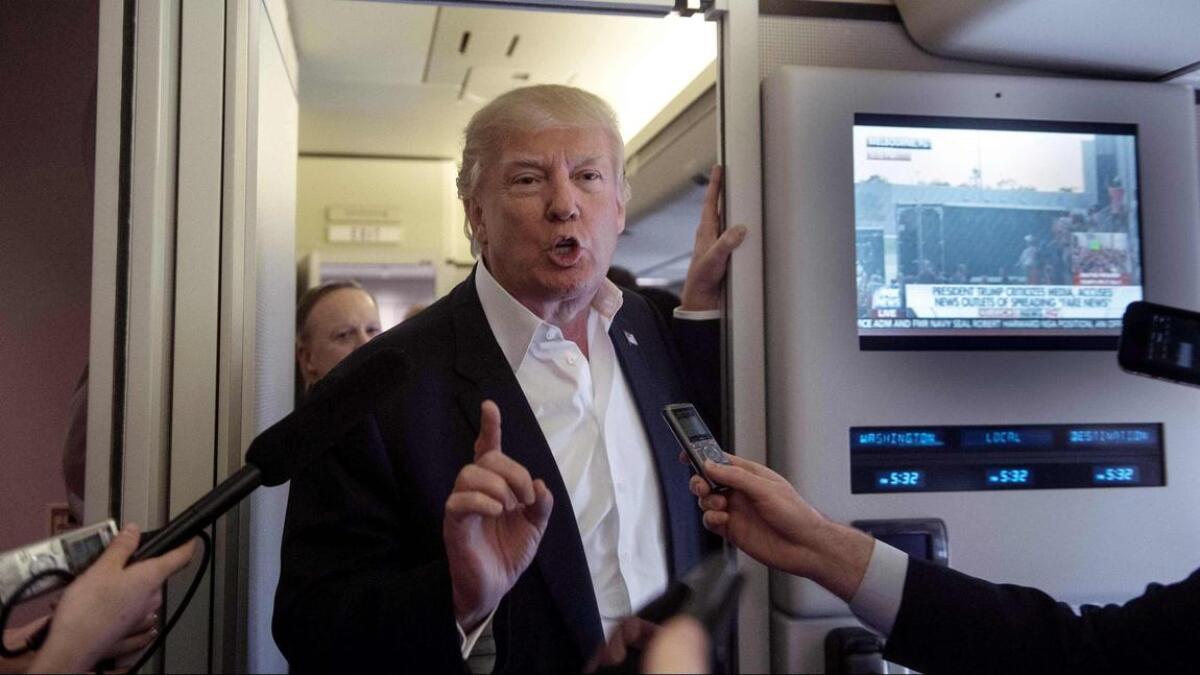
As questions deepened about ties between President Trump’s administration and Vladimir Putin’s Russia, White House Chief of Staff Reince Priebus flatly denied Sunday that the two camps colluded during the 2016 presidential campaign.
Priebus, in a series of news show interviews, also insisted that ousted national security advisor Mike Flynn had done nothing illegal in discussing sanctions against Russia with the country’s ambassador to Washington prior to Trump’s inauguration, and batted aside questions about disorder and disarray in the White House.
Priebus, who was not on Trump’s campaign, has previously said he could not speak to any involvement with Russia by campaign staff. But asked on “Fox News Sunday” whether there was collusion “between anybody involved with Trump and anybody involved with Russia” during the campaign, he replied: “No.”
He was somewhat more equivocal in a separate interview on NBC’s “Meet the Press” when asked about a New York Times article last week that alleged contacts between the Trump campaign and Russian operatives. U.S. intelligence assessments have said Russia interfered in the election with the aim of aiding Trump.
- Share via
Other presidents have battled the press. But never like Trump
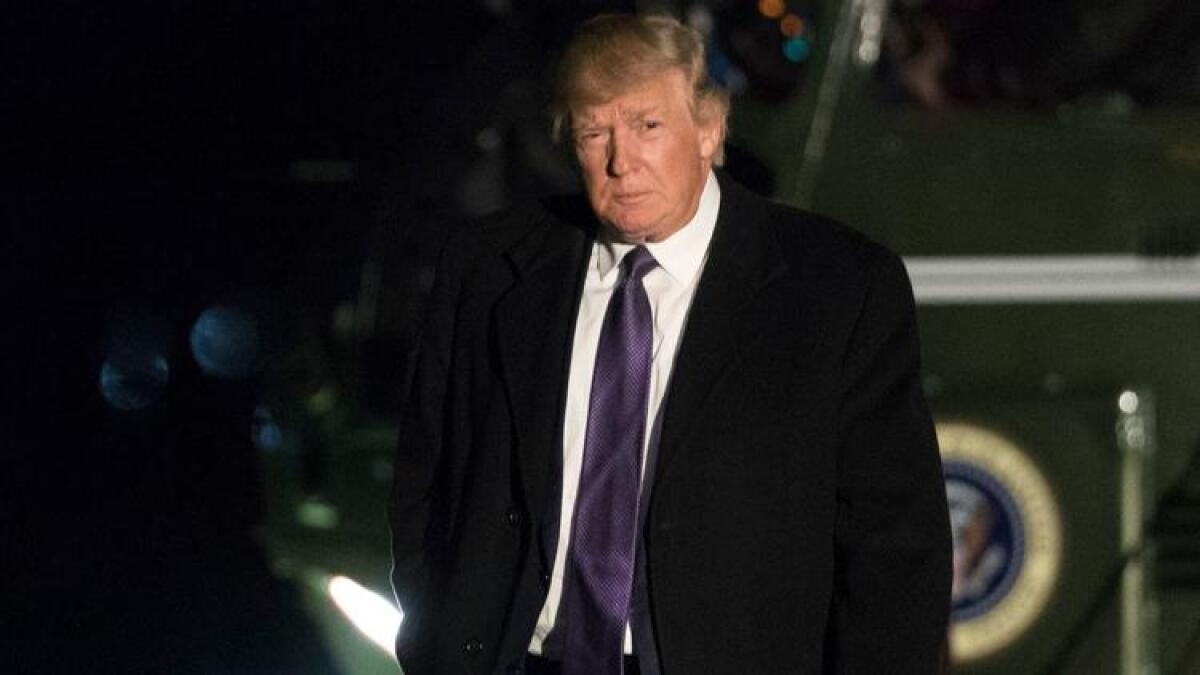
He’s not the first president to have issues with the press — Thomas Jefferson and Abraham Lincoln had complaints too — but President Trump has taken his battle with the media to new heights and made his complaints unusually public and caustic.
How that will play out is anybody’s guess, though there’s an adage about the power of journalism: Never pick fights with someone who buys ink by the barrel. That, however, was before Twitter and video made ink unnecessary for communicating with the public.
The president continued his attacks on the media at a Florida rally Saturday, saying he wanted to speak with supporters “without the filter” of the press.
“They don’t get it,” Trump said through whistles and applause from attendees inside a crammed airport hangar.
- Share via
Homeland Security secretary drafts aggressive guidelines to carry out Trump’s immigration orders
The Department of Homeland Security has drafted broad new guidelines to more aggressively capture and deport people living in the country illegally, a U.S. official said, bringing President Trump’s vision of tougher immigration enforcement a step closer to reality.
The guidelines, which largely follow up on directives that Trump laid out in executive orders in his first week in office, were contained in memos signed Friday by Homeland Security Secretary John F. Kelly. The White House is reviewing the memos and may request changes, the official said.
“A surge of illegal immigration at the southern border has overwhelmed federal agencies and resources and has created a significant national security vulnerability to the United States,” Kelly wrote.
In October and November, more than 90,000 immigrants were apprehended along the southern border under Obama administration priorities for deporting people who had recently crossed into the U.S. illegally and were close to the border, an increase of about 42% over the same period in 2015, according to Kelly.
Under the proposed guidelines, Kelly wrote, the department will seek to hire 10,000 more enforcement agents and 5,000 Border Patrol officers, which Trump called for in his earlier executive orders strengthening immigration enforcement.
The department “shall immediately begin planning, design, construction and maintenance” of a wall along the southern border, Kelly wrote, underscoring another directive in the order signed by the president. Trump has repeatedly called for such a wall to help deter the flow of immigrants.
Department officials will prioritize the removal of immigrants, focusing first on those who have been convicted and charged with crimes, have committed fraud or have not complied with orders to leave the country, Kelly wrote.
“Criminal aliens have demonstrated their disregard for the rule of law and pose a threat to persons residing in the United States,” Kelly wrote.
Trump’s orders also greatly expanded the number of people who are considered priorities for deportation: up to 8 million of the 11.1 million people in the U.S. illegally.
Among them are people who haven’t been charged with a crime but are suspected of committing “acts that constitute a chargeable criminal offense.” That would include the 6 million people believed to have come into the U.S. without passing through a designated border crossing.
Kelly’s memos said the Homeland Security Department will also create an office to assist those who are victims of crimes committed by those in the country illegally, and will seek to expand partnerships with local police agencies to help nab people in the country illegally.
- Share via
Defense Secretary Mattis breaks with Trump on declaring that media are ‘enemy of the American people’
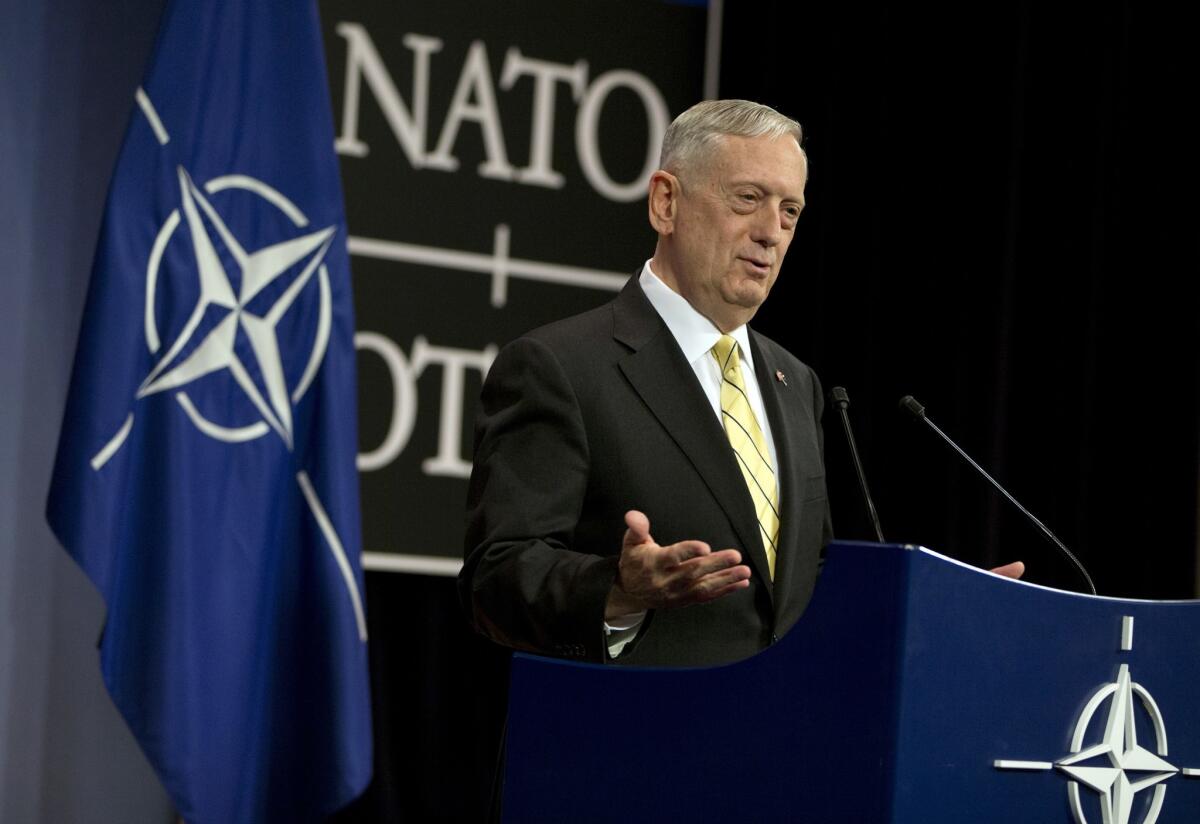
Defense Secretary James N. Mattis said Sunday that the media is not the “enemy of the American people,” refusing to align with President Trump’s startling declaration last week.
“I’ve had some rather contentious times with the press,” he said in response to a question about whether he saw the media as an enemy. “But no, the press is a constituency -- as far as I’m concerned -- that we deal with and I don’t have any issues with the press, myself.”
On Friday, Trump tweeted that the “fake news” media was an “enemy of the American people.” An initial tweet mentioning CNN, the New York Times, NBC and “many more” was deleted and reposted, expanding the list to include ABC and CBS.
Trump repeated the attack Saturday before thousands of cheering supporters in Melbourne, Fla., when he blamed the media for undermining his administration.
“I also want to speak to you without the filter of the fake news,” Trump said at the rally. “They’ve become a big part of the problem. They are part of the corrupt system.”
The fledgling Trump White House has been besieged with setbacks, including the resignation of Trump’s national security advisor, Michael Flynn, after just three weeks amid a deepening controversy over Russian interference in the U.S. government.
In response, Trump has declared a new round of battle with journalists. He called the media “fake” roughly 20 times Thursday in a rambling 77-minute news conference that also took aim at leaks from the intelligence community of classified information about Flynn’s secret talks with a Russian ambassador in December, while the Obama administration was still setting U.S. foreign policy.
Mattis insisted that the upheaval in the administration was not debilitating.
“Welcome to democracy,” he said. “It’s at times wildly contentious. It’s at times quite sporting, but the bottom line is this is the best form of government that we can come up with.”
Gen. Tony Thomas, commander of the U.S. military’s Special Operations Command, said at a military conference on Tuesday that the chaos should stop.
“Our government continues to be in unbelievable turmoil,” he said. “I hope they sort it out soon because we’re a nation at war.”
When asked about those comments, Mattis said that Thomas was “taken a bit out of context because we all want to see everything moving smoothly.”
“The military’s job is to hold the line, and to hold the line, and to hold the line, while our government sorts out the way ahead, and our people speak,” he said.
- Share via
Defense Secretary James Mattis says U.S. air forces heavily involved in Mosul operation

U.S. special forces are operating near the front lines in the battle to retake western Mosul from Islamic State, but Defense Secretary James N. Mattis said Sunday during a visit to Arab allies here that there has been no change to rules of engagement regarding U.S. forces’ role in the Iraqi operation since President Trump took office.
Mattis plans to present the White House with a more aggressive plan to combat Islamic State by month’s end, but he acknowledged Sunday that U.S. airstrikes pounded Islamic State targets in western Mosul in the days ahead of the Iraqi assault, hitting militant command and control facilities.
The multinational coalition led by the U.S. has conducted more than 10,000 airstrikes against Islamic State targets in Iraq, the Pentagon said, while more than 70,000 Iraqi forces have been trained and equipped.
“The isolation phase has been going on for some time now,” Mattis said. “The attack into the city is something I don’t want to get into details about because I owe confidentiality to the troops who are actually making the attack.”
U.S. pilots say the airspace above west Mosul is thick with aircraft. At any given time, up to 50 warplanes are flying in an increasingly compressed area.
- Share via
Trump basks in cheers at Florida rally and takes aim at the media
President Trump returned to campaign mode Saturday with a clear opponent in mind: the media, declaring before thousands of cheering supporters that “fake news” was undermining his nascent administration’s accomplishments.
The White House was running “so smoothly,” Trump said in an airport hangar here. He said the rally was about sharing “our incredible progress in making America great again.”
“I also want to speak to you without the filter of the fake news,” he said. “They’ve become a big part of the problem. They are part of the corrupt system.”
- Share via
Here are some of the times Trump complained about a president using Air Force One to campaign
President Trump touched down Saturday in central Florida for what he has labeled a “Make America Great Again Rally,” hosted by his campaign years before the first votes are to be cast in another White House race.
Trump arrived here on Air Force One after a short flight from West Palm Beach, where he is spending a third consecutive weekend at his Mar-a-Lago estate, dubbed the “Winter White House.”
That means that while his campaign organization bears many of the costs for the event, taxpayers will be on the hook for some of the politicking, too. And it wasn’t long ago that Trump himself was complaining loudly about the same thing.
Here are just a few examples from the 2016 campaign, when President Obama was campaigning for Hillary Clinton, and earlier campaign cycles.
- Share via
Homeland Security secretary: Trump is working on a streamlined travel ban
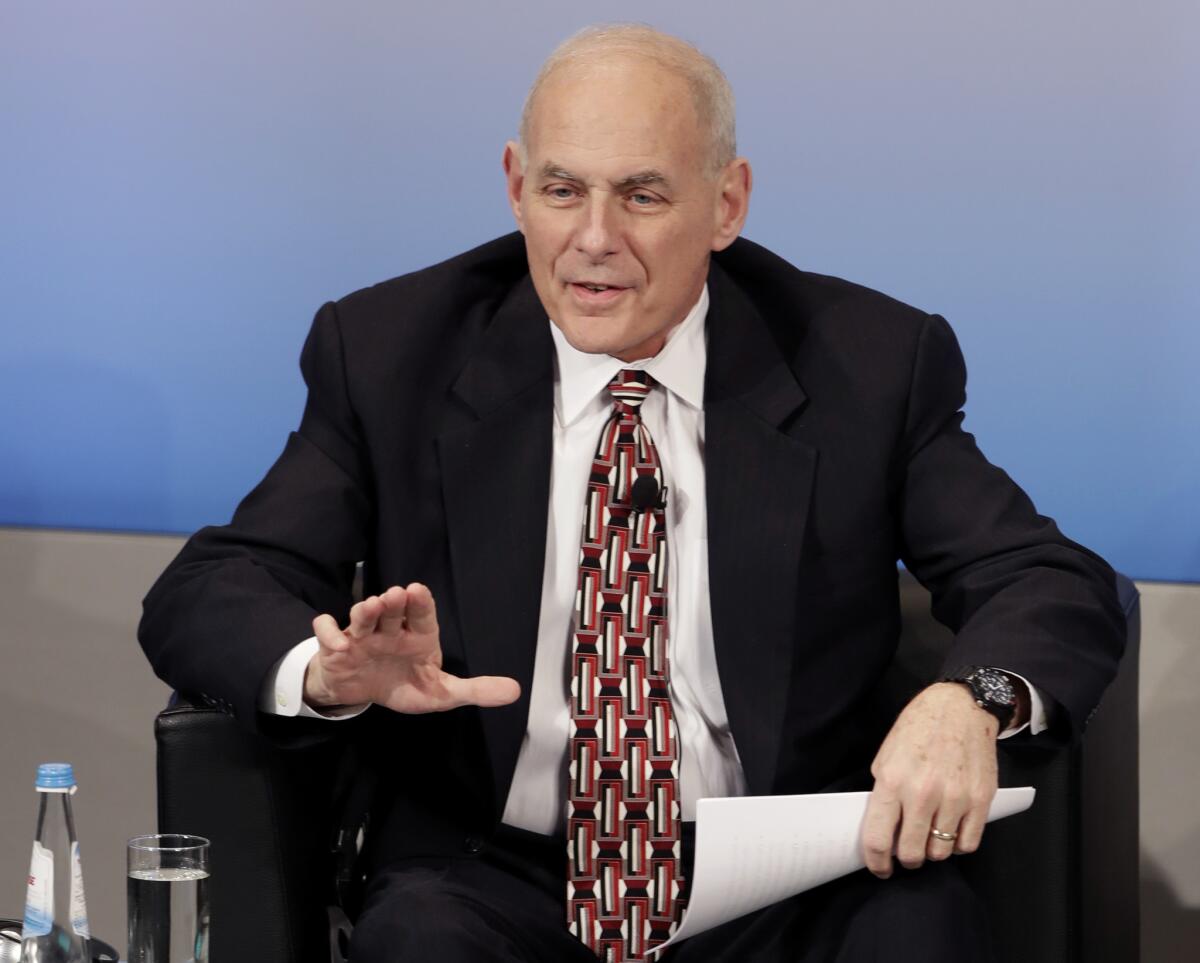
President Trump is working on a “streamlined” version of his executive order banning travel from seven predominantly Muslim nations to iron out the difficulties that landed his first order in the courts, Homeland Security Secretary John Kelly said Saturday.
Speaking at the Munich Security Conference in Germany on a panel about combating terrorism, Kelly said Trump’s original order was designed as a “temporary pause” to allow him to “see where our immigration and vetting system has gaps — and gaps it has — that could be exploited.”
He said the Trump administration was surprised when U.S. courts blocked it from implementing the executive order, and now “the president is contemplating releasing a tighter, more streamlined version” of the travel ban.
Kelly said this next time he will be able to “make sure that there’s no one caught in the system of moving from overseas to our airports.”
Asked whether that meant Trump’s new executive order would allow people with green cards and visas to come into the United States, Kelly said “it’s a good assumption.”
But he went on to say that only people with visas who were already in transit would be allowed in. For others, he said, “we will have a short phase-in period to make sure that people on the other end don’t get on airplanes.”
He did not elaborate on whether this would apply to green card holders as well.
- Share via
Trump said he would isolate his family businesses, but they have already seeped into the White House
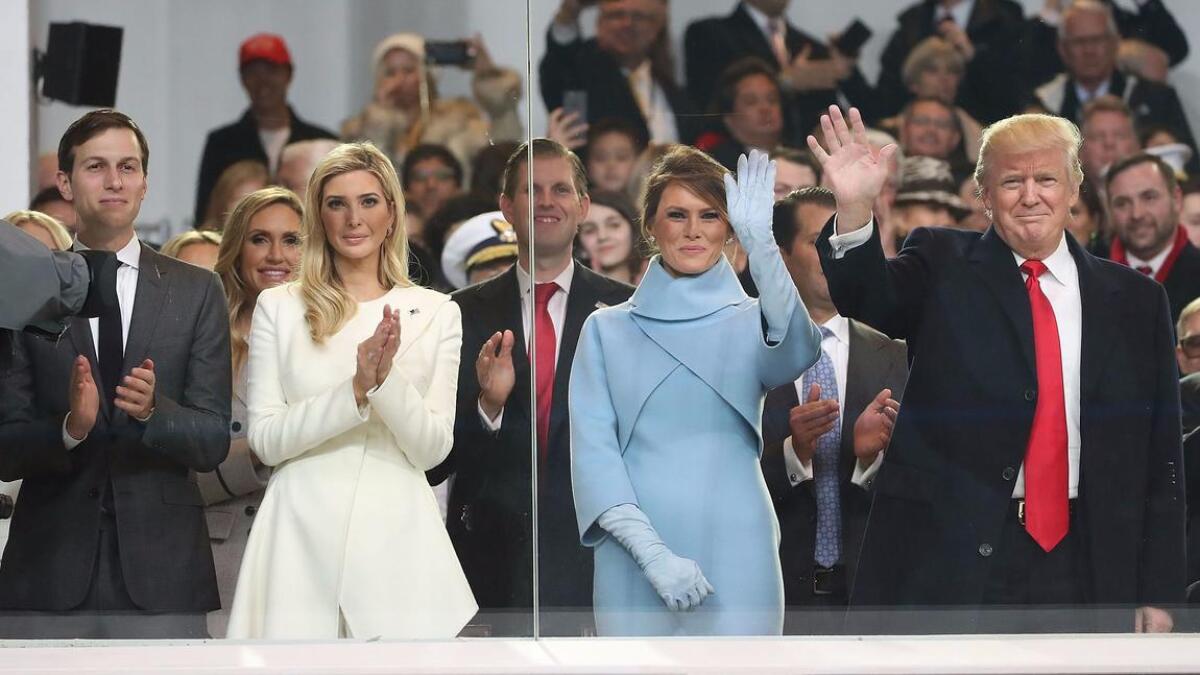
Twenty-four hours before taking the oath of office, President Trump strutted into the presidential ballroom of the Trump International Hotel to toast congressional leaders, top donors and the people he had picked to fill out his Cabinet.
Trump joked that “a total genius must have built this place,” underscoring the message: He would make little effort to separate his presidency from his identity as a business tycoon.
Less than a month in, his intentions are even clearer. The ethics firewall built by Trump’s attorneys already has failed to prevent complications from his family’s businesses from seeping into the presidency.
- Share via
Trump called ‘fake news’ media an enemy of the American people. Here’s what else has made the public enemies list
President Trump tweeted Friday that the “fake news” media was an “enemy of the American people.” An initial tweet mentioning CNN, the New York Times, NBC and “many more” was deleted and reposted, expanding the list to include ABC and CBS.
Trump has had a long-standing issue with the press. While campaigning, he created a blacklist of seven news organizations that were banned from receiving media credentials. And during his first solo news conference Thursday, he called the media “fake” roughly 20 times.
But this marks the first time as president that he publicly referred to the media as an “enemy.”
Historian Michael Beschloss reminded people on Twitter that in 1972, President Nixon told Henry Kissinger on tape that “the press is the enemy, the establishment is the enemy, the professors are the enemy.” Nixon’s enemies list included several journalists and news organizations, among others.
But that list wasn’t made public until the Watergate hearings in 1973. Typically, government “enemies” are characters of a different sort.
Here are some others who’ve earned the distinction:
- Depression-era mob boss John Dillinger became the first “Public Enemy Number One” when former FBI director J. Edgar Hoover brought the term into the mainstream. Hoover’s list of public enemies also included Bonnie and Clyde and civil rights activist the Rev. Martin Luther King Jr.
- Paul Newman made Nixon’s enemies list. He was in the company of several other directors and Hollywood types, as well as politicians, social activists and members of the media.
- In 1998, President Clinton declared Osama bin Laden America’s top public enemy.
According to a Gallup poll taken last February, Americans view the United States’ main enemies as North Korea, Russia, China, Iran and countries in which Islamic State militants are operating.
- Share via
Trump turns optimistic during visit to Boeing plant in South Carolina: ‘I will never, ever disappoint you’
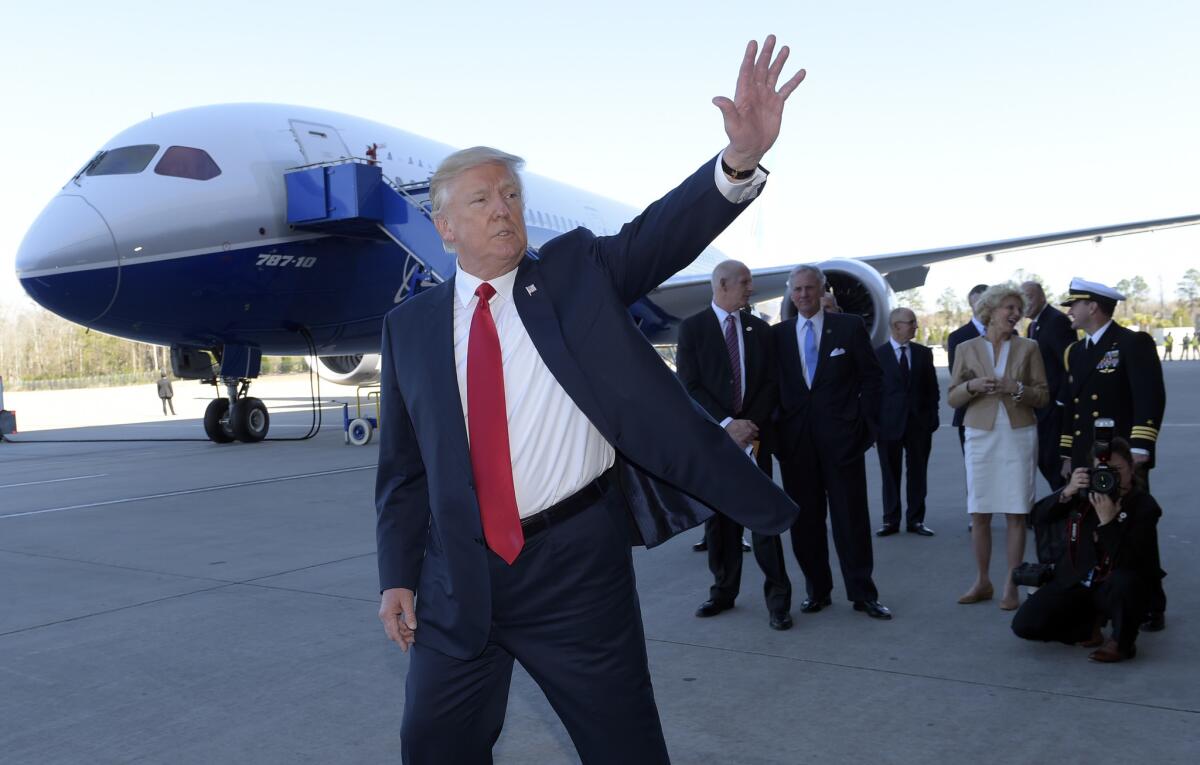
President Trump returned Friday to the themes that secured his electoral victory, praising the contributions of American workers and pledging to lead a resurgence of manufacturing across the country.
Speaking at a Boeing plant in North Charleston, S.C., with a 787 Dreamliner parked behind him, Trump said he had come to celebrate “jobs, jobs, jobs.”
“My focus has been all about jobs, and jobs is one of the primary reasons I’m standing here today as your president,” Trump said. “I will never, ever disappoint you, believe me, I will not disappoint you.”
A day after a sharply negative and often hostile news conference at the White House, Trump adopted a far more optimistic tone in South Carolina, a state he resoundingly won during the presidential primaries and in the general election.
He spoke of expanding the reach of the American dream and unleashing the “American spirit”; there was little reference to the “carnage” he discussed in his inaugural address less than a month ago or the “mess” he repeatedly cited in Thursday’s news conference.
“That’s what we do in America — we dream things and then we build them,” he said at one point, adding later: “Working together … there is nothing we cannot accomplish, no task too large, no dream too great, no goal beyond our reach.”
Much as he did in the campaign, Trump ticked off his recipe for expanding manufacturing: penalties for those taking jobs out of the country, fewer regulations, lower taxes on businesses and a fight against what he called “extreme cheating” by other countries.
“Since November, jobs have already begun to surge,” he said, taking some credit for gains made under his predecessor that Trump said derived from his election win.
“We will see more and more of that across the country.”
Trump did not mention the decision by workers at the plant on Wednesday to turn aside an organizing effort by the International Association of Machinists and Aerospace Workers.
The South Carolina operation has more than 7,500 employees and contributes to more than 100,000 jobs in the state, Boeing spokesman Gordon Johndroe said. The facility at which Trump spoke makes, assembles and installs parts of the Boeing 787’s fuselage.
The visit to the Boeing facility kicked off a weekend for Trump that will mix work and campaigning, with a rally scheduled Saturday in Melbourne, Fla.
White House officials said Friday that while at his Mar-a-Lago estate in Palm Beach, Trump may meet with new candidates for the role of national security advisor.
Trump fired his first pick, retired Gen. Mike Flynn, after it became publicly known that Flynn had misled Vice President Mike Pence about details of a phone call made to the Russian ambassador in December. His second selection, retired Vice Adm. Bob Harward, turned down the job this week.
- Share via
After bruising battle, EPA nominee Scott Pruitt confirmed by Senate
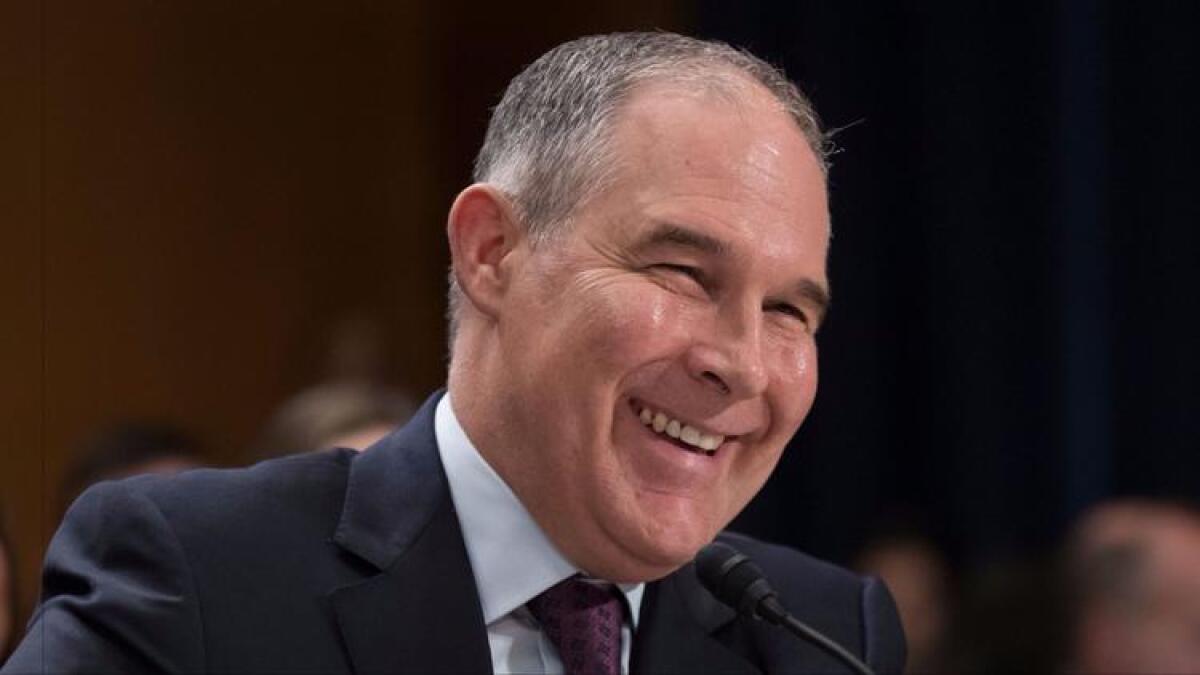
Donald Trump’s nominee to run the Environmental Protection Agency, a climate-change skeptic who for years has been been an ardent critic of the department he will now lead, got final Senate approval Friday after a prolonged assault from environmentalists.
The nomination of former Oklahoma Atty. Gen. Scott Pruitt for the post has been one of the most bitterly fought since Trump took office last month, pitting a crusader for fossil fuel interests who has sued the agency 14 times against an environmental movement that is scrambling to preserve what it can of actions President Obama took to curb climate change and protect natural resources.
Democrats held the Senate floor overnight into Friday urging colleagues to join them in opposing Pruitt — or at least to support their efforts to delay the vote. Their pleas came as a judge in Oklahoma issued an order for Pruitt to turn over thousands of email exchanges with oil and gas companies he has long kept secret. Those documents are to be made public starting Tuesday.
But Republican leaders, emboldened by the expressed support for Pruitt by two politically vulnerable Senate Democrats from coal country, would not delay the vote, which was 52-46.
- Share via
Here’s why the 2018 Senate election will be crucial for President Trump and his Democratic foes
In the partisan battle zone that is Washington, D.C., there is one conquest that could turn the fight decisively in Republicans’ favor: winning 60 seats in the U.S. Senate.
With control of the House, a filibuster-proof Senate majority could empower President Trump and his congressional allies to push through legislation and approve high-level appointees, such as Supreme Court nominees, with Democrats in the minority powerless to stop them.
That is why the 2018 midterm election is shaping up as crucial for Trump and congressional Republicans, as well as Democrats fighting to protect President Obama’s legacy and hold the line on further GOP advances.
After Democrats netted two seats in the Senate last year, Republicans hold a 52-48 majority, meaning the GOP would need a gain of eight seats to reach a filibuster-proof margin.
(That assumes party lawmakers stick together and vote as a bloc, which is never a certainty, as demonstrated by the withdrawal Wednesday of Trump’s nominee to head the Labor Department, Andrew Puzder, in the face of Republican opposition.)
So what are the odds?
- Share via
McConnell says he’s ‘very sympathetic’ to ‘Dreamers’ as Trump weighs what to do with young immigrants
As President Trump wrestles over what to do with young immigrants in the U.S. illegally, the “Dreamers” may have found an ally in the Senate GOP leader, who acknowledged a soft spot Friday for them.
“I’m very sympathetic with this situation,” Senate Majority Leader Mitch McConnell (R-Ky.) told reporters.
“These are young people who were brought here at a tender age and who have grown up here or are in the process of growing up here,” said McConnell, whose wife, Transportation Secretary Elaine Chao, immigrated to the U.S. as a child.
“I’m anxious to see what the president decides to do,” McConnell said.
A day earlier, the president openly expressed the personal and political dilemma he faces in fulfilling his campaign promise to take a hard line against illegal immigration.
On the one hand, Trump faces pressure from anti-immigration advocates to keep his pledge to undo President Obama’s executive Deferred Action for Childhood Arrivals program and step up deportations on those in the country illegally.
But more than 700,000 young people who were brought to the U.S. illegally as children are now being temporarily protected from deportation under Obama’s program and given work permits. Stories abound of their lives in the U.S. — many have scant memory of their home countries — and they are now attending school, serving in the military and working.
Senior Trump aides have identified at least two ways for the administration to quietly end the program, shielding the president from blowback through administrative and legal actions.
It is unclear whether Trump will take those steps or allow the program to continue.
- Share via
Analysis: Trump leaves the White House bubble and shifts to campaign mode, hoping for momentum
As his month-old administration struggles to make good on its promises, President Trump is seeking momentum by using some of the tactics that propelled his candidacy from its beginnings.
On Thursday, he held a free-for-all news conference in which he sparred with reporters and defended his short tenure for almost 80 minutes. On Saturday, Trump will hold a rally in Florida — paid for by his campaign committee, White House officials say.
With both the news conference and the rally, Trump is trying to magnify one of the chief advantages of any president, and particularly one who came into office as a celebrity: his ability to burst out of the presidential bubble and speak uninterrupted to his sea of dedicated supporters.
The sudden change of pace acknowledges the central truth of his campaign and his presidency: Despite the layers of support that envelop any president, Trump is most visibly comfortable when he’s the one selling himself.
- Share via
Republicans in Congress gambled on Trump and won. Here’s why they’re worried now
The relationship between President Trump and GOP leaders in Congress started as a marriage of convenience, thrown together by necessity and sustained on the promise of pushing a Republican agenda into law.
Until recently, House Speaker Paul D. Ryan (R-Wis.) and Senate Majority Leader Mitch McConnell (R-Ky.) tolerated Trump’s turbulent debut because they agreed with the direction the White House was heading — or were confident they could nudge it in the desired one.
Many Republicans backed Trump’s travel ban, despite the rocky rollout. They support upending Obama-era regulations and raved about Trump’s Supreme Court nominee.
“For most of us, there has been such a yearning ... to get something done, even if they don’t agree with the tactic, they applaud the result,” said Rep. Mark Meadows (R-N.C.), chairman of the conservative House Freedom Caucus.
But the newfound partnership is showing signs of serious strain. Growing discomfort about the Trump team’s ties to Russia, daily dramas at the White House and the increasing unrest at town hall meetings with constituents back home have prompted second thoughts about the alliance.
As the first 100 days tick away, and rank-and-file Republicans head home for a weeklong recess, there is a growing worry that Congress will face a drip-drip-drip of new revelations about the Trump White House that will overshadow the rest of the Republican agenda, such as repealing Obamacare, enacting tax reform and cutting government spending.
“That’s what the fear is,” said one Republican senator, granted anonymity to frankly discuss the outlook. “It’s not a good situation. You can’t let this go and not look at it.”
- Share via
President Trump looks to the past and President Obama
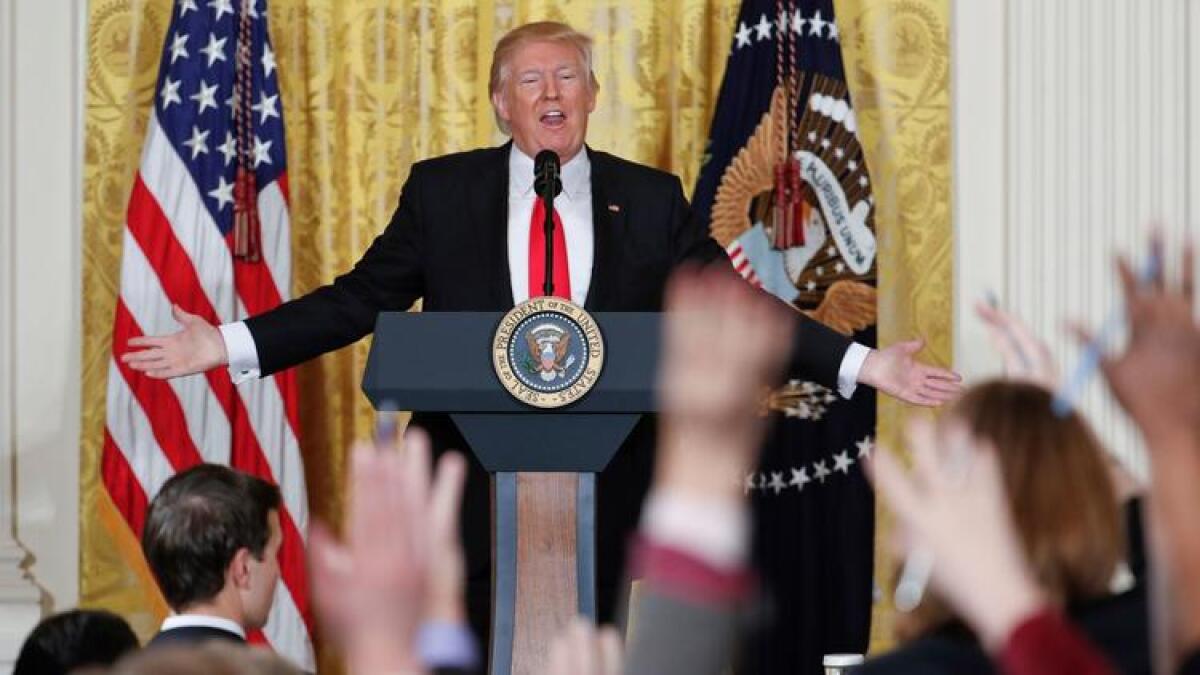
President Trump is pointing fingers at President Obama.
From insisting he inherited a “mess,” to blaming lingering Obama administration officials for government leaks, Trump is not hesitant to cast blame on the former president.
“To be honest, I inherited a mess. It’s a mess. At home and abroad,” Trump said during his 77-minute, freewheeling press conference on Thursday.
Trump’s been in the White House four weeks, yet he still appears intent on harping on the past – and he has some help.
Here are some of today’s headlines in the conservative media:
WHODUNIT? Trump launches bid to find leakers, as speculation surrounds Obama officials (Fox News)
Leaks. Leaks. And more leaks.
Trump insists that former Obama administration officials are behind the leaks that reveal his aides and associates made repeated contact with senior Russian officials during the 2016 campaign.
But who?
This piece cites unnamed intelligence officials who suspect the leaks could be spearheaded by, among others, former CIA Director John Brennan and former Director of National Intelligence James Clapper. Both men served in the Obama administration.
Comparing Donald Trump and Barack Obama’s first press conferences (Daily Caller)
The press conferences were stark contrasts.
Trump’s was much more wide-ranging than Obama’s on Feb. 9, 2009.
Among the specific differences: Trump spent a lot of time bashing the media; Obama was bashing Congress.
“Obama pushed his $800 billion in economic stimulus on Americans and accused Republicans of ‘playing politics,’ the Caller notes, quoting the president: “I can’t afford to see Congress play the usual political games.”
Both blamed their predecessors for the problems they had to deal with, the piece notes. While Trump said he inherited “a mess, at home and abroad, a mess,” Obama also claimed to be facing a big mop-up operation.
“My administration inherited a deficit of over $1 trillion, [and we also]...inherited the most profound economic emergency since the Great Depression,” he said.
That’s entertainment! Trump’s 75-minute tour de force (American Spectator)
People on both sides of the aisle agree: Trump’s press conferences are entertaining, and the right side of the aisle thinks they’re especially fun.
“Donald Trump, giving press conferences as president, is like a cross between Fidel Castro’s long-windedness and machismo and Christopher Walken’s theatrical presence — and nobody else in the room can compete with that,” writes Scott McKay. “It was a freewheeling, wide-open, raucous barroom brawl of a presser, with Trump taking on every questioner with swagger and New York moxie.”
- Share via
Here’s what a 1951 college football game can tell us about voter attitudes toward President Trump
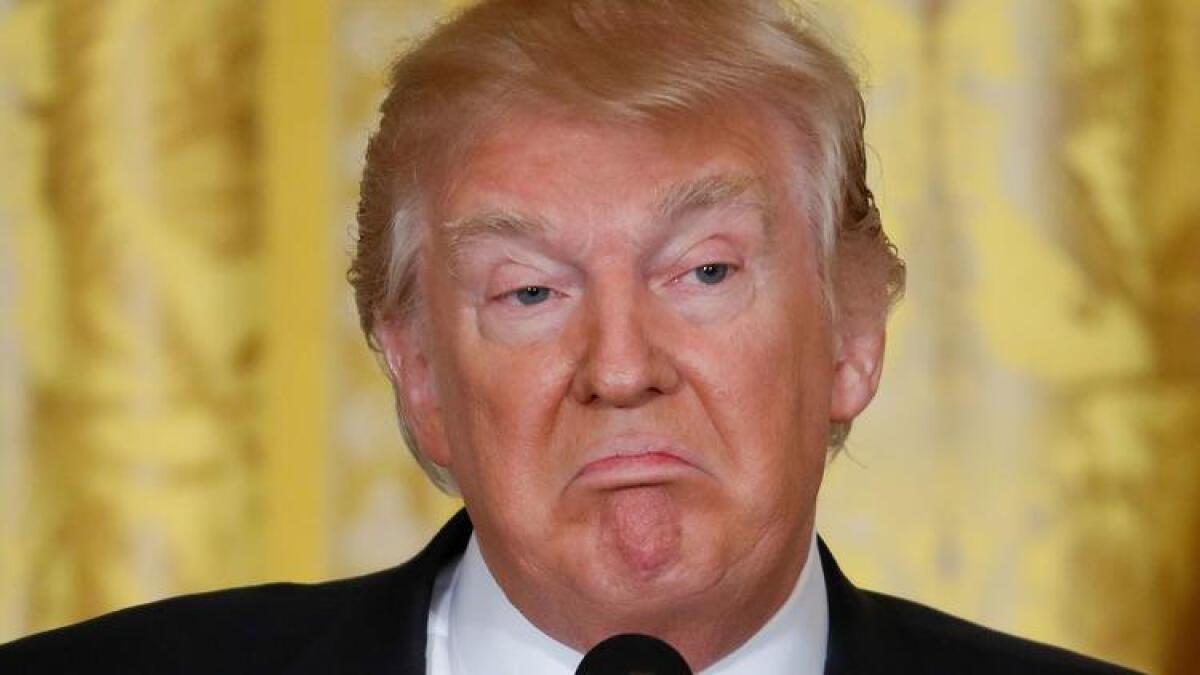
In November 1951, the Dartmouth and Princeton football teams played a season-ending game that resulted in a seminal work on the nature of human cognition.
Princeton won the contest, to finish the season undefeated. Of more lasting consequence, though, was the research that followed — a psychological case study that provides a helpful overlay for today’s politics.
The game was exceedingly violent, with broken bones and a flurry of penalty flags. Subsequent news accounts stoked the controversy, with fans from each side blaming the other for the mayhem.
Intrigued, a pair of researchers undertook an experiment in which students at the Ivy League colleges filled out questionnaires gauging their reactions to the game. The students were shown film clips of the action and asked to mark instances hey considered “mild” or “flagrant” violations of the rules.
The result was that Princeton students saw the Dartmouth team commit twice as many infractions as Dartmouth students professed to see.
Even though students watched the exact same clips, perceptions were vastly different based on their rooting interest.
- Share via
White House denies report that Trump is considering mobilizing the National Guard for immigration enforcement
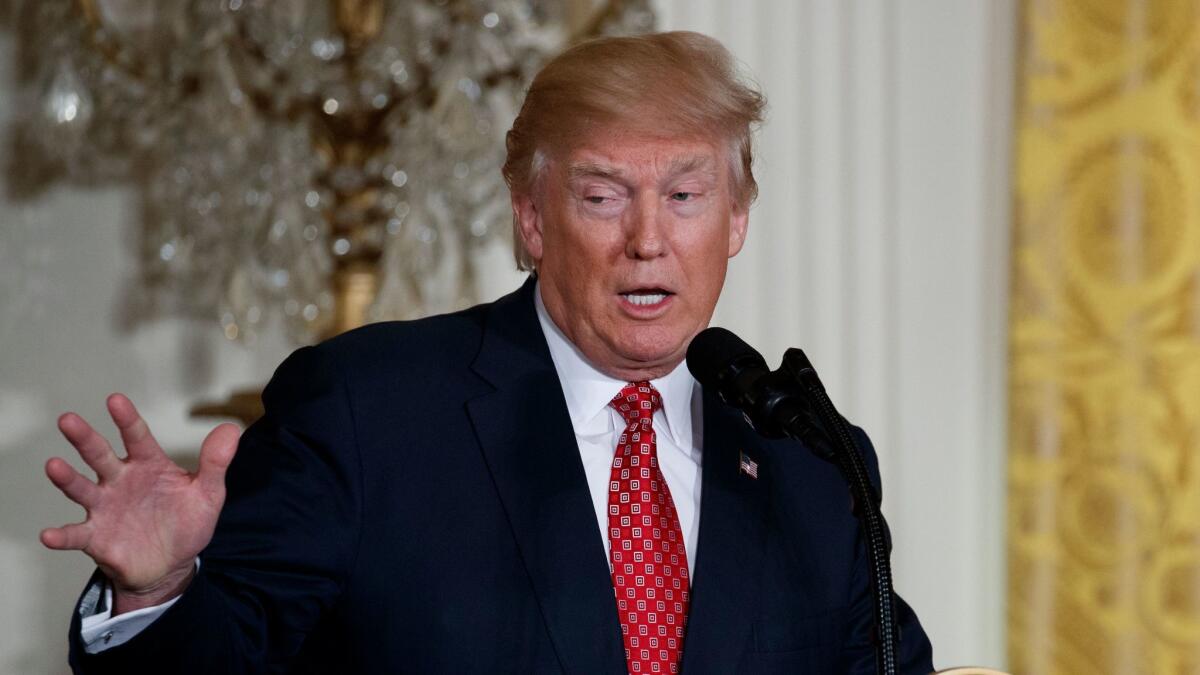
The White House flatly denied an Associated Press report Friday that as many as 100,000 National Guard troops could be mobilized to make immigration arrests.
An 11-page memo obtained by the news wire calls for the potential deployment in 11 states, including California and others that border Mexico, as part of a plan to implement President Trump’s Jan. 25 executive order directing federal agencies to “employ all lawful means to enforce the immigration laws of the United States.”
White House Press Secretary Sean Spicer dismissed the report to reporters on Air Force One, as the president was preparing to travel to South Carolina.
“That is 100% not true. It is false. It is irresponsible to be saying this,” he said. “There is no effort at all to round up, to utilize the National Guard to round up illegal immigrants.”
The draft memo was written by Homeland Security Secretary John Kelly, the AP reported, and would give governors of those states the choice of whether to deploy their National Guard troops in the initiative.
In the Trump administration’s first months, such drafts outlining potential administration actions have often become public. In some cases the leaked information largely reflected executive actions the president ultimately signed, but in others were not — or at least not yet — steps the administration took.
Immigration and Customs Enforcement officials told members of Congress on Thursday that while the agency could round up 11-million people under the president’s order, they “did not have the resources,” Rep. Michelle Lujan Grisham (D-N.M.), chairwoman of the Congressional Hispanic Caucus, said afterward.
“That’s pretty chilling,” she said.
Times staff writer Lisa Mascaro contributed to this report.
8:54 a.m.: This story was updated with more comment from Spicer and comment from a congresswoman.
- Share via
Trump weighs mobilizing 100,000 National Guard troops for immigration roundups
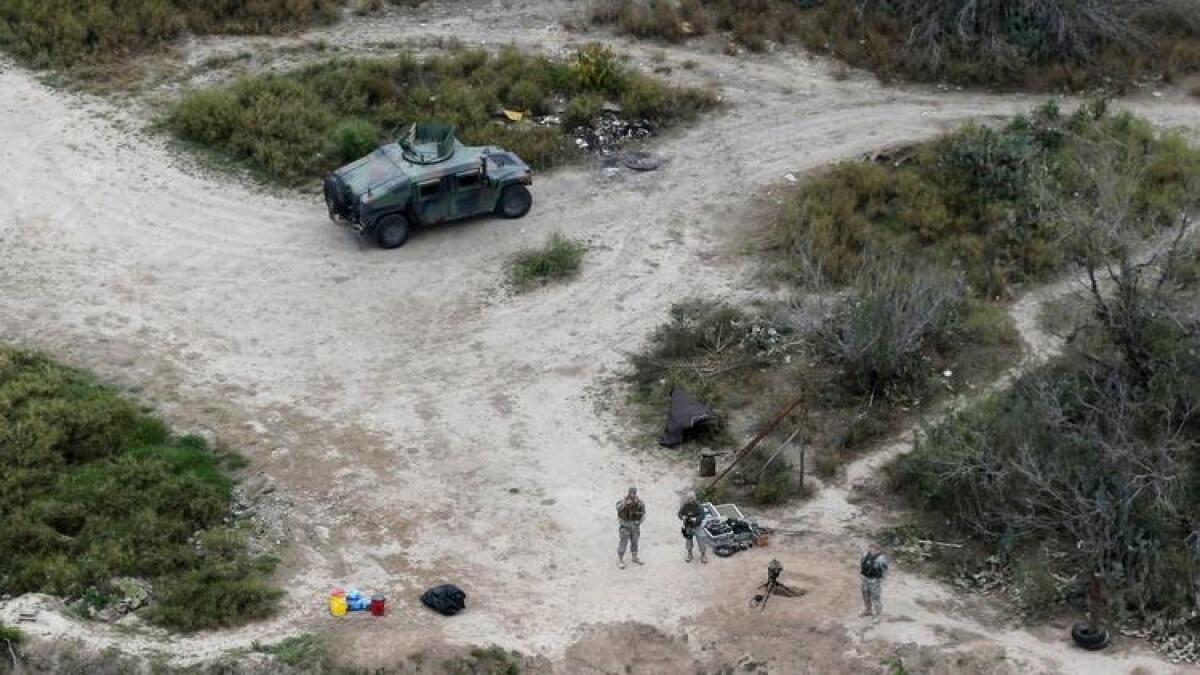
A draft memo obtained by the Associated Press outlines a Trump administration proposal under consideration to mobilize as many as 100,000 National Guard troops to round up immigrants in the U.S. illegally. Millions of those who would be affected in 11 states live nowhere near the Mexico border.
The 11-page document calls for the unprecedented militarization of immigration enforcement as far north as Portland, Ore., and as far east as New Orleans. If the proposal is implemented, governors in the affected states would have final approval on whether troops under their control participate.
- Share via
Travel ban, ‘very fake news,’ Cabinet picks: Here’s the transcript from President Trump’s news conference
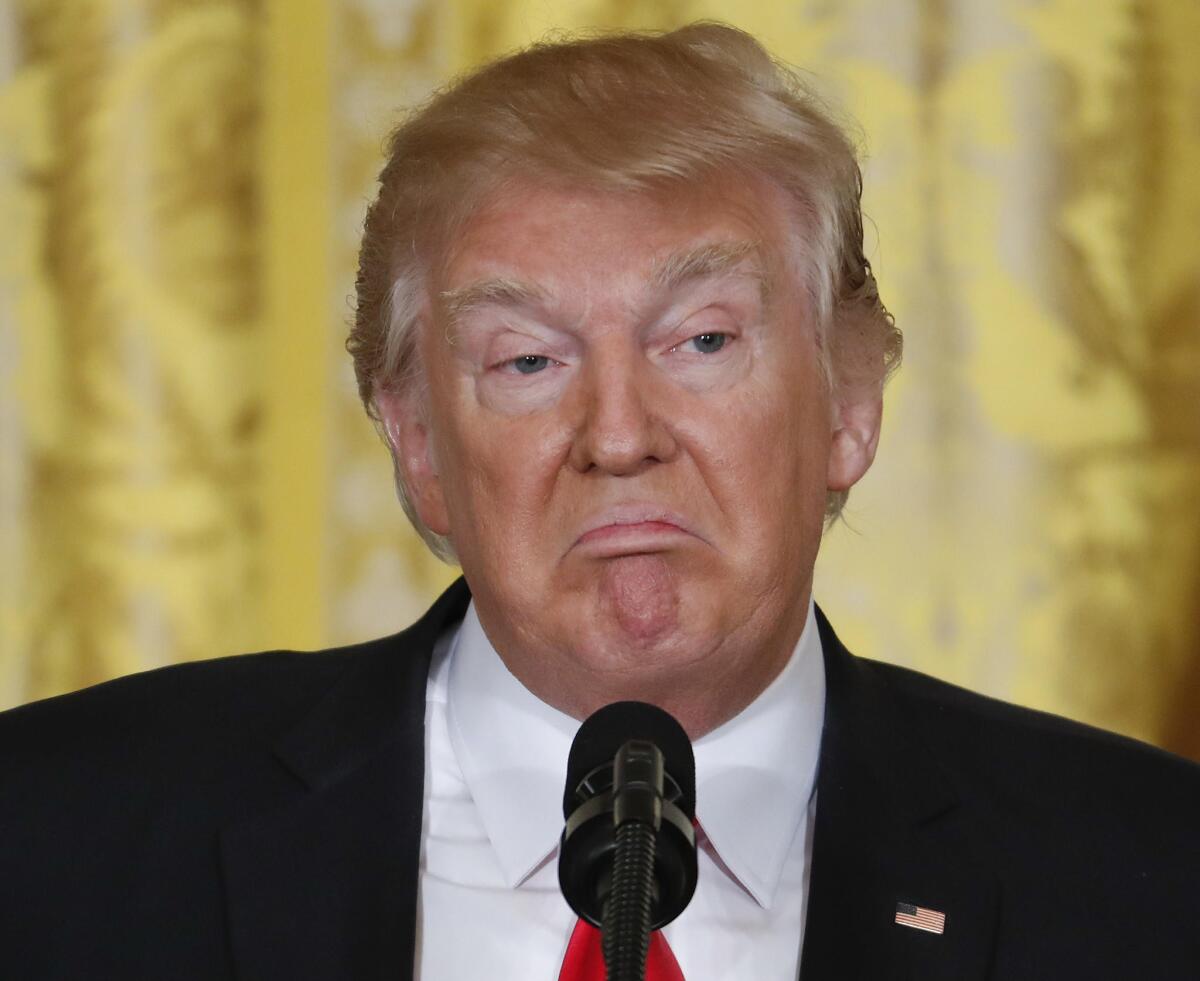
President Trump appeared Thursday at a news conference to announce his replacement choice for Labor secretary. Trump went on to address a wide range of topics, including Russia, his plans for a new executive order on a travel ban, “fake news,” leaks, his electoral victory, his wife, Melania, and daughter Ivanka, and more.
Here is a transcript of those remarks, as prepared by CQ/Roll Call:
- Share via
Moments from Trump’s news conference that stood out
On his 28th day in office, President Trump held his first solo news conference. It lasted about 90 minutes and left viewers with a number of moments that were, well, out of the norm for presidential briefings. But, of course, those norms were set before Trump was elected president. The appearance proved a return to his freewheeling style on the campaign trail.
Here are some of the moments that stand out when it comes to topic or delivery:
“I guess it was the biggest electoral college win since Ronald Reagan.”
Trump won the election. He is, after all, president. Still, months after the results were final, he still routinely brings up and misstates the size of his win in the electoral college. In this exchange, a reporter points out that former President Obama won more electoral votes than Trump (Obama had 332 in 2012; Trump had 302). Oh, and George H.W. Bush had 426 electoral votes when he beat Michael Dukakis in 1988.
- Share via
Appeals court says it is suspending further action on Trump travel ban
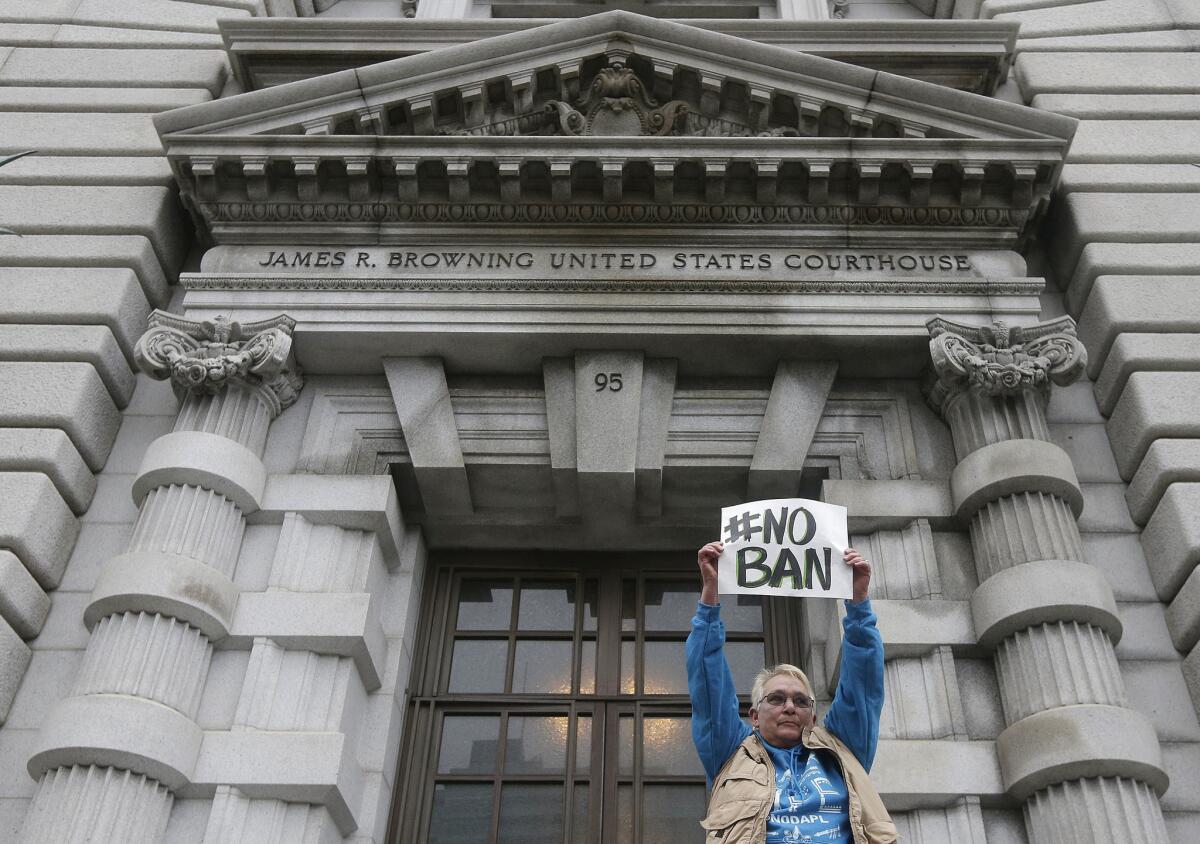
A federal appeals court decided late Thursday to take no further action on President Trump’s travel ban while the administration prepares new, more limited restrictions designed to address legal objections.
In a brief order, the U.S. 9th Circuit Court of Appeals said a vote on whether to reconsider the court’s Feb. 9 decision to continue blocking the ban would not be held pending further action from the Trump administration.
Trump announced Thursday that his administration would not appeal the earlier decision. Instead, he said his administration planned to unveil a new executive order designed to limit the ability of people who might be associated with terrorism to enter the United States.
The ban blocked by the 9th Circuit prevented citizens from seven predominantly Muslim countries from entering the U.S. for three months, leading to the cancelation of at least 60,000 visas.
A federal judge in Seattle earlier this month issued a temporary restraining order nationwide against enforcement of the ban in response to a suit brought by the states of Washington and Minnesota. The government appealed to the 9th Circuit.
A three-judge panel of two Democratic appointees and one appointed by a Republican unanimously agreed that the ban was likely to violate constitutional guarantees of due process.
Following that decision, an unidentified 9th Circuit judge asked that an 11-judge panel be convened to review the ruling.
But in an order late Thursday, the court said that in light of the upcoming new executive order, it would pause its proceedings “pending further order of this court.”
- Share via
Vice admiral turns down national security job
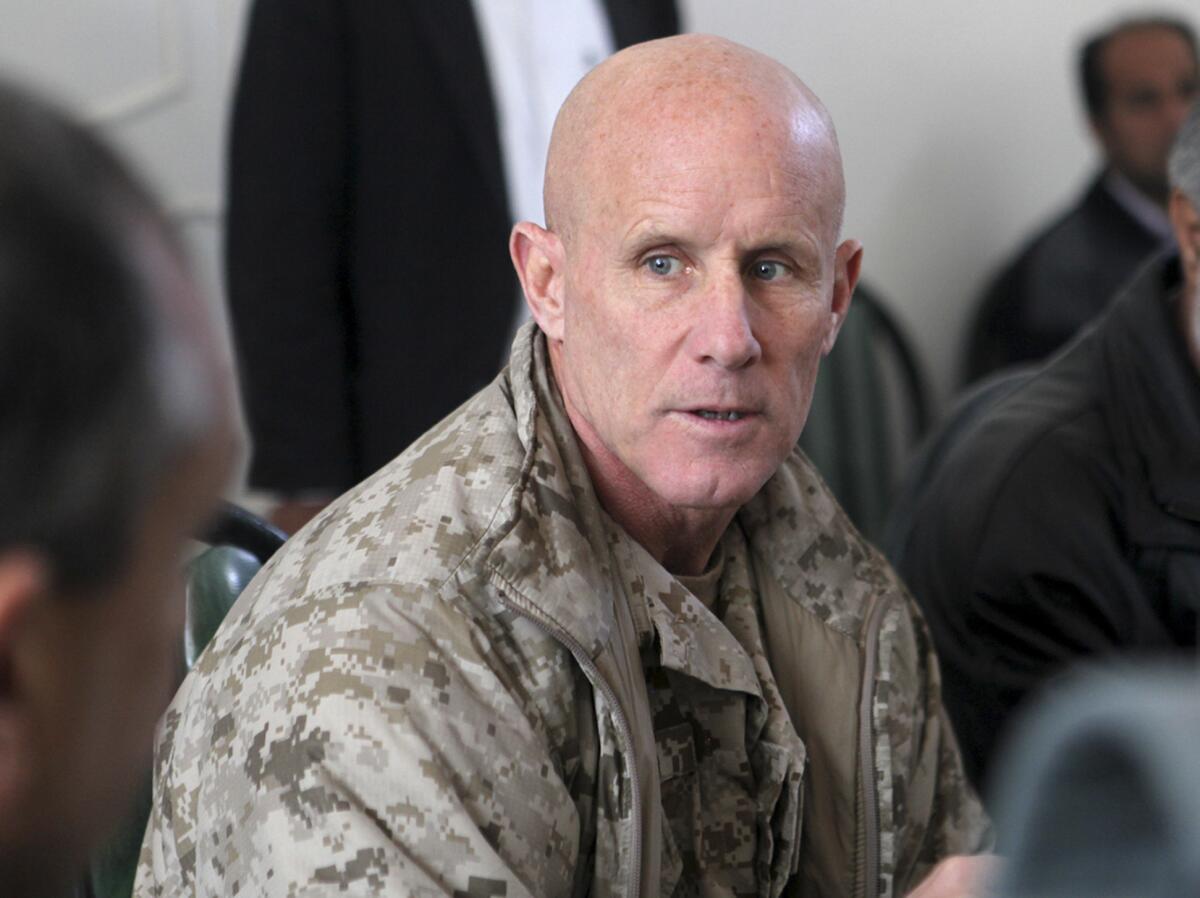
Navy Vice Adm. Robert Harward has turned down an offer to be President Trump’s new national security advisor.
A senior White House official said that Harward turned down the offer because of financial and family commitments.
The official spoke anonymously because Harward’s decision had not been publicly announced.
Harward would have replaced retired Gen. Michael Flynn, who resigned at Trump’s request Monday after revelations that he misled Vice President Mike Pence about discussions he held with a Russian diplomat.
Officials said this week that there were two other contenders: acting national security advisor Keith Kellogg and retired Gen. David H. Petraeus.
- Share via
Trump’s silence on a documented rise in episodes of anti-Semitism is ‘mind-boggling,’ group says
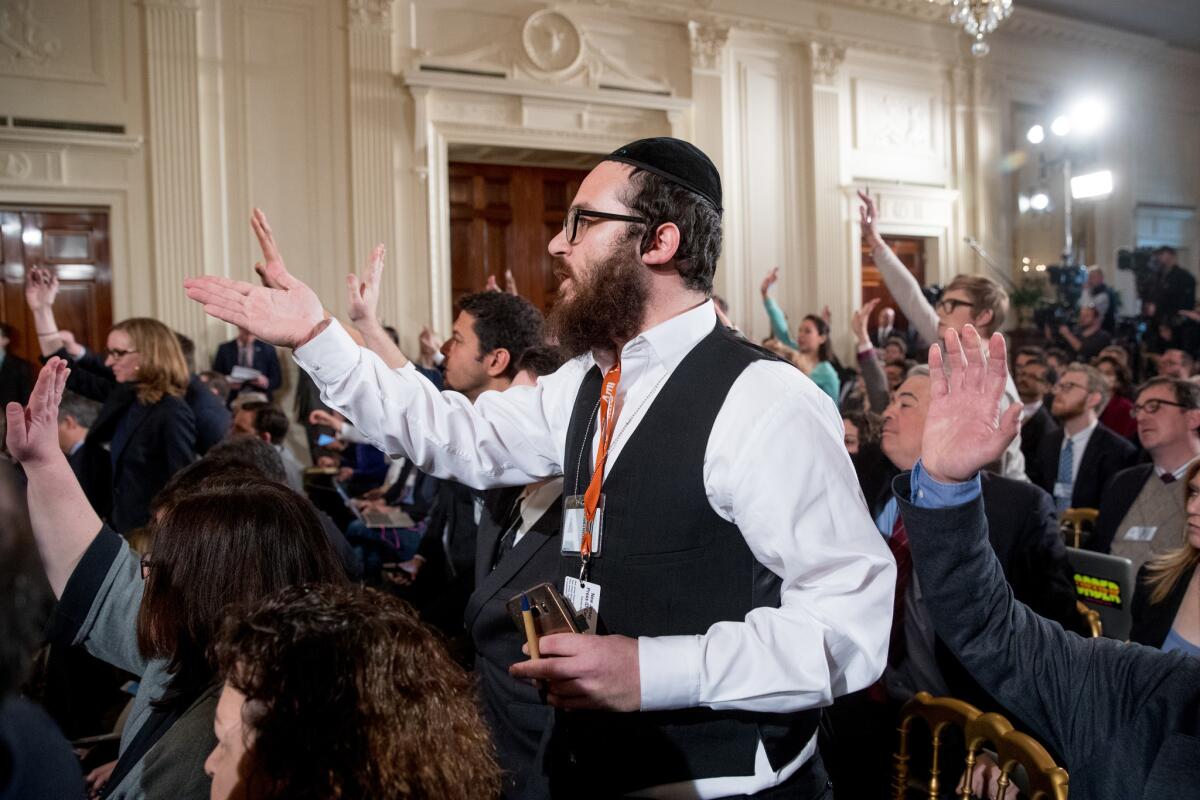
For a second straight day, President Trump refused to directly address questions Thursday about a documented rise in anti-Semitic episodes in the United States, prompting renewed concern from prominent Jewish groups.
A day earlier, he sidestepped a query from an Israeli reporter on the issue by touting his margin of victory in the electoral college and his Jewish grandchildren. On Thursday, the president labeled a reporter’s attempt to revisit the issue as “insulting.”
“Here’s the story, folks. Number one, I am the least anti-Semitic person that you’ve ever seen in your entire life,” he said at a news conference. “Number two, racism, the least racist person.”
Trump then ordered the reporter, Jake Turx of Ami Magazine, to “sit down.”
When a second reporter tried to press Trump on the issue, the president claimed, without evidence, that any anti-Semitic behavior was the work of his political opponents.
“It won’t be my people. It will be the people on the other side to anger people like you,” he said.
The Anti-Defamation League has monitored a surge in racist and anti-Semitic graffiti and vandalism since Trump’s election, including the use of Nazi imagery. Forty-eight Jewish Community Centers reported bomb threats in January, according to CNN.
“It is mind-boggling why President Trump prefers to shout down a reporter or brush this off as a political distraction,” ADL National Chairman Marvin Nathan and CEO Jonathan Greenblatt said in a statement. “This is not a partisan issue. It’s a potentially lethal problem — and it’s growing.”
“Trump may claim to love the Jewish people, but his actions demonstrate callous indifference to anti-Semitism at best and outright advancement at worst,” said Stosh Cotler, CEO of Bend the Arc Jewish Action, a liberal group.
- Share via
U.S. ambassador to U.N. offers yet another version of Mideast policy
Adding further confusion to President Trump’s emerging Middle East policy, the U.S. envoy to the United Nations said Thursday that United States “absolutely” supports creation of a Palestinian state.
“We absolutely support a two-state solution,” Ambassador Nikki Haley said at U.N. headquarters in New York. “That’s never wavered.”
Her comments came a day after Trump said he could “live with” either a one-state or a two-state solution for the Israeli-Palestinian conflict, effectively the core of U.S. policy in the region.
The two-state solution has been the goal of both Republican and Democratic administrations, as well as the U.N. and the European Union, for at least two decades. It envisions an Israeli nation and a Palestinian nation living side by side.
Despite Trump’s willingness to abandon the policy, Haley argued that the U.S. position remained firm.
“Anybody who wants to say the United States doesn’t support a two-state solution — that would be an error,” she said.
She said the administration is trying to “think outside the box” to bring the two sides together and restart long-stalled negotiations.
Haley also attacked what she called “outrageous” anti-Israel bias at the U.N.
She said the Security Council ignores attacks on Israelis and shows favoritism to Palestinians, obscuring other pressing issues like Iran’s support of terrorist groups.
“I’m here to say the United States will not turn a blind eye to this anymore,” she said.
- Share via
White House has found ways to end protection for Dreamers while shielding Trump from blowback
While President Trump wavered Thursday on whether he will stop shielding from deportation people who were brought to the U.S. illegally as children, his aides have identified at least two ways to quietly end their protections without his fingerprints.
An executive order has already been drafted to end the program, Deferred Action for Childhood Arrivals, that allows hundreds of thousands of the immigrants to live and work openly in the U.S. Trump used that legal mechanism to great fanfare to expand deportation authority and restrict entry to the U.S.
But with the president showing less willingness to sign such an order, advisors have begun to explore alternatives.
Senior Trump aides have examined at least two options that would not directly involve Trump, according to two immigration policy advisors to the White House: a lawsuit brought by states, and new legal guidance that details who is a priority for deportation.
“DACA is a very, very difficult subject for me,” Trump conceded during a rambling East Room news conference Thursday, promising to address the issue “with heart. … It’s one of the most difficult subjects I have because you have these incredible kids.”
- Share via
Public deeply polarized and already dug in on Trump
Less than a month into President Trump’s tenure, an overwhelming share of Americans already have strongly held views about his job performance and positions are deeply polarized.
Trump’s core supporters continue to strongly back the new president, a survey from the nonpartisan Pew Research Center finds. His opponents -- a larger group -- fervently disapprove of him.
Those polarized views help explain why Trump’s attacks on the media and repeated mentions of his defeated Democratic opponent – he mentioned “Hillary” 12 times during his news conference today – may make sense as a strategy. While his approach may not change the minds of people who dislike him, it could help rally his existing supporters.
The Pew survey found that three-quarters of Americans either strongly approve or strongly disapprove of Trump. That’s a much higher number than had strongly held views of other presidents at this stage of their terms in office.
Overall, the survey, which was conducted last Tuesday through Sunday, found that 56% of Americans disapproved of Trump’s performance in office and 39% approved.
That marked the first major poll in which Trump’s approval dropped below 40%, but it’s only slightly lower than several other recent polls.
The finding does, however, differ a lot from the poll by Rasmussen, a Republican favorite, which Trump cited in his news conference. That survey found 55% of Americans approving of Trump’s performance in office.
One major difference between the surveys is that Rasmussen, alone among recent major surveys, reported numbers only from people it considered “likely voters” -- a hard group to define this far away from an election and one that can easily be skewed.
In the Pew survey, almost half of Americans, 46%, strongly disapproved of Trump’s work so far, while three in 10 strongly approved.
That level of strong disapproval is unprecedented for this early in a president’s tenure. Indeed, President Obama never generated that high a level of strong disapproval in his eight years. President George W. Bush did so only in his last month in office, Pew’s surveys found.
Trump’s most controversial action so far -- his proposed temporary ban on travel from seven mostly Muslim countries -- also drew sharply polarized reactions.
Overall, the division of opinion on the travel order was almost the same as division on his job performance overall.
But views on how the administration had executed the order were more negative. Only 28% said they believed the administration had done a good job of rolling out the order, while 17% said the administration had done only a fair job and 53% said they had done a poor job.
The Pew poll surveyed 1,503 adult Americans nationwide by telephone, including cellphones and land lines. It has a margin of error for the full sample of 2.9 percentage points in either direction.
- Share via
Here’s the transcript of Trump’s repeated evasions on whether his campaign had contacts with Russian officials

When asked if Putin was testing Trump, he said he did not believe so.
In his news conference, reporters repeatedly pressed President Trump on the question of whether anyone from his campaign had contacts with Russia intelligence officials, and he repeatedly avoided answering.
Trump was asked the question five times and eventually said that “nobody I know of” had such contacts.
Here are the relevant excerpts from the transcript of the news conference provided by CQ Roll Call. Some words in the questions were not audible for the transcription:
QUESTION: During your campaign, did anyone from your team [have contacts with the] Russian government or Russian intelligence? And if so, what was the nature of those conversations?
TRUMP: The failing New York Times wrote a big, long front-page story yesterday. And it was very much discredited, as you know. It was -- it’s a joke. And the people mentioned in the story, I notice they were on television today saying they never even spoke to Russia. They weren’t even a part, really -- I mean, they were such a minor part. They -- I hadn’t spoken to them.
I think the one person -- I don’t think I’ve ever spoken to him. I don’t think I’ve ever met him. And he actually said he was a very low-level member of I think a committee for a short period of time. I don’t think I ever met him. Now, it’s possible that I walked into a room and he was sitting there, but I don’t think I ever met him. I didn’t talk to him ever. And he thought it was a joke.
The other person said he never spoke to Russia; never received a call. Look at his phone records, et cetera, et cetera. And the other person, people knew that he represented various countries, but I don’t think he represented Russia, but knew that he represented various countries. That’s what he does. I mean, people know that.
That’s Mr. Manafort, who’s -- by the way, who’s by the way a respected man. He’s a respected man. But I think he represented the Ukraine or Ukraine government or somebody, but everybody -- people knew that. Everybody knew that.
So, these people -- and he said that he has absolutely nothing to do and never has with Russia. And he said that very forcefully. I saw his statement. He said it very forcefully. Most of the papers don’t print it because that’s not good for their stories.
So the three people that they talked about all totally deny it. And I can tell you, speaking for myself, I own nothing in Russia. I have no loans in Russia. I don’t have any deals in Russia. President Putin called me up very nicely to congratulate me on the win of the election.
He then, called me up extremely nicely to congratulate me on the inauguration, which was terrific. But so did many other leaders, almost all other leaders from almost all of the country. So that’s the extent.
Russia is fake news. Russia -- this is fake news put out by the media.
[Several minutes later]
QUESTION: I just want to get you to clarify this very important point. Can you say definitively that nobody on your campaign had any contacts with the Russians during the campaign? And on the leaks, is it fake news or are these real leaks?
TRUMP: Well the leaks are real. You’re the one that wrote about them and reported them, I mean the leaks are real. You know what they said, you saw it and the leaks are absolutely real. The news is fake because so much of the news is fake. So one thing that I felt it was very important to do -- and I hope we can correct it. Because there’s nobody I have more respect for -- well, maybe a little bit but the reporters, good reporters.
[after a lengthy answer, the reporter repeats the question about contacts between his campaign and Russia}
TRUMP: Well, I had nothing to do with it. I have nothing to do with Russia. I told you, I have no deals there, I have no anything.
[several minutes later]
QUESTION: Thank you. I was just hoping that we could get a yes or no answer on one of these questions involving Russia. Can you say whether you are aware that anyone who advised your campaign had contacts with Russia during the course of the election?
TRUMP: Well I told you, Gen. Flynn obviously was dealing. So that’s one person. But he was dealing, as he should have been.
QUESTION: During the election?
TRUMP: No. Nobody that I know of. Nobody...
QUESTION: So you’re not aware of any contact during the course...
TRUMP: Look, look, look...
QUESTION: ... of the election?
TRUMP: How many times do I have to answer this question?
QUESTION: Can you just say yes or no?
TRUMP: Russia is a ruse.
I know you have to get up and ask a question. It’s so important. Russia is a ruse. I have nothing to do with Russia. Haven’t made a phone call to Russia in years. Don’t speak to people from Russia. Not that I wouldn’t. I just have nobody to speak to.
I spoke to Putin twice. He called me on the election. I told you this. And he called me on the inauguration, a few days ago. We had a very good talk, especially the second one, lasted for a pretty long period of time. I’m sure you probably get it because it was classified. So I’m sure everybody in this room perhaps has it. But we had a very, very good talk.
I have nothing to do with Russia. To the best of my knowledge no person that I deal with does.
Now, Manafort has totally denied it. He denied it. Now people knew that he was a consultant over in that part of the world for a while, but not for Russia. I think he represented Ukraine or people having to do with Ukraine, or people that -- whoever. But people knew that. Everybody knew that.
QUESTION: But in his capacity as your campaign manager, was he in touch with Russian officials during the election?
TRUMP: You know what? He said no. I could only tell you what he -- now he was replaced long before the election. You know that, right? He was replaced long before the election. When all of this stuff started coming out, it came out during the election. But Paul Manafort, who’s a good man also by the way, Paul Manfort was replaced long before the election took place. He was only there for a short period of time.
- Share via
Trump says he’ll repeal travel ban, replace it with a new one next week that’s ‘tailored’ to court decisions
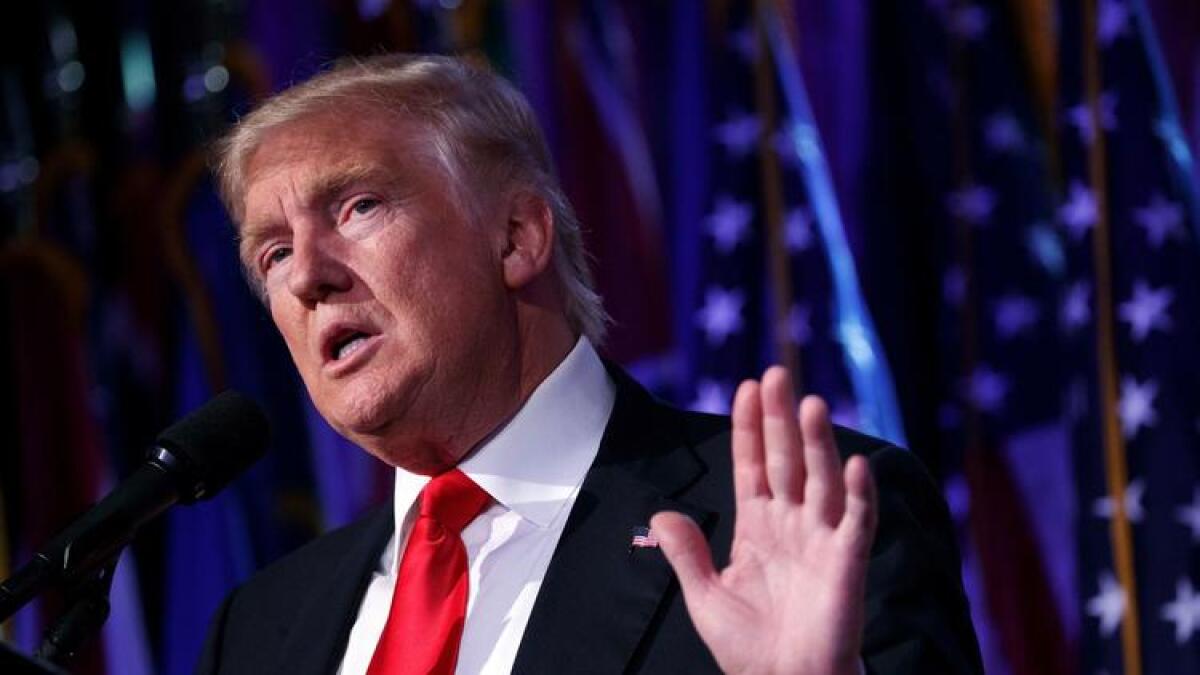
President Trump announced Thursday that his administration will be releasing a new, narrower executive order on travel to replace one that’s been shot down by multiple federal courts.
The order temporarily suspended travel from seven mostly Muslim countries and halted refugee admissions but is not in effect after court defeats.
Trump did not clarify details of the new order, saying only that it would be “tailored” to the “bad” courts that described the original order as overreaching, suggesting it would be narrower in its focus.
In a brief filed to the 9th Circuit Court of Appeals on Thursday, the Department of Justice argued that the court was wrong in its move to not reinstate the travel ban earlier this month. But government lawyers said they did not seek a reconsideration of the decision because a revamped executive order is in the works.
That new order would supersede the old one, lawyers wrote.
Government lawyers said the appeals court should vacate its prior decision when the new executive order is issued.
Still, Trump defended the original order when speaking to reporters on Thursday.
“We had a very smooth rollout... but we had a bad court,” Trump said. He said the new order will be “very much tailored to what I consider to be a very bad [court] decision.”
- Share via
Trump skirts Russia issue in a freewheeling news conference: ‘I’m not ranting and raving’

Donald Trump makes a premonition that the press will say he was ranting and raving.
President Trump said Thursday that “nobody that I know of” from his campaign contacted Russian agents or government officials before his election.
His denial was perhaps the most notable development in a a lengthy news conference in which he berated the press and complained that he had “inherited a mess.”
Trump also defended his ousted national security advisor, Michael Flynn, saying that Flynn acted appropriately in discussing sanctions with Russia during the transition period. He said Flynn was asked to resign only because he misled Vice President Mike Pence about those discussions.
“I fired him because of what he said to Mike Pence — very simple,” Trump said.
He said, “It certainly would have been OK with me” if Flynn discussed sanctions with Russian Ambassador Sergey Kislyak when President Obama was still in office.
“I didn’t direct him, but I would have directed him if he didn’t do it,” Trump said.
Flynn’s discussion of sanctions while another administration was still setting U.S. policy was seen as inappropriate, and possibly illegal.
Trump also promised to issue a new version of his travel ban next week, and he vowed it would withstand court scrutiny.
He complained that his many accomplishments were not being recognized while insisting that his much-criticized early weeks in office were going smoothly. He even said his travel ban worked without a hitch, despite numerous problems at airports around the country.
Trump hedged when several reporters asked him to definitively state whether anyone in his campaign had contacted Russians before the election, saying repeatedly that he himself had no involvement with the Russian government. He also said that political controversy would make it hard to cut a wide-ranging deal with Russian President Vladimir Putin, but that he was nonetheless committed to trying.
The news conference was a return to Trump’s more spontaneous public side that characterized his campaign. He sparred with the press, bragged about the size of his election victory, boasted of his television ratings and continued to take shots at Hillary Clinton.
“I won with news conferences,” he said, as if explaining why he chose to hold the impromptu news conference.
Trump, while relentlessly bemoaning what he said was unfair coverage, nonetheless insisted that he was having a good time.
“Tomorrow, they will say, ‘Donald Trump rants and raves about the press,’” he said. “I’m not ranting and raving.”
- Share via
Trump pick for ambassador to Israel has tough Senate hearing
President Trump’s nominee for U.S. ambassador to Israel, David Friedman, faced hecklers and tough questions Thursday in his Senate confirmation hearing.
Friedman, an attorney who worked for Trump and who has expressed hard-line, pro-Israel positions, sought to distance himself from his more inflammatory comments.
“I cannot justify these hurtful words, which I deeply regret,” Friedman testified.
Friedman has called President Obama, other Democratic leaders and critics of Israeli actions anti-Semitic. He likened liberal American Jews to Holocaust-era Kapos, Jews who worked for the Nazis in concentration camps.
He is a financial backer of expanding Jewish settlements in the West Bank, land claimed by the Palestinians.
He also has dismissed as unworkable the proposed two-state solution to the Israeli-Palestinian conflict.
The diplomatic strategy, which envisions an Israeli nation and a Palestinian nation existing side by side, has been the cornerstone of U.S. policy since the Clinton administration, although Trump said Wednesday that he is willing to abandon it if Israel and the Palestinians can produce a better plan.
Testifying to the Senate Foreign Relations Committee, Friedman said he would be “delighted” to see Israeli and Palestinian states coexist west of the Jordan River but questioned whether that was feasible.
Democrats questioned whether Friedman could conduct diplomacy given his strong opinions and brash approach.
“I’m having difficulty understanding whether you really can be a diplomat,” said Sen. Ben Cardin of Maryland, the ranking Democrat on the committee.
Sen. Tom Udall (D-N.M.) called on the Trump administration to withdraw Friedman’s nomination.
Friedman said he was qualified for the job because of his deep knowledge of Israeli history, born of a life of study and 50 visits there. He also cited his close friendship with Trump and his fluency in the Hebrew language.
Seconds after beginning his opening statement, Friedman was interrupted by a pro-Palestinian demonstrator who waved a Palestinian flag and shouted, “We aren’t going away!”
Five other outbursts, both from pro-Palestinian and American Jewish protesters, including one man in a kippa, followed.
- Share via
Trump announces Labor secretary pick, Alexander Acosta, who would be only Latino in Cabinet
President Trump said Thursday that he will nominate former Justice Department official R. Alexander Acosta as Labor secretary after his first pick, fast-food executive Andy Puzder, withdrew.
If confirmed, Acosta would be the only Latino in Trump’s Cabinet.
“He’ll be a tremendous secretary of Labor,” Trump said at a news conference in the East Room of the Whiite House, noting that Acosta was previously confirmed by the Senate three times.
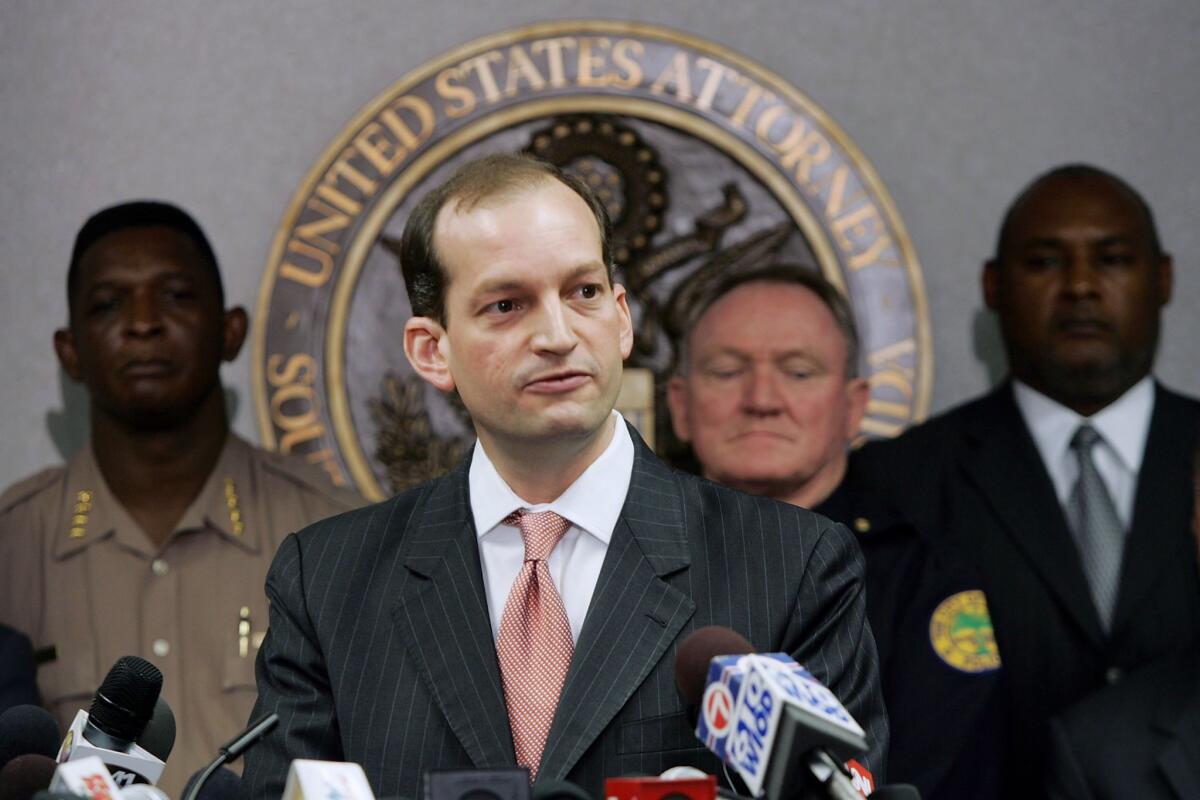
Acosta was assistant attorney general for the Justice Department’s Civil Rights Division under former President George W. Bush and also has served as U.S. attorney for the Southern District of Florida and as a member of the National Labor Relations Board.
Since 2009, Acosta has been dean of the law school at Florida International University in Miami.
Puzder, chief executive of Carpinteria-based CKE Restaurants Inc., parent company of Carl’s Jr and Hardee’s, withdrew the day before his Senate confirmation hearing after several Republicans opposed him because of a series of controversies, including admitting he had for years employed a housekeeper in the U.S. illegally and decades-old allegations of spousal abuse.
10 a.m.: This story was updated with comment from Trump.
- Share via
Trump is showing a reluctance to take responsibility for White House chaos
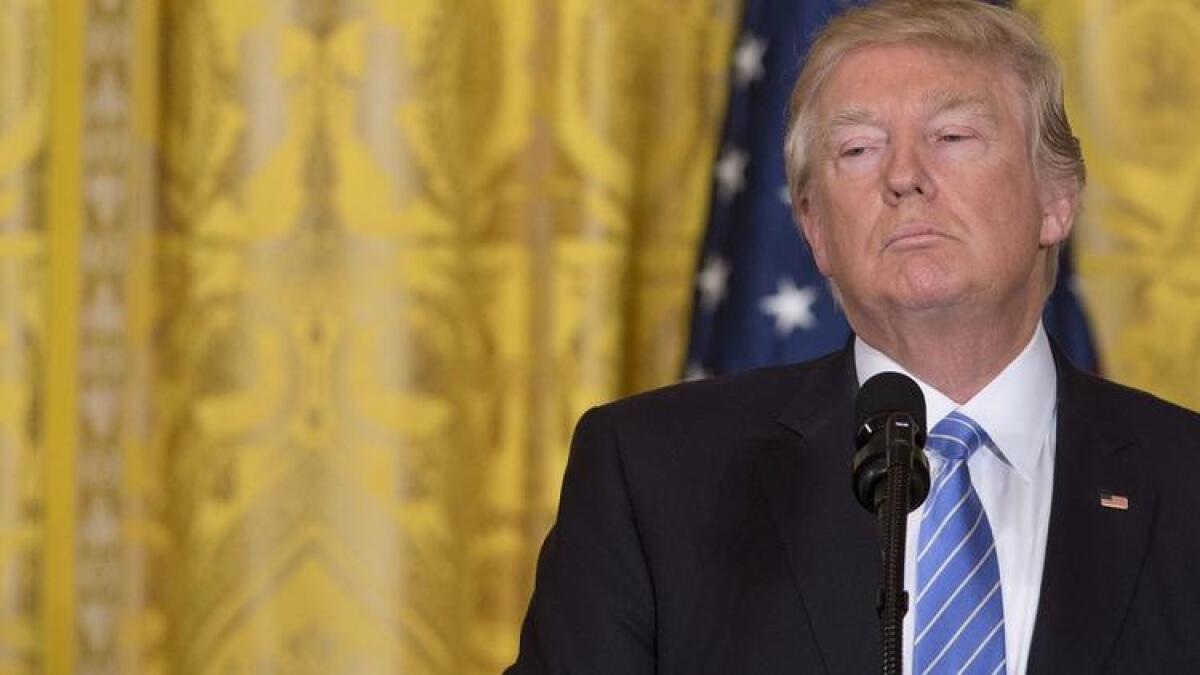
Asked for the first time publicly to address the dismissal of Michael Flynn, his national security advisor, President Trump was clear Wednesday in his frustration.
But the president’s target was not Flynn, a retired Army lieutenant general, nor his conduct
“Gen. Flynn is a wonderful man,” Trump said. “I think he’s been treated very, very unfairly by the media — as I call it, the fake media — in many cases.”
Trump’s answer — in which he also blamed intelligence officials for “illegally” leaking information that prompted Flynn’s ouster — marked the most prominent example to date of his reluctance to publicly shoulder the responsibility for missteps at the White House.
- Share via
While Congress struggles to replace Obamacare, the Trump administration is moving to reshape health insurance on its own
With congressional Republicans struggling to develop an Obamacare alternative, the Trump administration is taking steps on its own to loosen government regulation of the nation’s health insurance markets, a longtime conservative goal.
Administration officials said the moves — which were detailed in proposed regulations released Wednesday — are necessary to stabilize Obamacare marketplaces that have been shaken over the last year by rising premiums and insurer exits.
But the Trump administration’s moves to relax rules on insurers appear likely to shift additional medical costs to patients by promoting higher-deductible health plans.
The proposed regulations also set the stage for potential reductions in government aid to low- and moderate-income consumers, another policy favored by GOP leaders, including Trump’s new Health and Human Services secretary, Tom Price, a fierce advocate for reduced federal healthcare spending.
The moves drew criticism from many consumer and patient advocates worried that the Trump administration is undermining key protections established by the Affordable Care Act.
- Share via
House riles California with vote to block state retirement law to help low-income workers
Over the protest of California’s governor and Senate leader, the Republican-controlled U.S. House of Representatives voted to block the state from moving forward with its novel plan to provide a path toward retirement security for nearly 7 million low-income Californians.
The move was viewed by leaders in California and several other states as an incursion on states’ rights by a Republican Congress they accuse of setting its federalist principles aside to scuttle a program that is creating anxiety among Wall Street investment houses.
The House vote took aim at new laws in California and several other states that would require private employers that do not currently offer retirement savings programs to set up accounts for their workers, through which a small share of their earnings would be set aside in an IRA-type account. Private firms would invest the money, much like they do in 529 college savings accounts that many states have established. Workers could choose not to participate, and employers would not have to contribute any money to the accounts.
“Republicans have decided Wall Street’s profits are more important than workers’ retirement savings,” House Minority Leader Nancy Pelosi said in a floor speech, where she noted the state plans are enthusiastically endorsed by AARP as an effective tool to help keep seniors out of poverty.
Gov. Jerry Brown wrote a letter to lawmakers in Congress imploring them not to vote against the plans, as did state Senate leader Kevin de Leon, who crusaded for years to pass the 2016 legislation authorizing the new retirement program.
But the House voted Wednesday to rescind an Obama administration regulation that cleared the path for states to start launching their programs later this year.
House Majority Leader Kevin McCarthy said in a letter to de Leon that he was concerned the Obama regulation would not give people who currently do not have access to retirement plans at work enough protections once enrolled in the state programs. He also expressed doubts about the trustworthiness of states to oversee such programs.
“Repealing this regulation is completely in line with our mutual respect for federalism,” McCarthy wrote, “and nothing in Congress’ action will block state innovation.”
But during the floor debate, Democrats said opponents of the programs were not looking out for workers, but Wall Street.
”There’s a reason why some business organizations like the [U.S.] Chamber and other financial groups are worried about this,” said Rep. Earl Blumenauer (D-Oregon). “This is a low-cost, high-impact, transparent program.... I think they’re afraid of the model.”
The resolution next goes to the Senate.
- Share via
Andy Puzder, Trump’s pick for Labor secretary, drops out
The troubled nomination of Southern California executive Andy Puzder to become President Trump’s Labor secretary collapsed Wednesday amid growing Republican opposition.
Puzder, chief executive of Carpinteria-based CKE Restaurants Inc., the parent company of the Carl’s Jr. and Hardee’s chains, abruptly withdrew his nomination just a day before he was to face his Senate confirmation hearing.
“After careful consideration and discussions with my family, I am withdrawing my nomination for secretary of Labor,” Puzder said in a statement emailed by his spokesman. “I am honored to have been considered by President Donald Trump to lead the Department of Labor and put America’s workers and businesses back on a path to sustainable prosperity.”
“While I won’t be serving in the administration, I fully support the President and his highly qualified team,” Puzder said.
- Share via
Puzder’s nomination as Labor secretary appears in deep trouble amid increasing Republican opposition
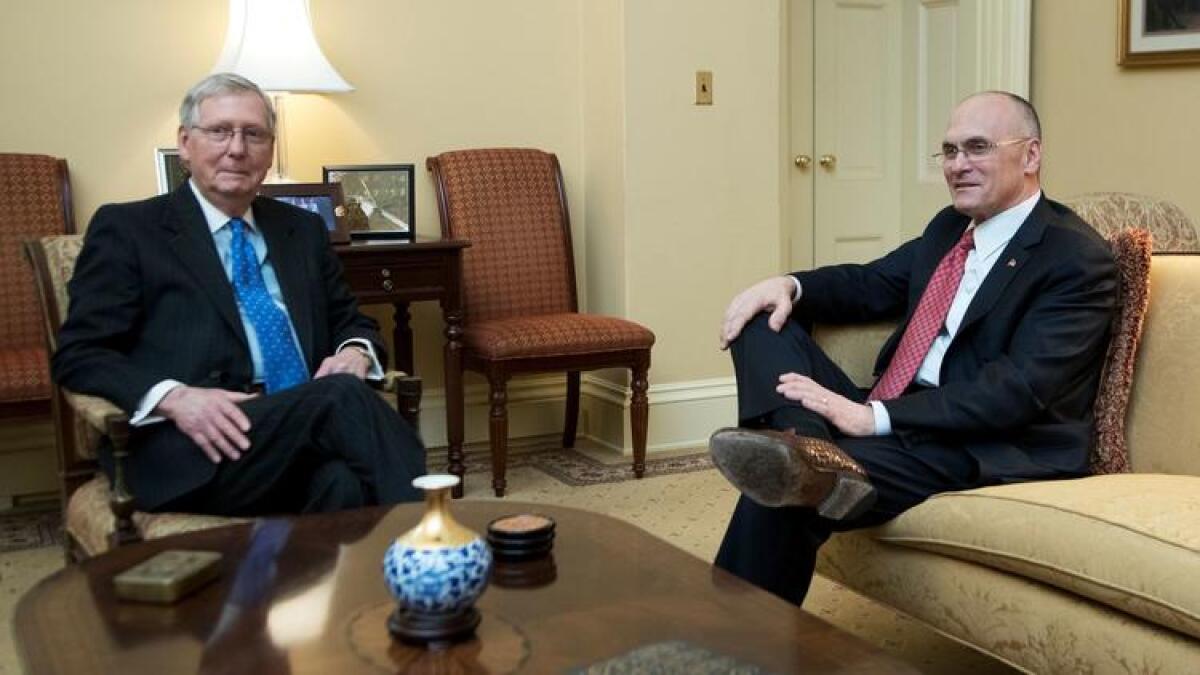
Andy Puzder’s nomination as Labor secretary appeared to be in deep trouble Wednesday amid increasing Republican opposition in the wake of a series of controversies.
At least four Republican senators would oppose the Southern California fast-food executive’s confirmation, CNN reported. That would be enough to sink the nomination because of apparent unanimous Democratic opposition.
With as many as 12 potential no votes among GOP members, top Senate Republicans urged the White House to withdraw the nomination.
After the resignation of National Security Advisor Michael Flynn this week, President Trump and White House officials might not want to use their political capital to save Puzder’s nomination.
Puzder, the chief executive of Carpinteria-based CKE Restaurants Inc., the parent company of the Carl’s Jr. and Hardee’s chains, is scheduled for a confirmation hearing on Thursday.
Senate Majority Leader Mitch McConnell (R-Ky.) reiterated Tuesday he was a “strong supporter” of Puzder.
On Wednesday, Sen. John Cornyn (R-Texas), a member of the GOP leadership, said he expected Puzder’s hearing before the Senate Health, Education, Labor and Pensions Committee to take place as scheduled.
“Nothing’s changed,” he said.
Since then, however, GOP concerns about the nomination appear to have grown -- or at least become more public. The concerns have been mounting as new controversies have arisen in recent days, including Puzder’s admission that he had employed a housekeeper for years who was in the U.S. illegally.
Puzder paid back taxes related to that employee after Trump picked him for Labor secretary in early December.
Some Republicans also have viewed a 1990 episode of “The Oprah Winfrey Show” in which Puzder’s ex-wife, Lisa Fierstein, made allegations of spousal abuse, according to Politico.
Fierstein wrote to the leaders of the Senate Health, Education, Labor and Pensions Committee last month saying she had later withdrawn the allegations and vouching for Puzder as a “a good, loving, kind man.”
But Sen. Susan Collins (R-Maine) said she had viewed the Oprah episode and told reporters Tuesday she had not made up her mind on Puzder’s nomination.
“There have been issues that have been raised about him, and I’m sure that all of them will be thoroughly addressed in the hearing,” Collins said.
Asked about Puzder on Wednesday, Collins said, “I’ve expressed my concerns.”
Sens. Lisa Murkowski (R-Alaska), Tim Scott (R-S.C.), Johnny Isakson (R-Ga.) and John Thune (R-S.D.) also said this week that they were awaiting the confirmation hearing before making a decision. Sen. Rob Portman of Ohio also expressed concerns.
“I think it’s important that before we come to any conclusions or make any judgments that we have an opportunity to hear from him at his confirmation hearing respond to some of the questions that have been raised,” Thune said Tuesday.
The issues involving his housekeeper and ex-wife came on top of controversial comments Puzder has made in recent years opposing an increase in the minimum wage to $15 and musing about deploying increased automation to his restaurants.
Democrats also have highlighted labor law violations at CKE Restaurants, and fast-food workers have staged protests against Puzder’s nomination in Los Angeles and elsewhere.
On Thursday, Senate Minority Leader Charles E. Schumer (D-N.Y.) called for Puzder to withdraw, calling him “probably the most anti-worker” choice ever for the Cabinet position.
- Share via
Trump in first summit with Israeli Prime Minister Benjamin Netanyahu
President Trump and Israeli Prime Minister Benjamin Netanyahu both declined to commit to the internationally accepted recipe of a two-state solution to the Israeli-Palestinian conflict Wednesday, a diplomatic shift for both governments that could signal a realignment of the traditional peace process.
At a joint news conference ahead of their first White House summit, Trump said he would support whatever solution the Israelis and Palestinians wanted.
“I’m looking at two states and one state, and I like the one both parties like,” Trump said. “I can live with either one.”
Netanyahu dodged the question.
For years, the United States and most of its allies advocated the vision of two states, one Israeli and one Palestinian, living side by side as the basis for lasting peace in the region.
Trump now has backed away from that commitment, raising questions about how officials would draw up a peace plan.
Trump did criticize, albeit mildly, Israel’s rapid expansion of housing settlements in the occupied West Bank, land claimed by the Palestinians.
Asked about the settlements, Trump turned to Netanyahu, standing at a lectern beside him, and said, “I’d like to see you hold back on settlements a little bit.”
Netanyahu looked surprised and countered that settlements could be discussed as part of a final peace deal, but he added they were “not the core of the conflict.”
Trump also was asked about his campaign pledge to relocate the U.S. embassy from Tel Aviv to Jerusalem, a move considered provocative because both Israel and the Palestinians claim the city as their capital.
Trump said he was thinking about it “very carefully” but would not commit to a move date.
Trump and Netanyahu seemed on the same page on other topics.
Both were critical of the landmark deal, negotiated by six world powers and Iran in 2015, that eased sanctions on Tehran in exchange for destroying or freezing Iran’s nuclear development programs. But Trump did not repeat his campaign promise to “rip up” the deal.
Netanyahu strongly defended Trump when asked about the xenophobic and anti-Semitic sentiments unleashed by some of his supporters during the presidential race last year.
“There is no greater friend of Israel,” Netanyahu said of Trump, then singled out Trump’s son-in-law, Jared Kushner, as a lifelong family friend.
Kushner, a 36-year-old observant Jew with no formal diplomatic experience, has been tapped by Trump to lead negotiations with Israel and the Palestinians.
Both Trump and Netanyahu said they were finding that several Arab countries now see Iran and radical Islam as enemies worth joining forces to fight, instead of seeing Israel as the primary enemy.
In contrast to the often-chilly joint appearances that Netanyahu had with President Obama, the Israeli leader’s arrival on the south steps of the White House was full of smiles, kisses and warm handshakes shared by the two leaders and their wives.
“Our alliance has always been strong, but under your leadership, it will be even stronger,” Netanyahu said.